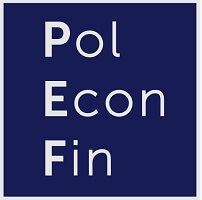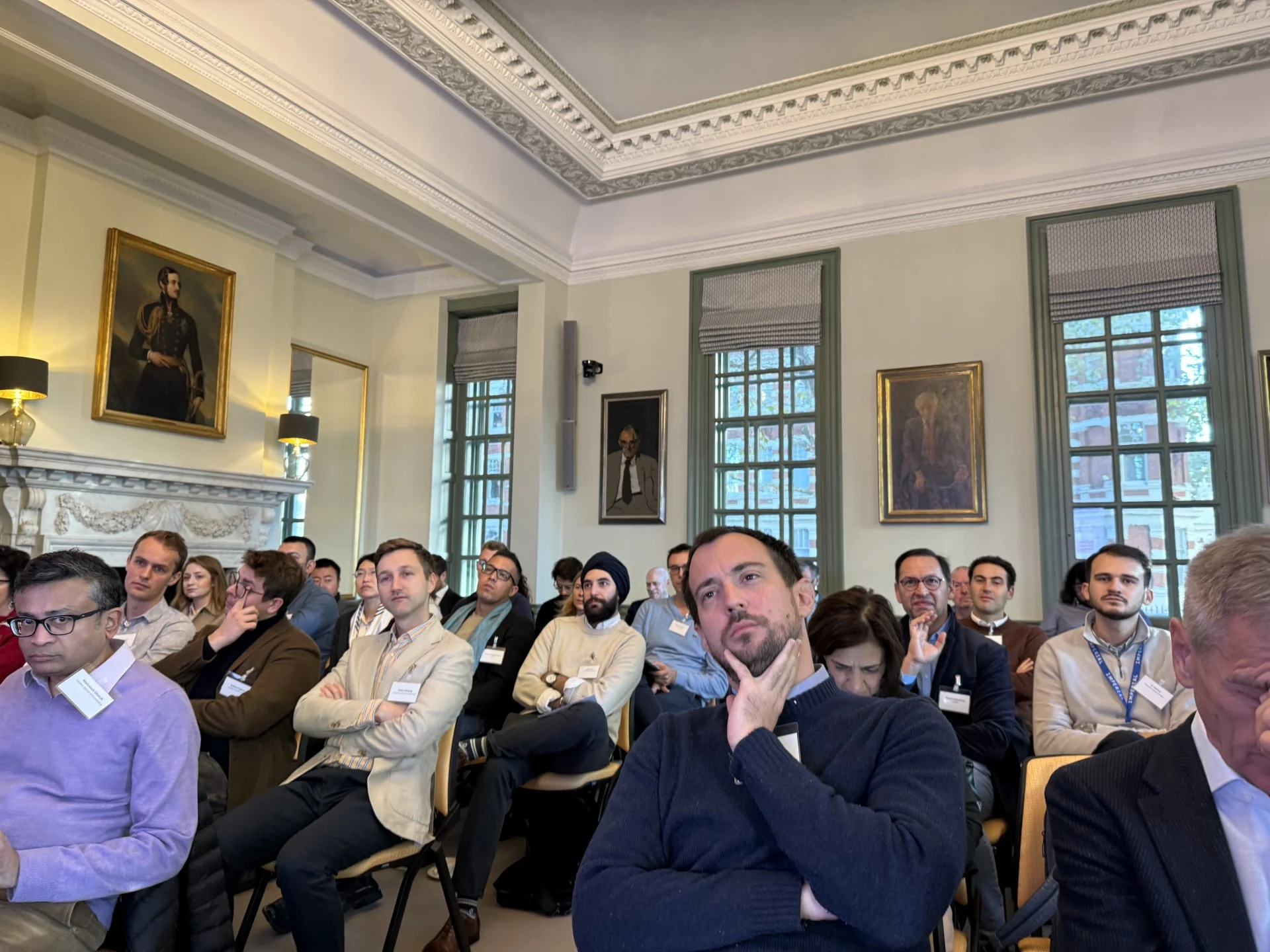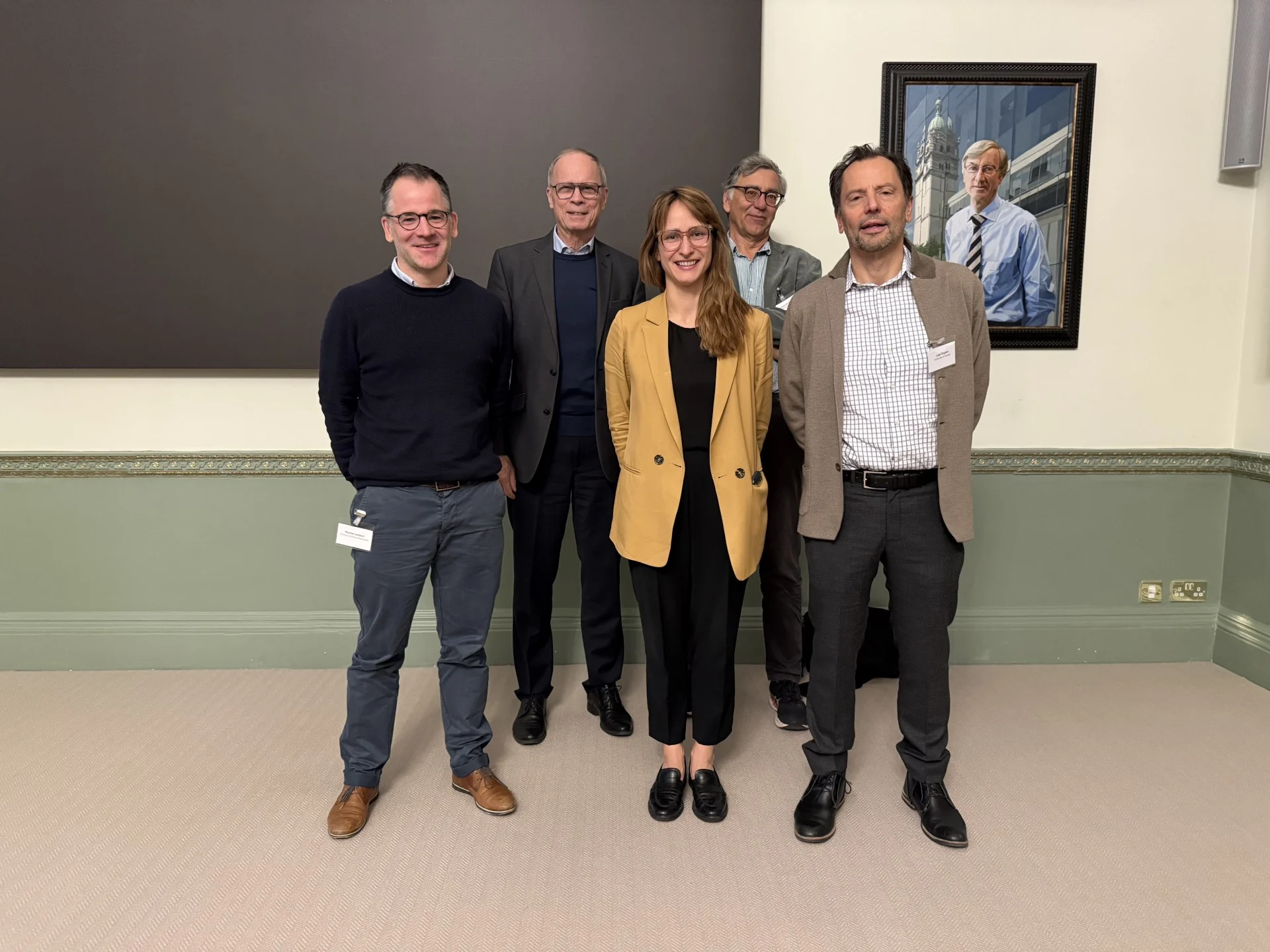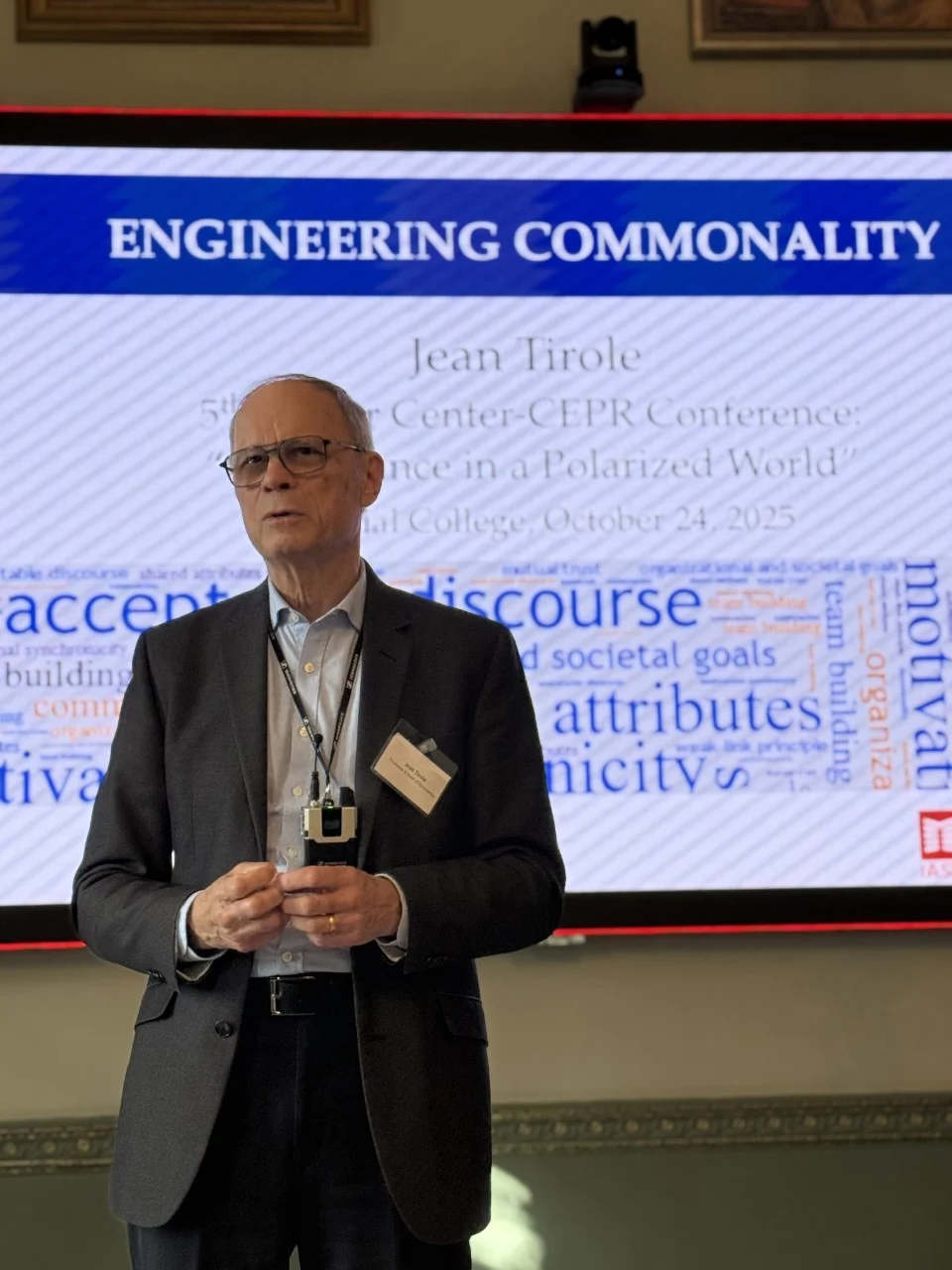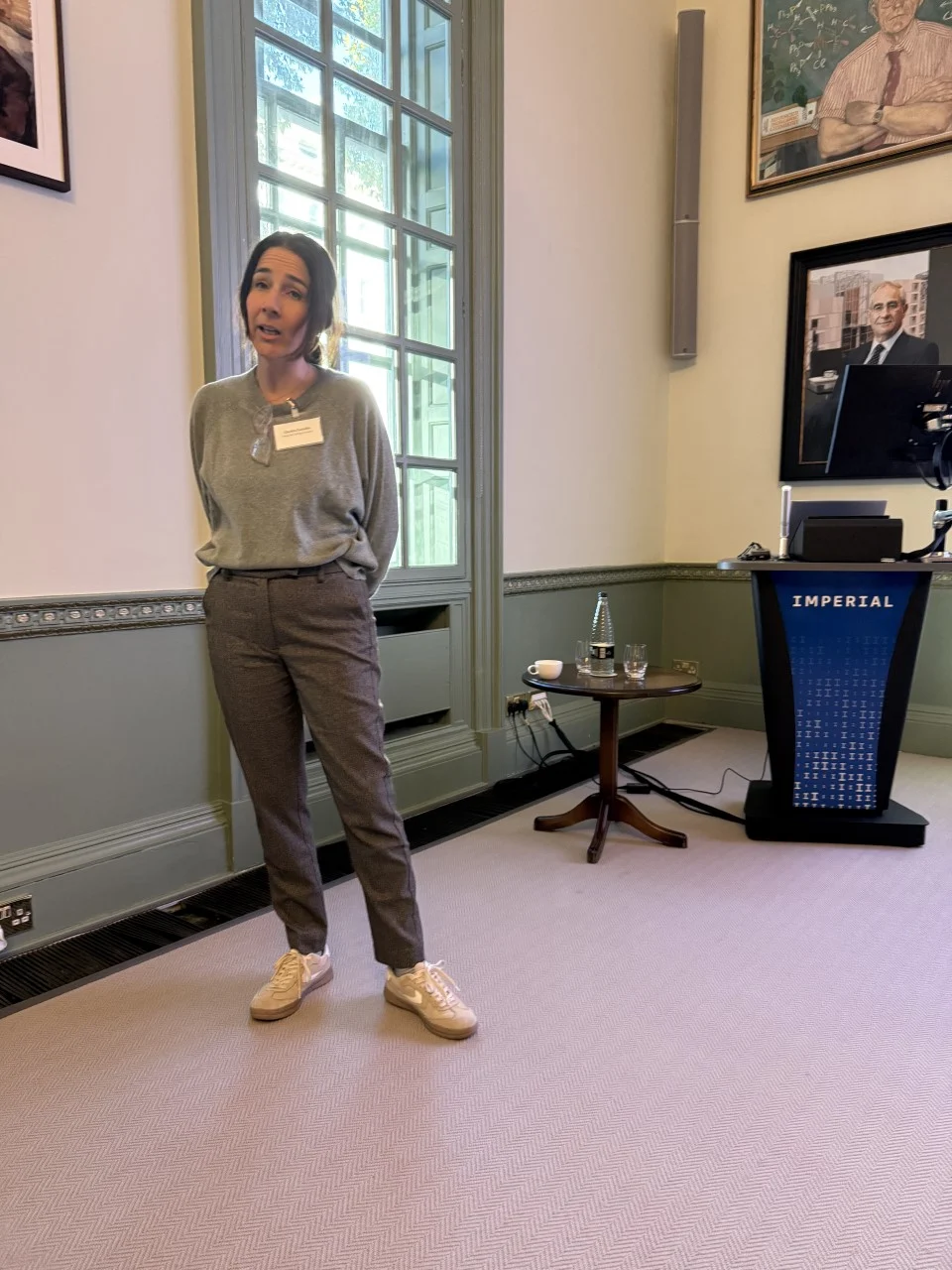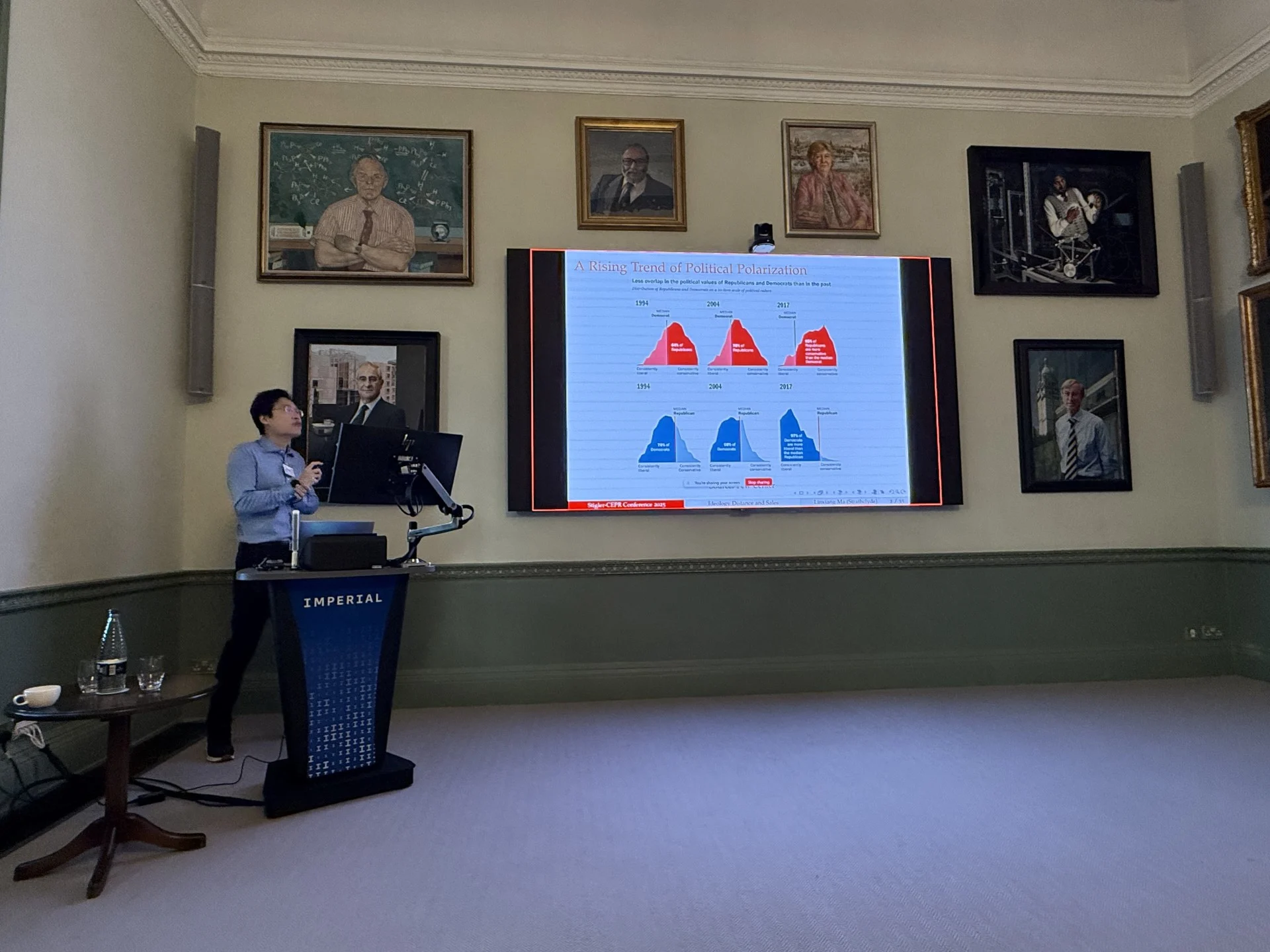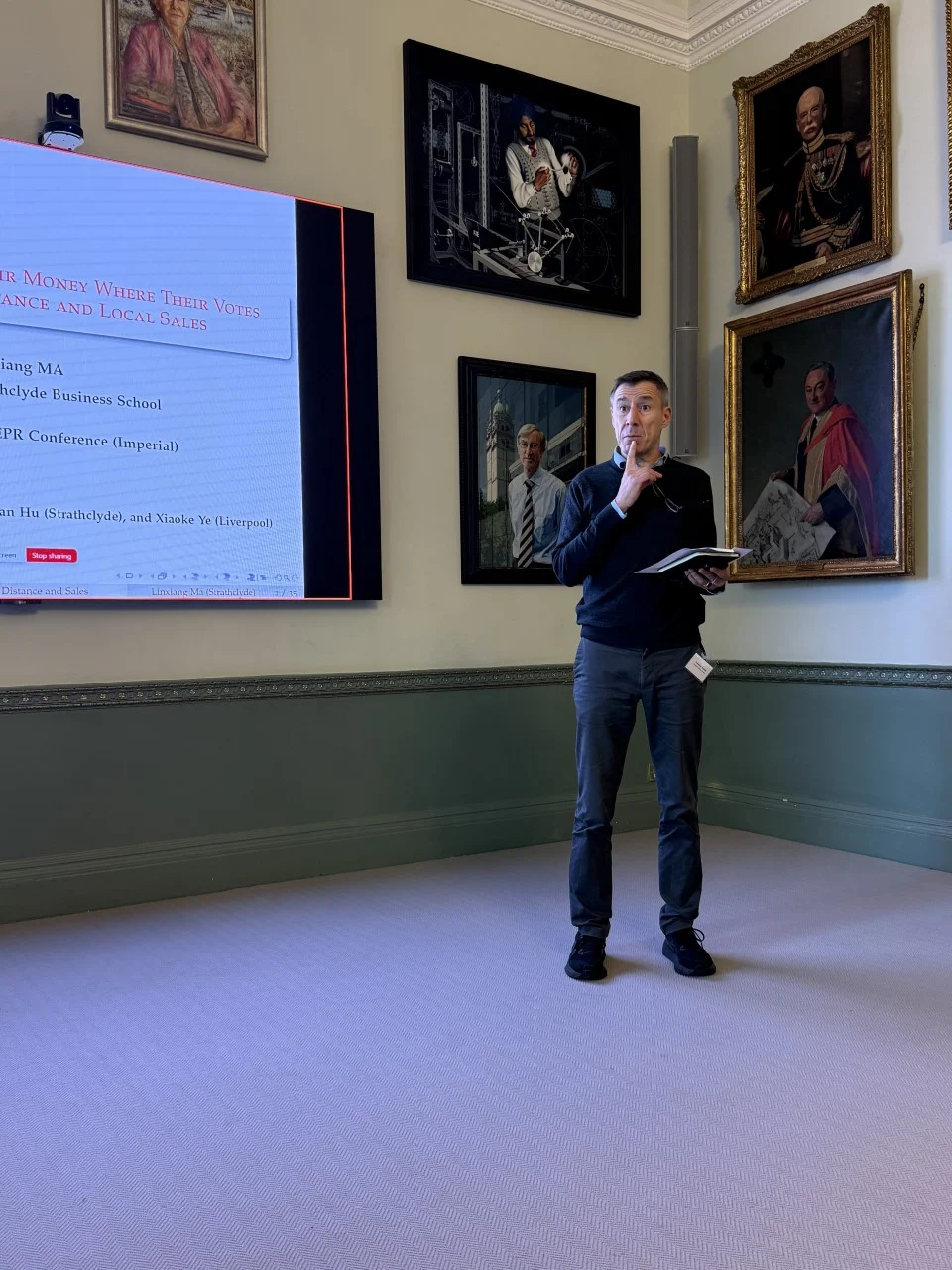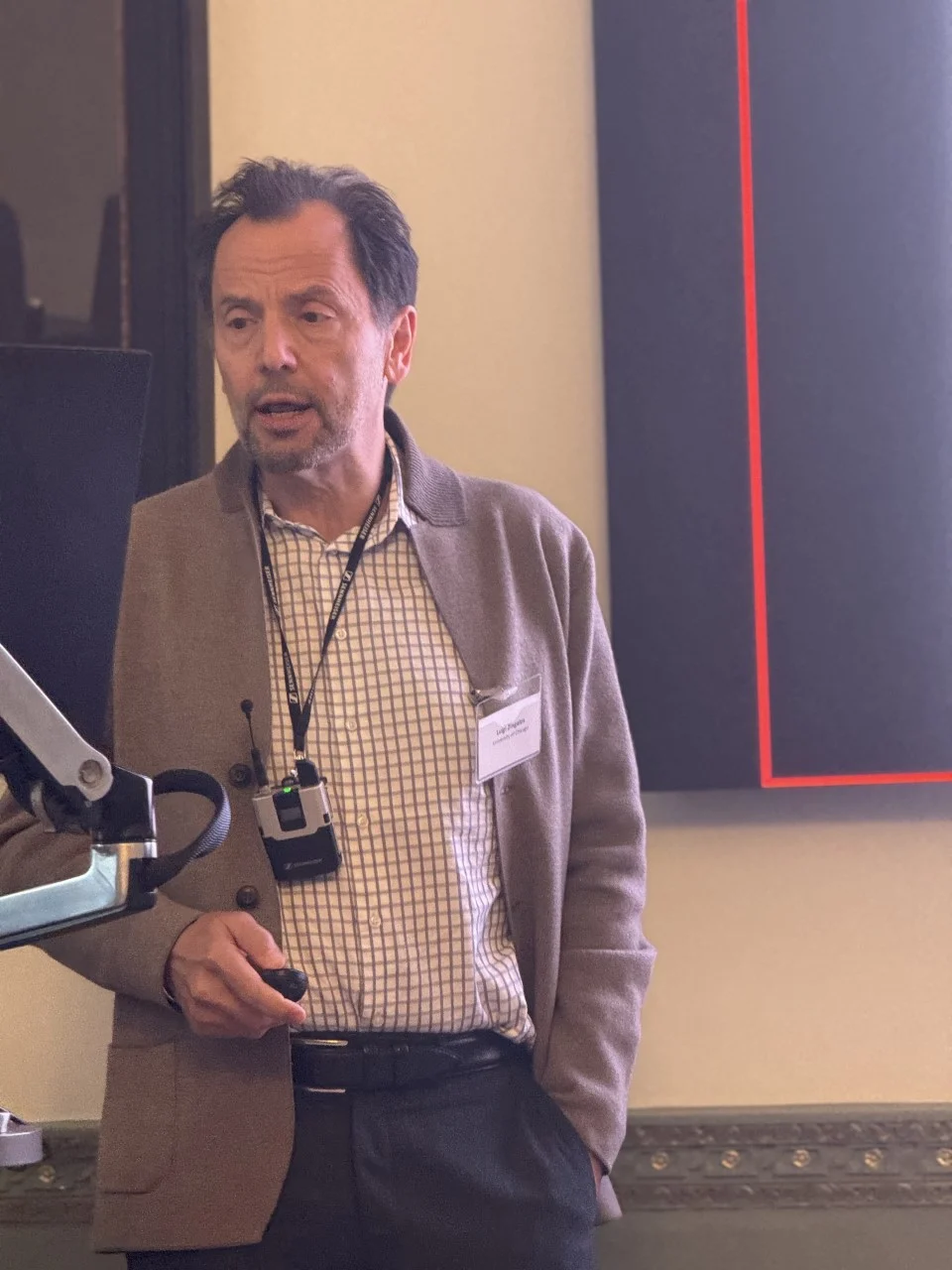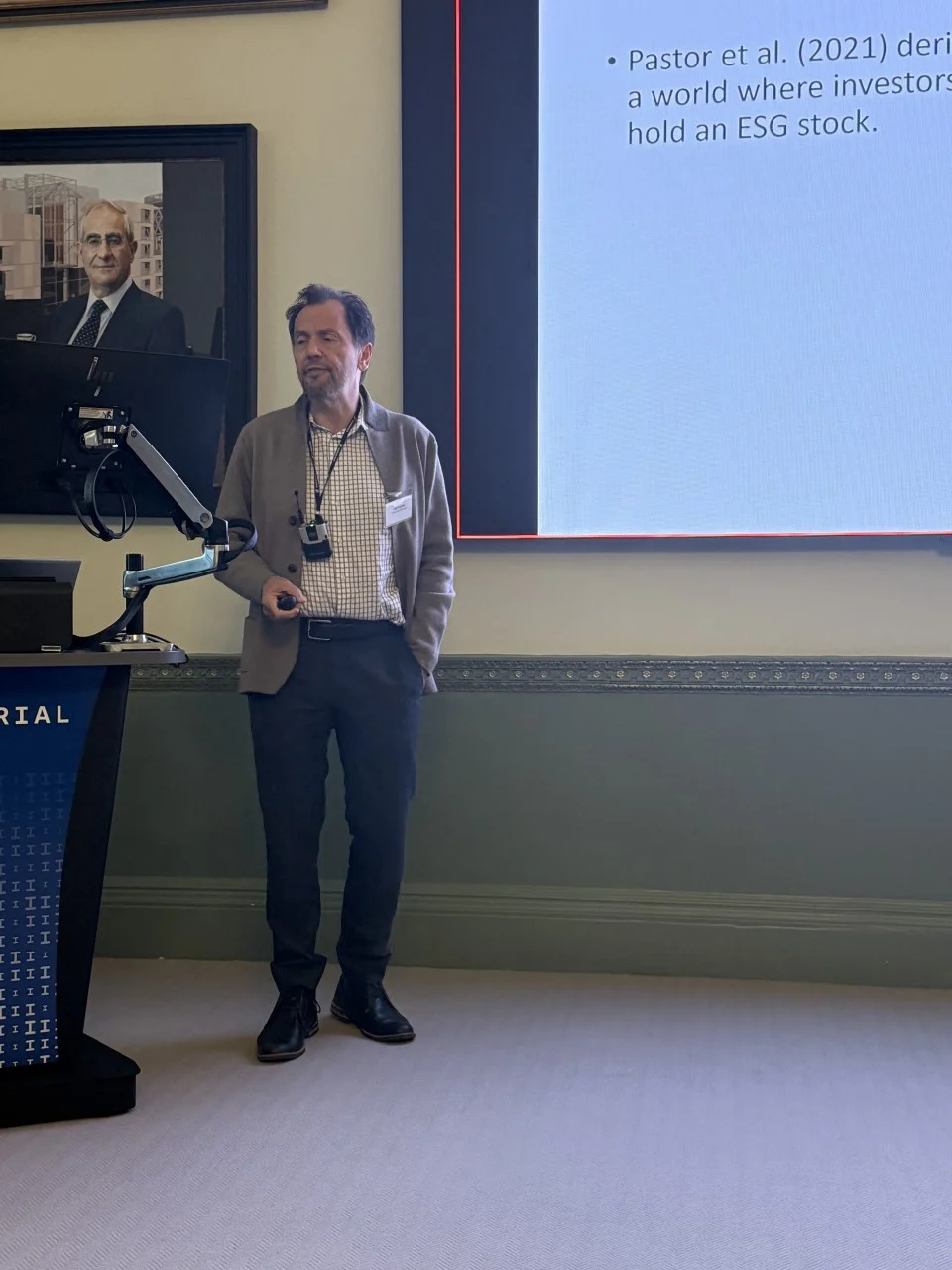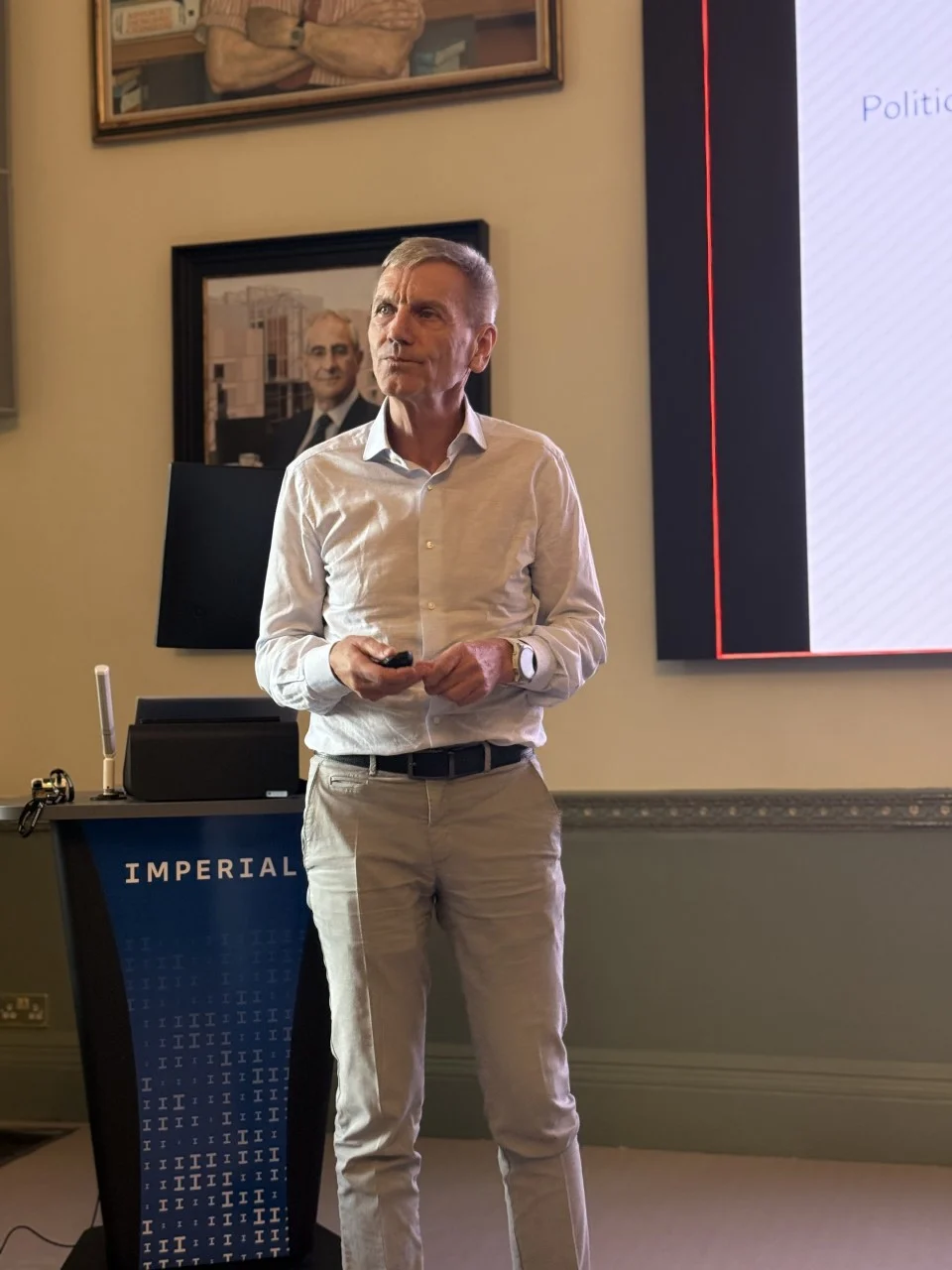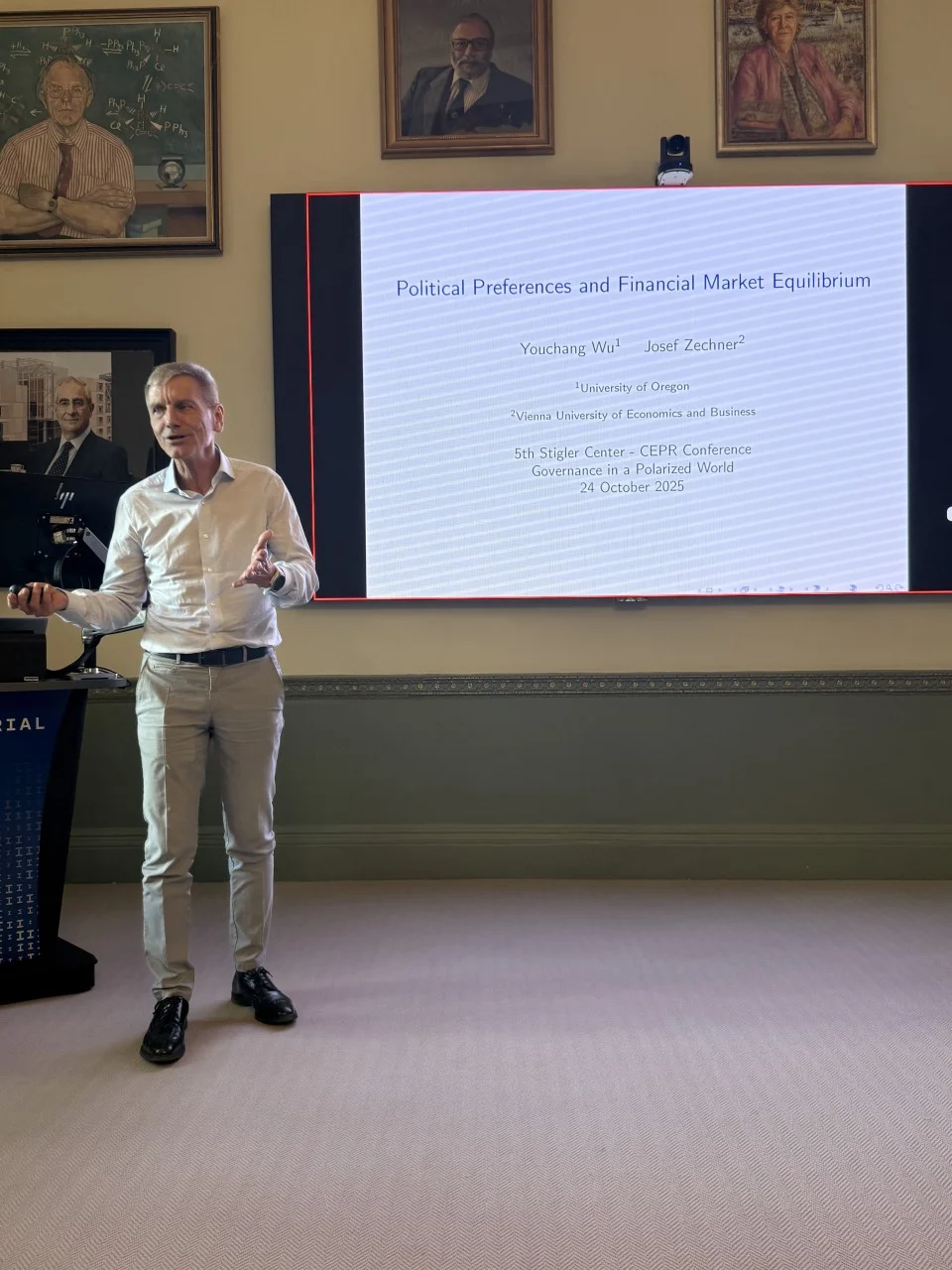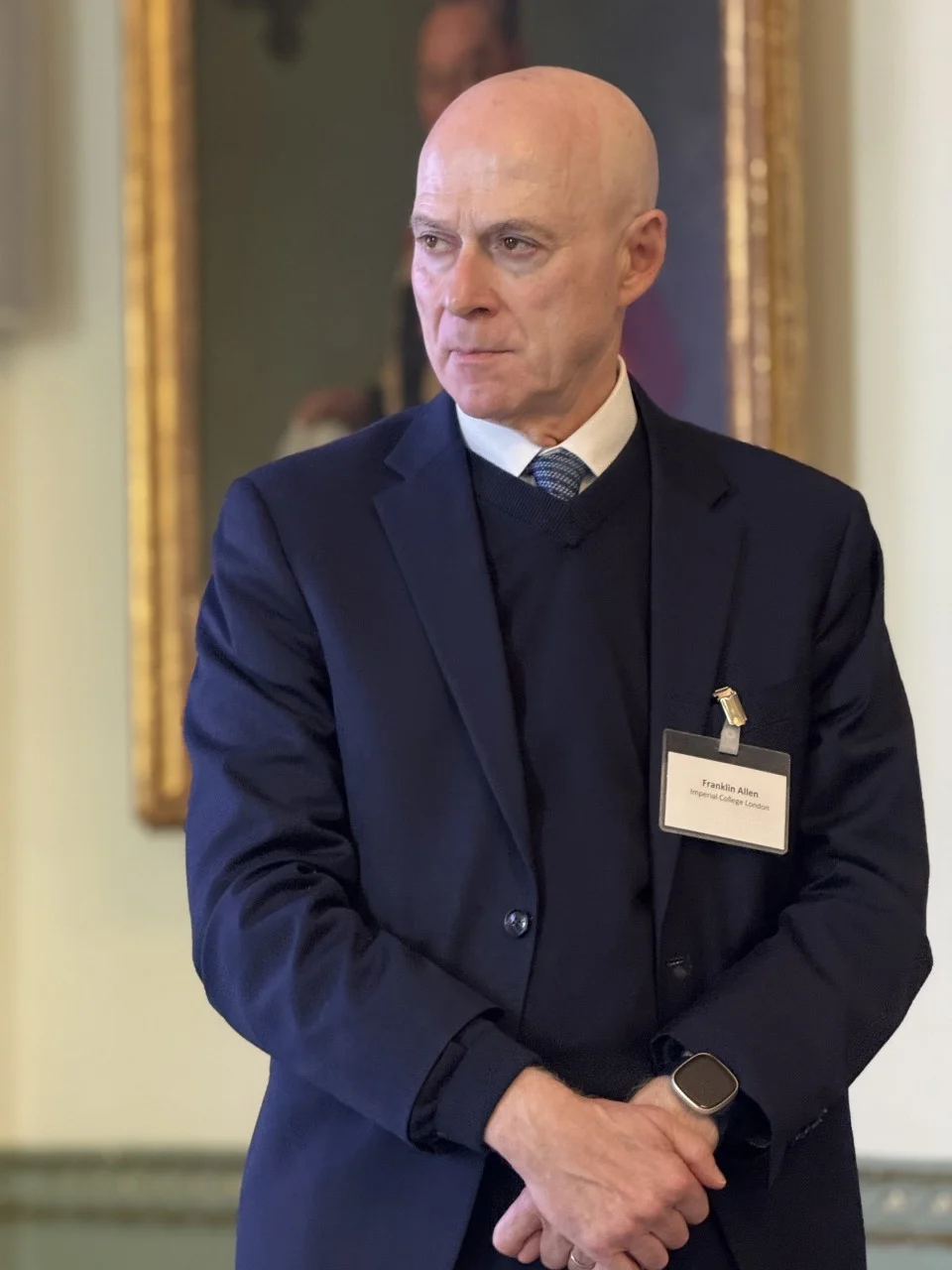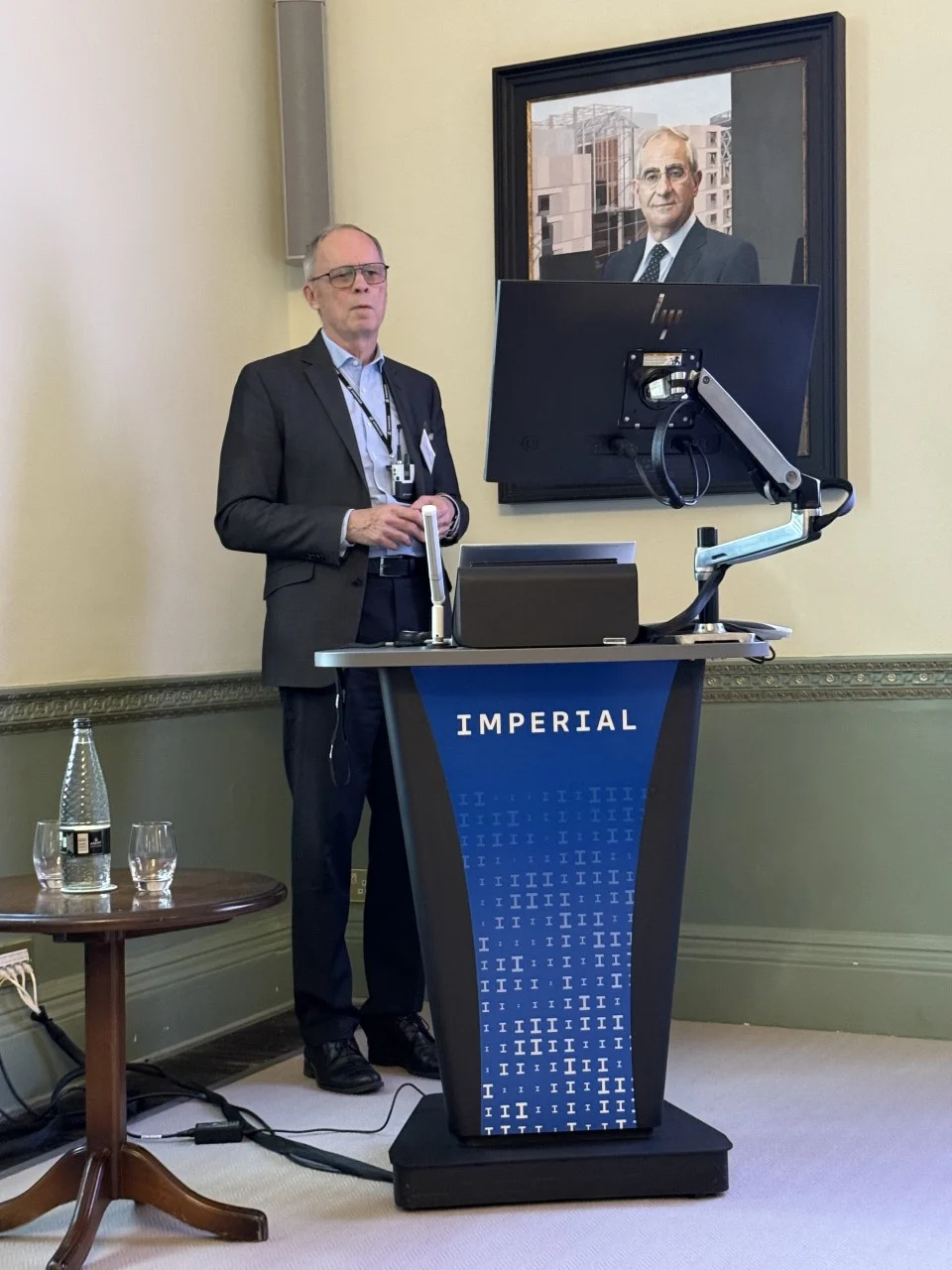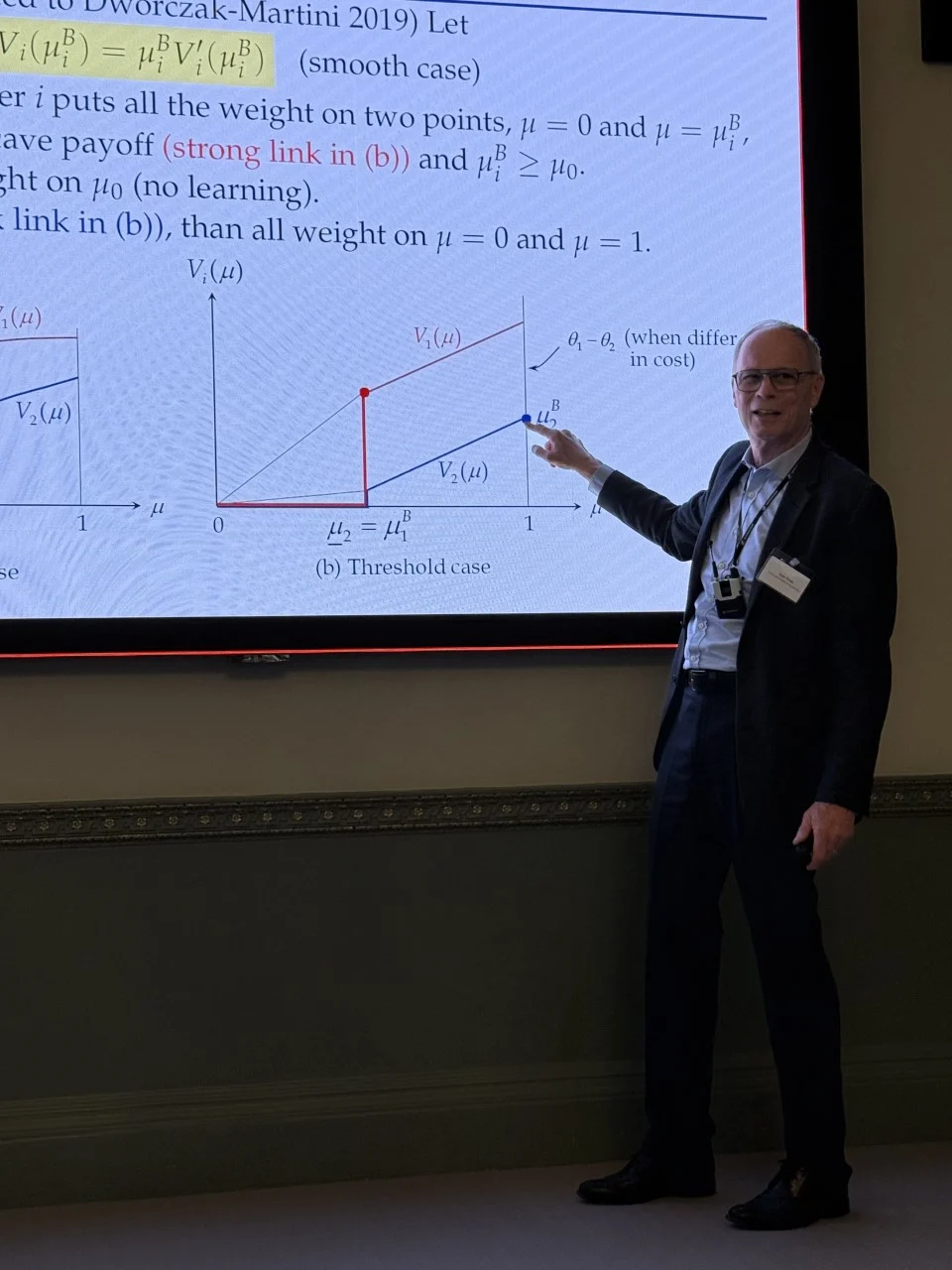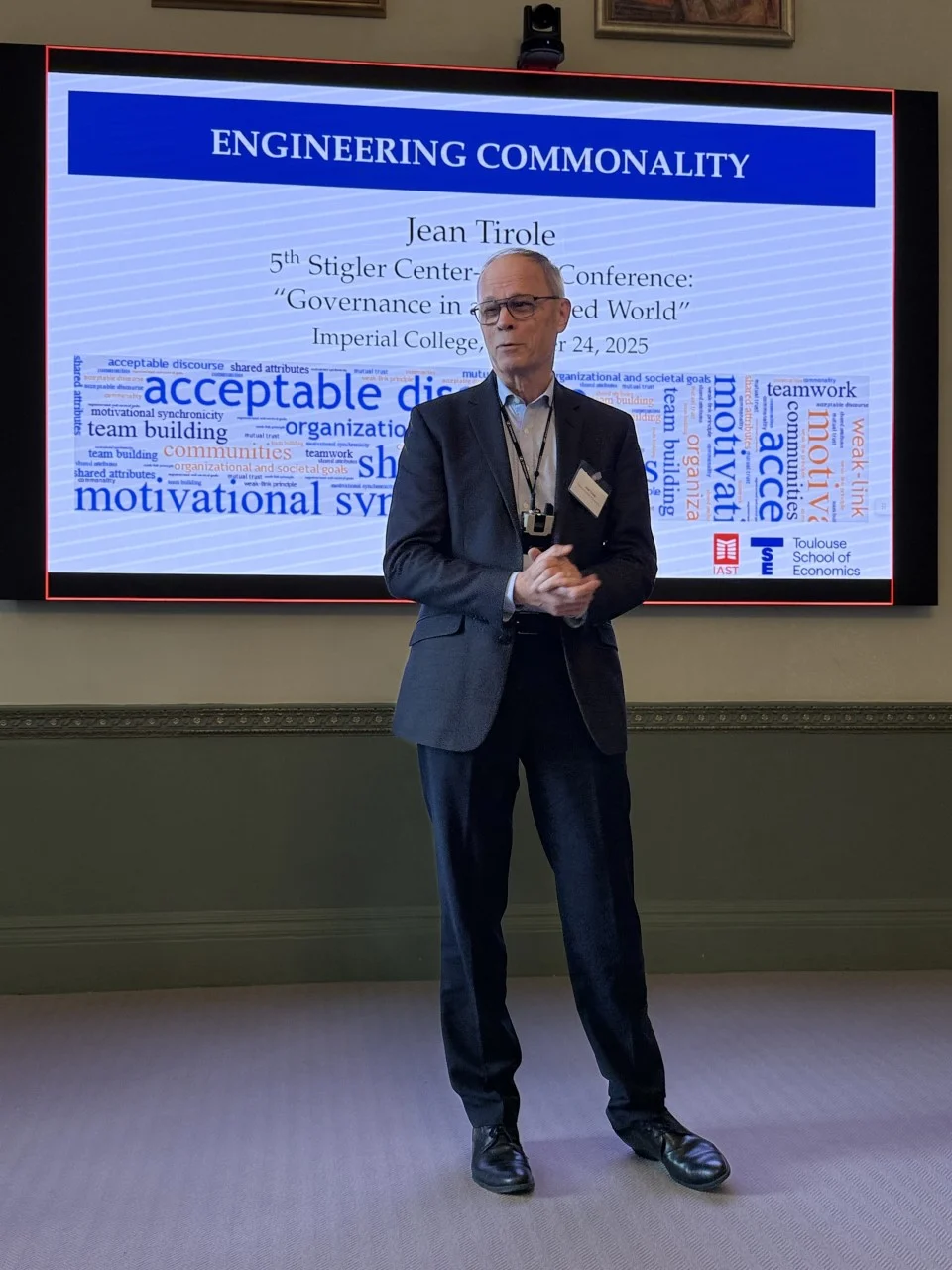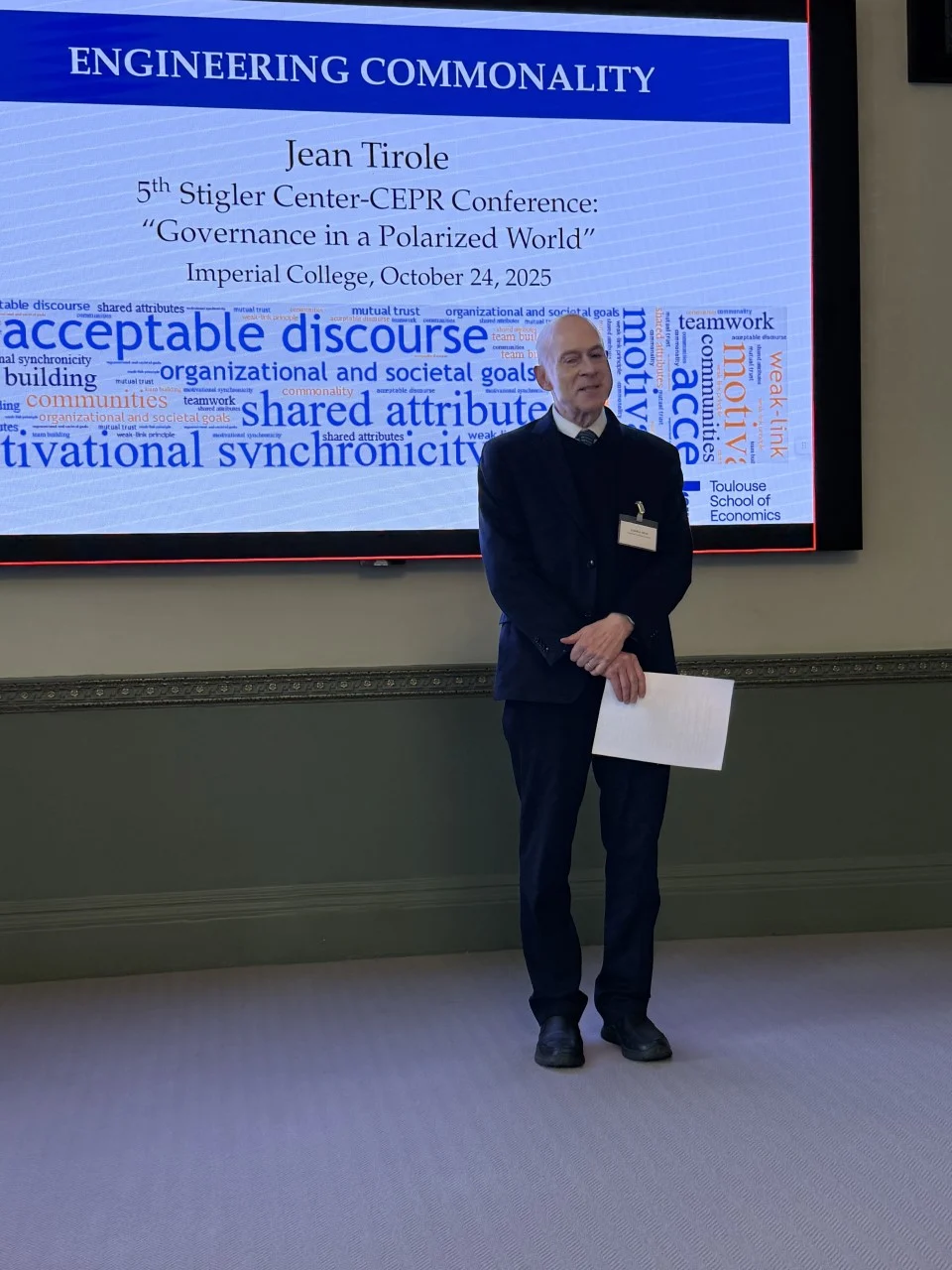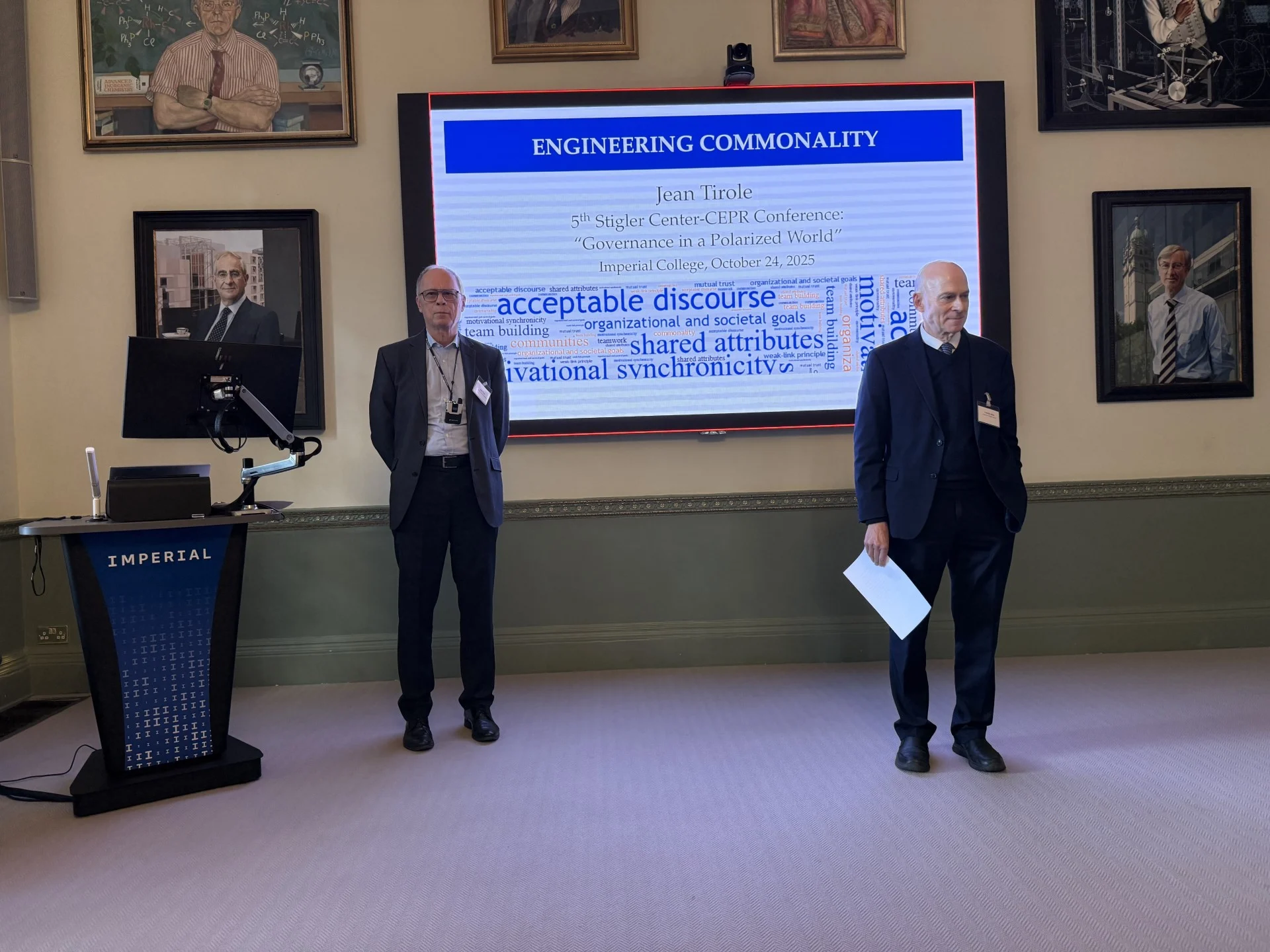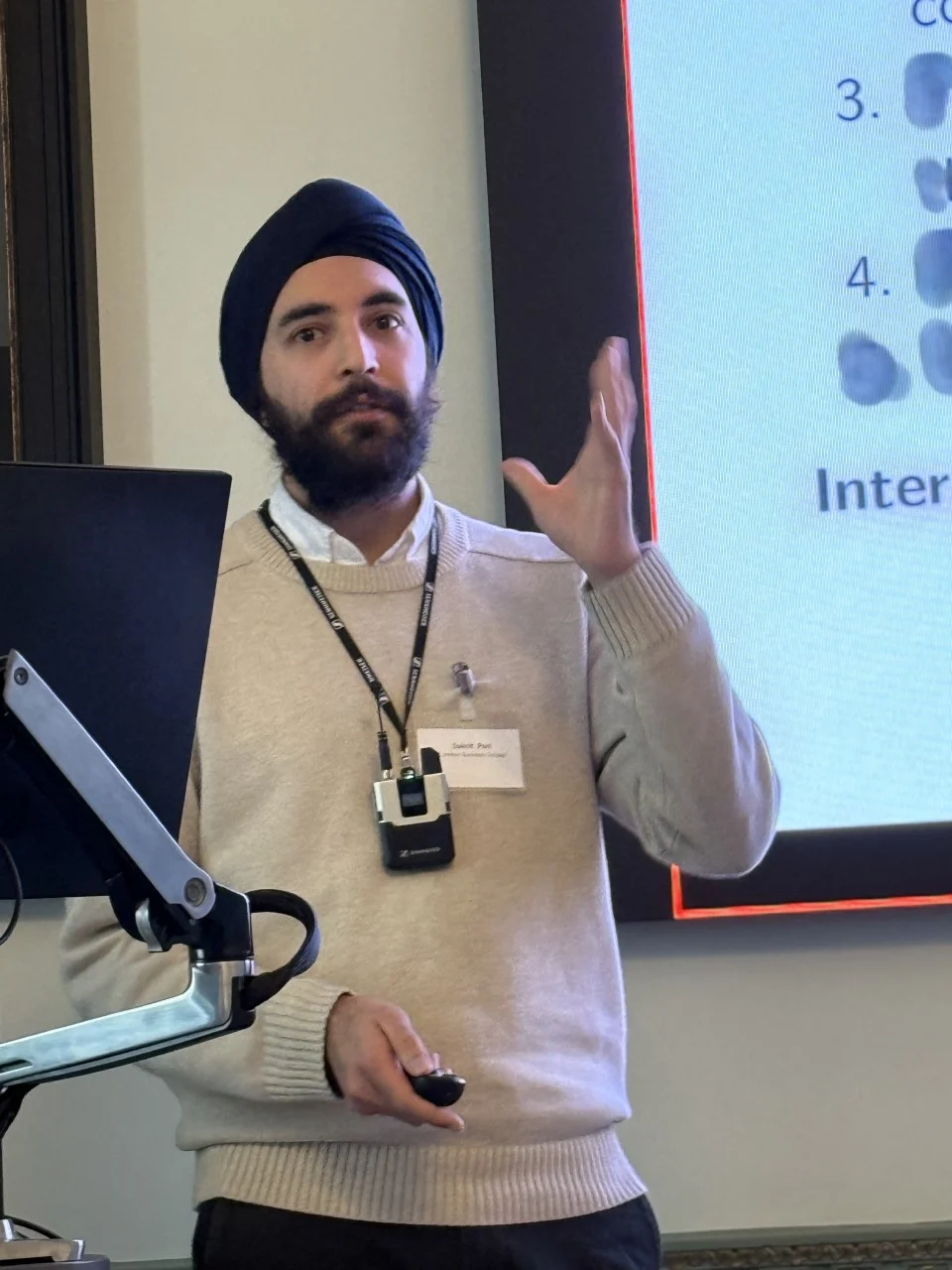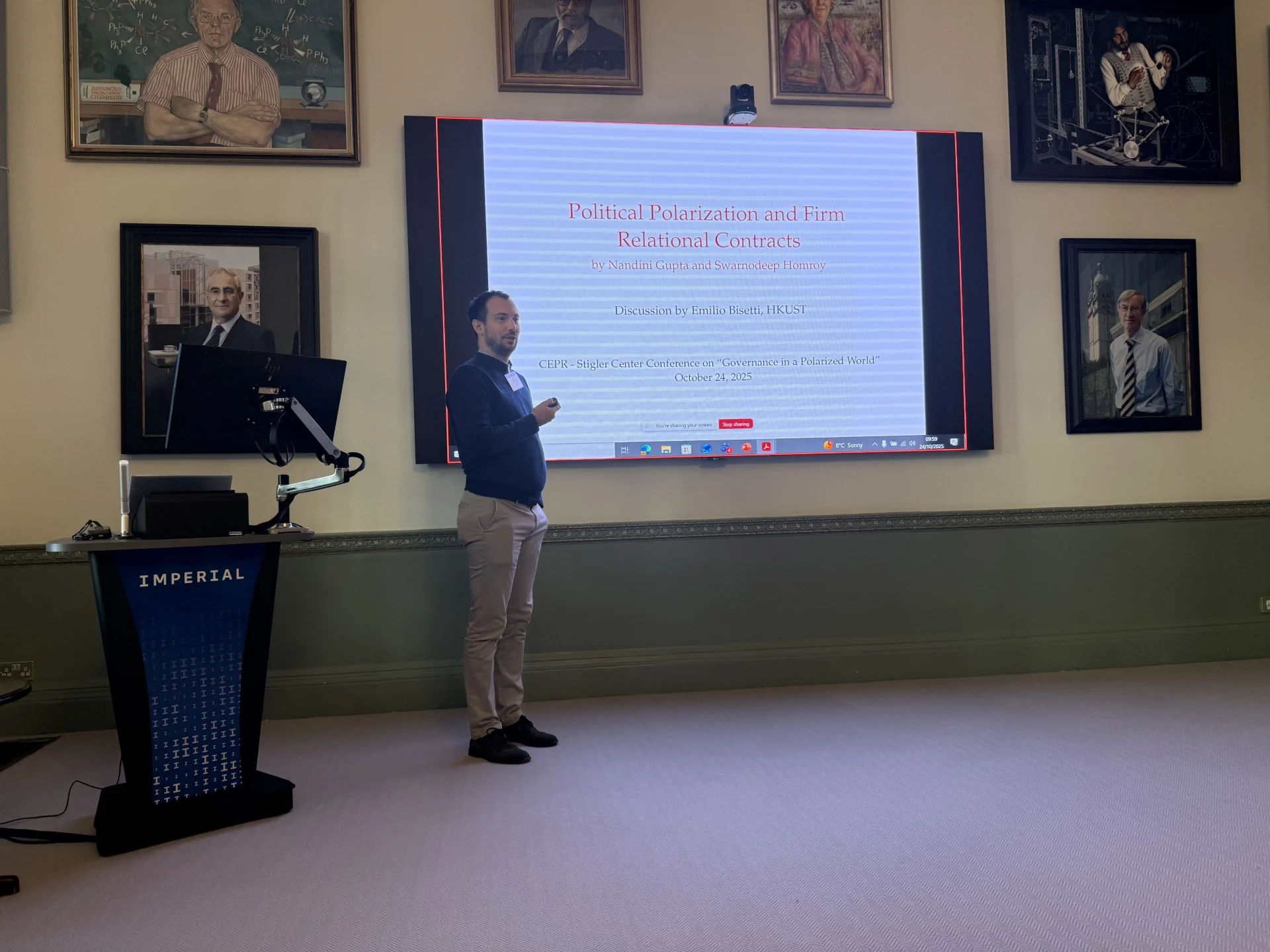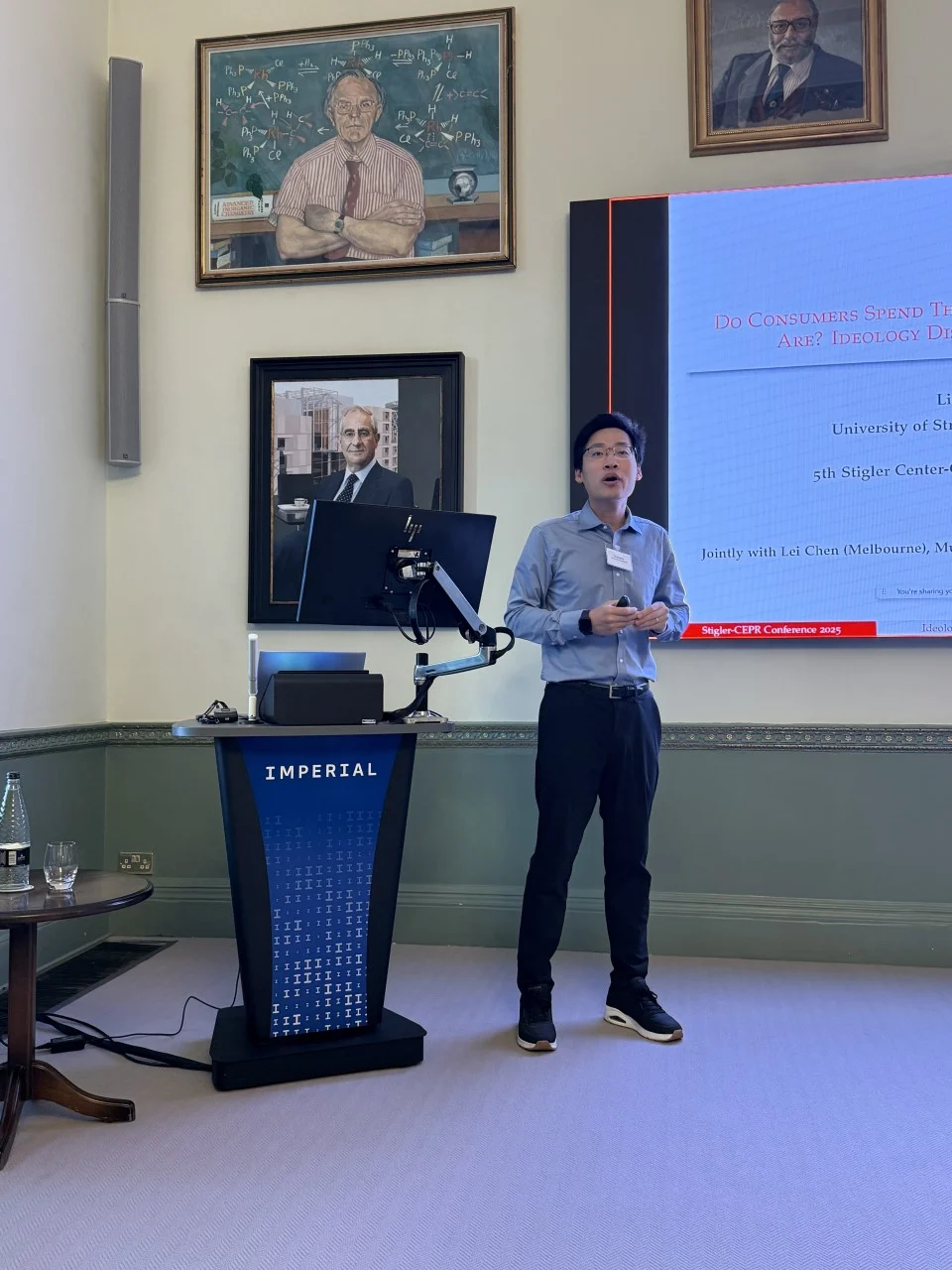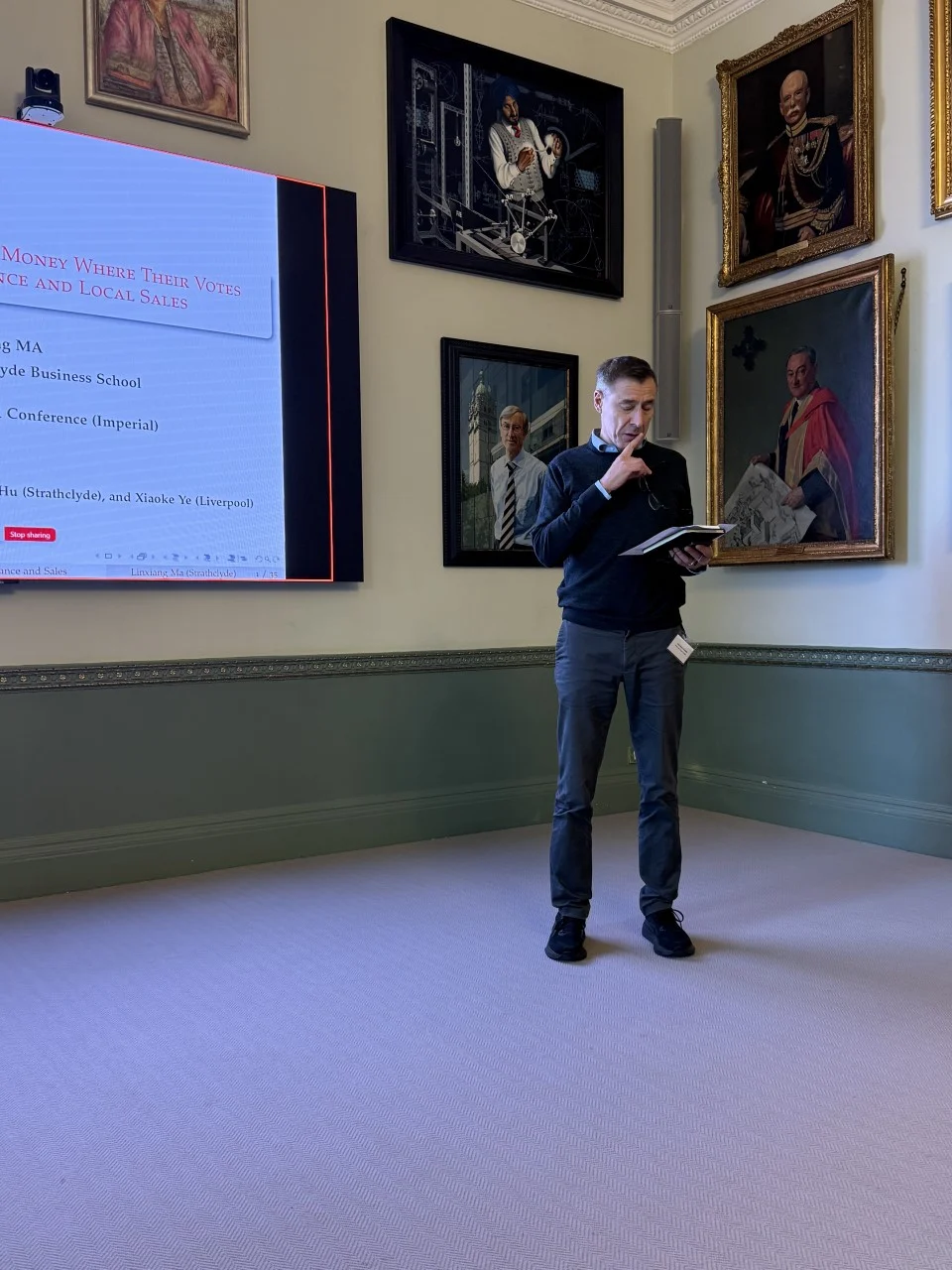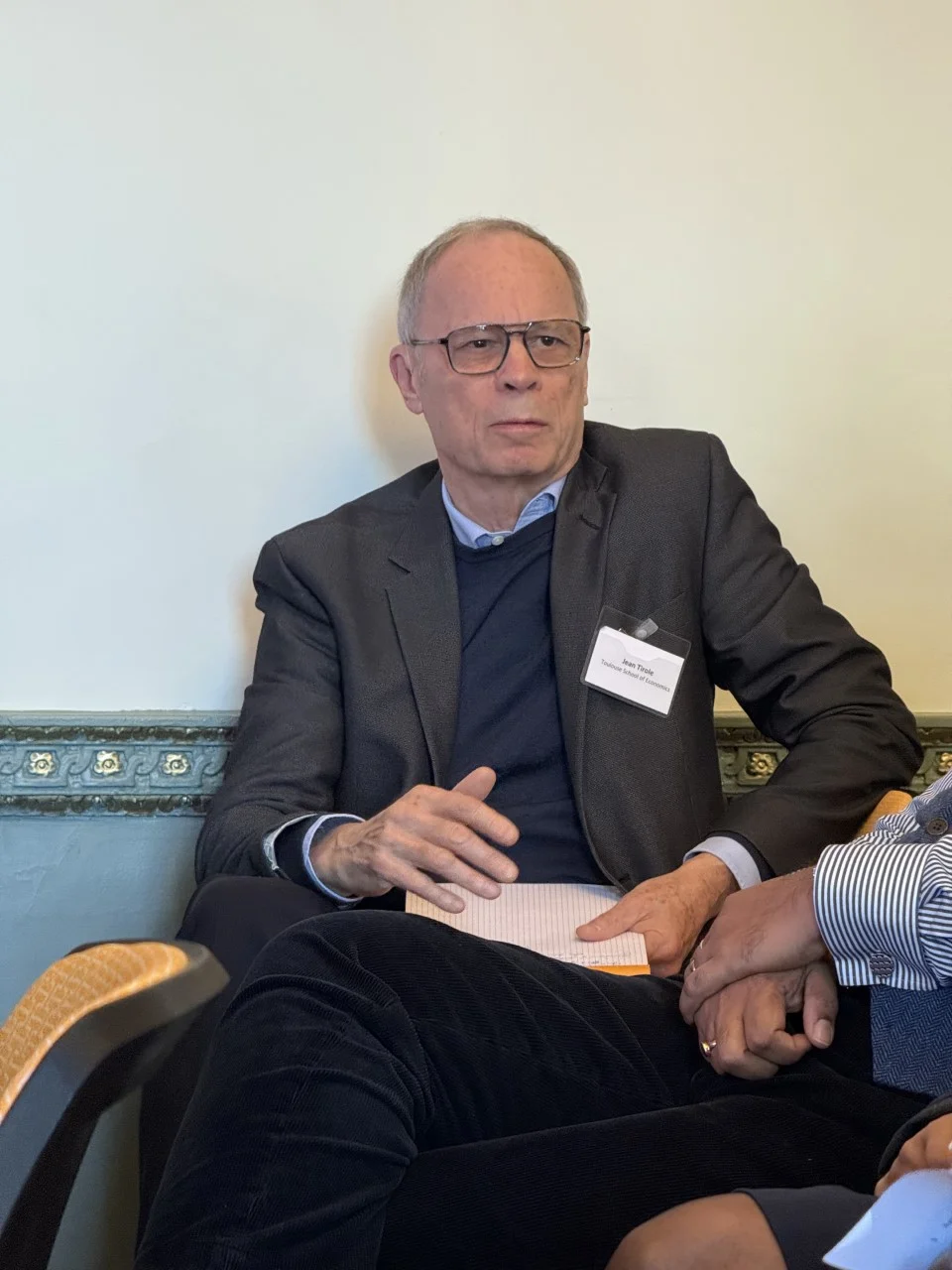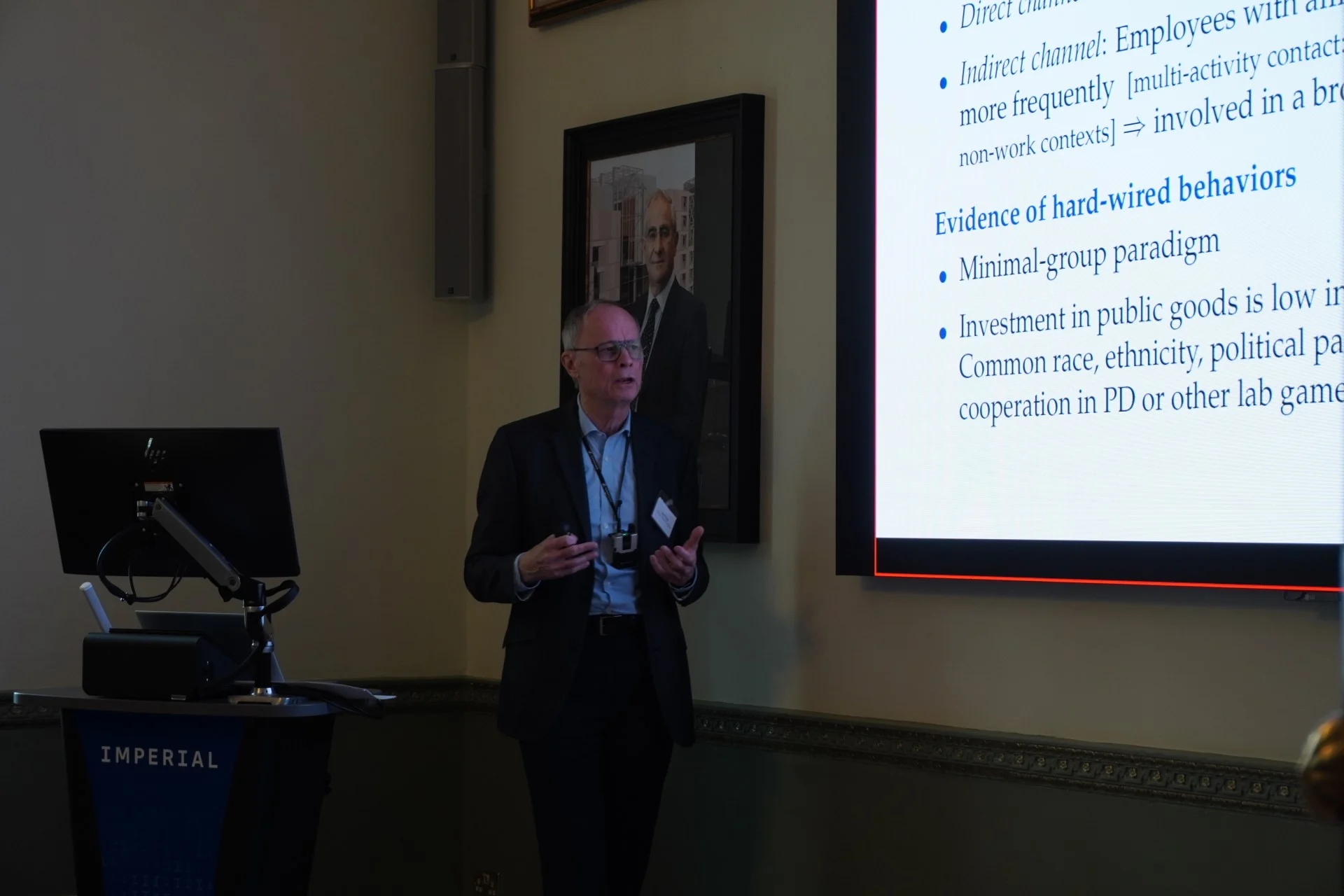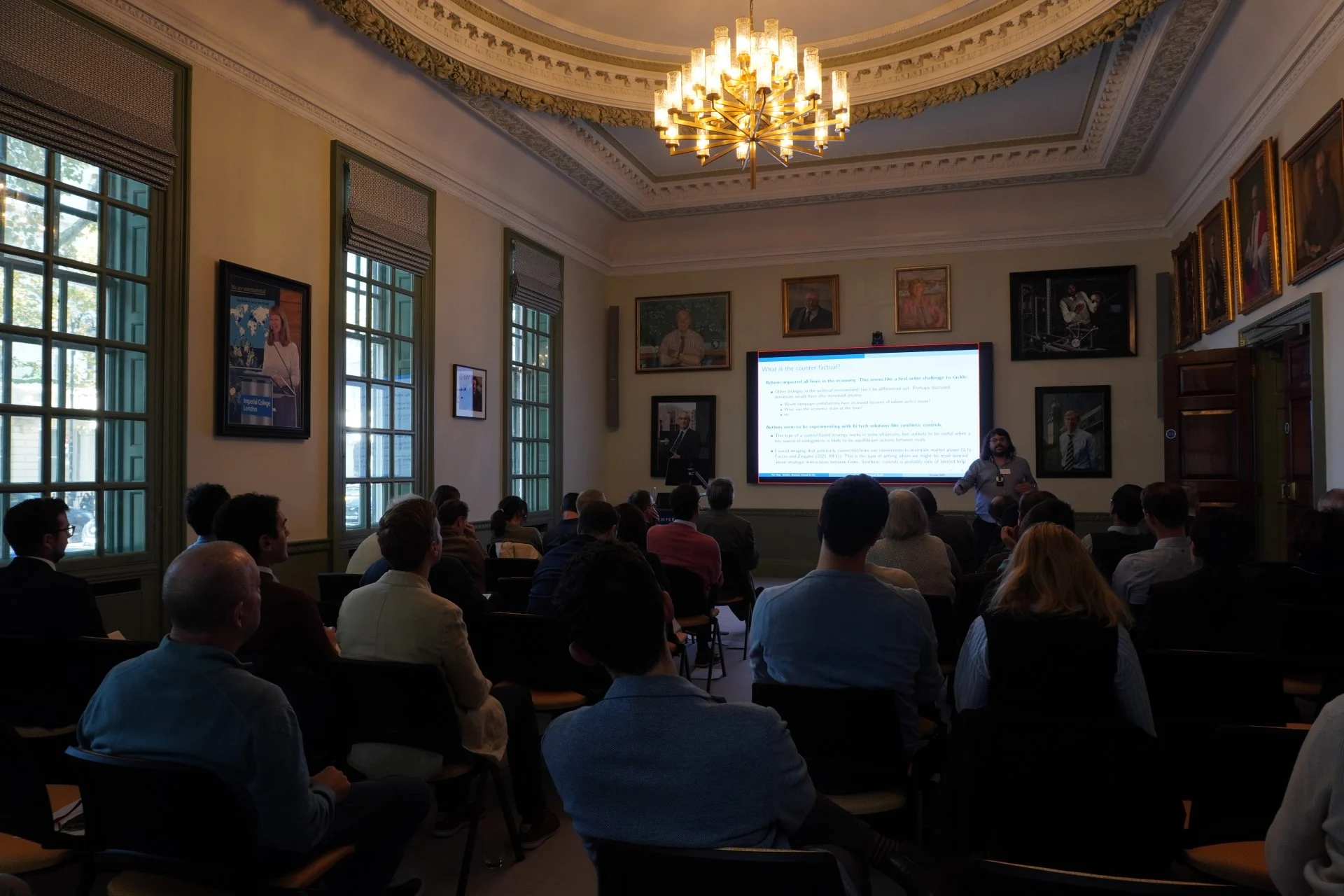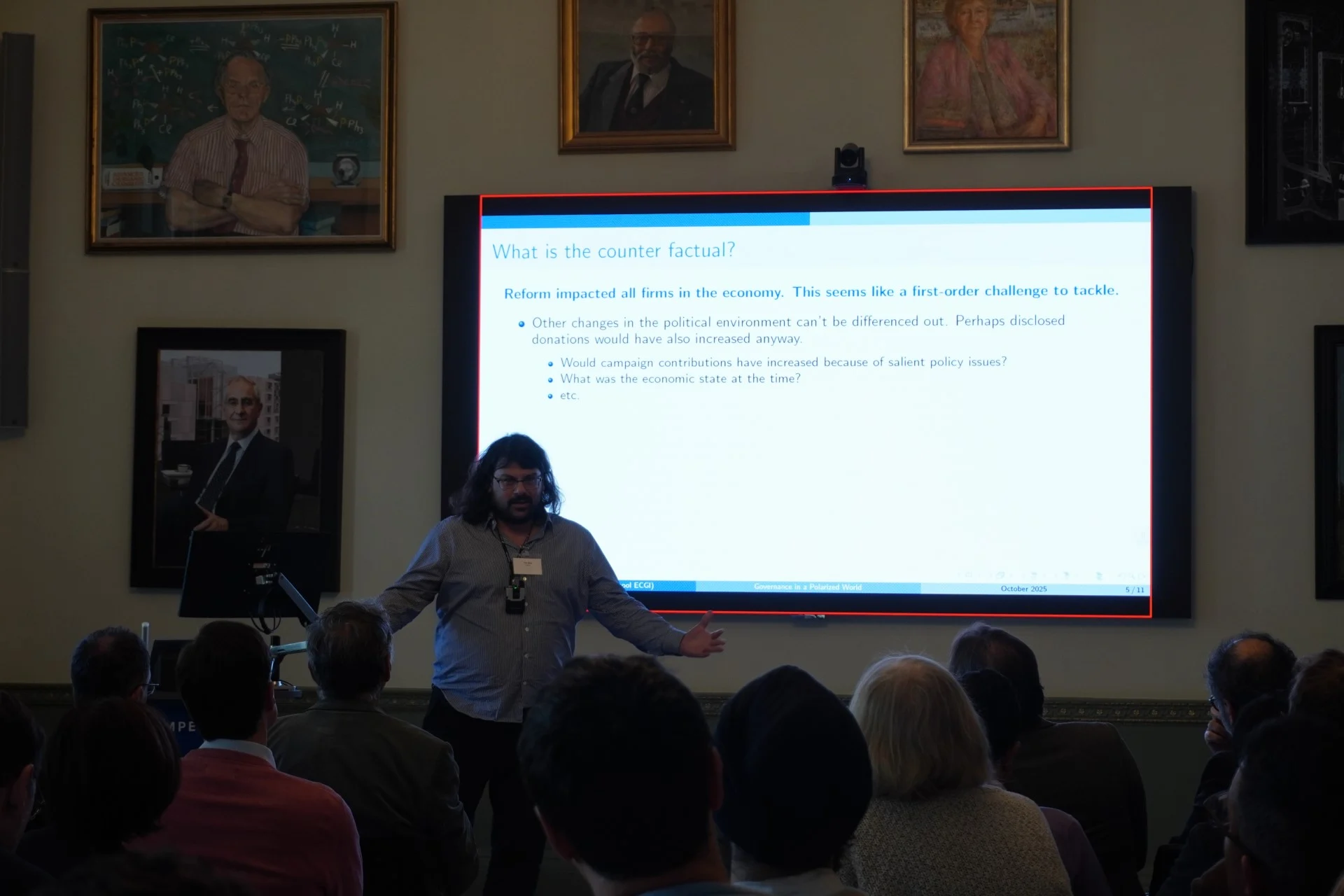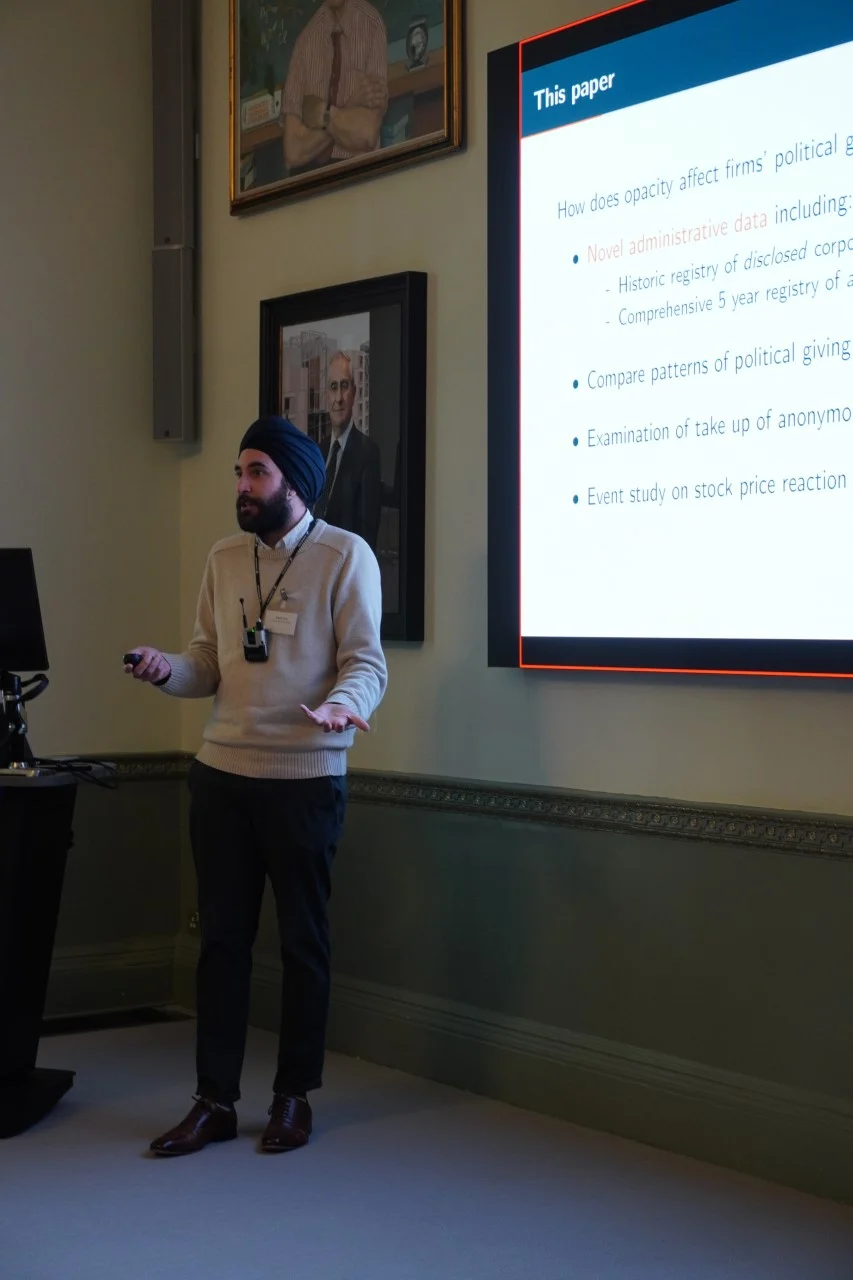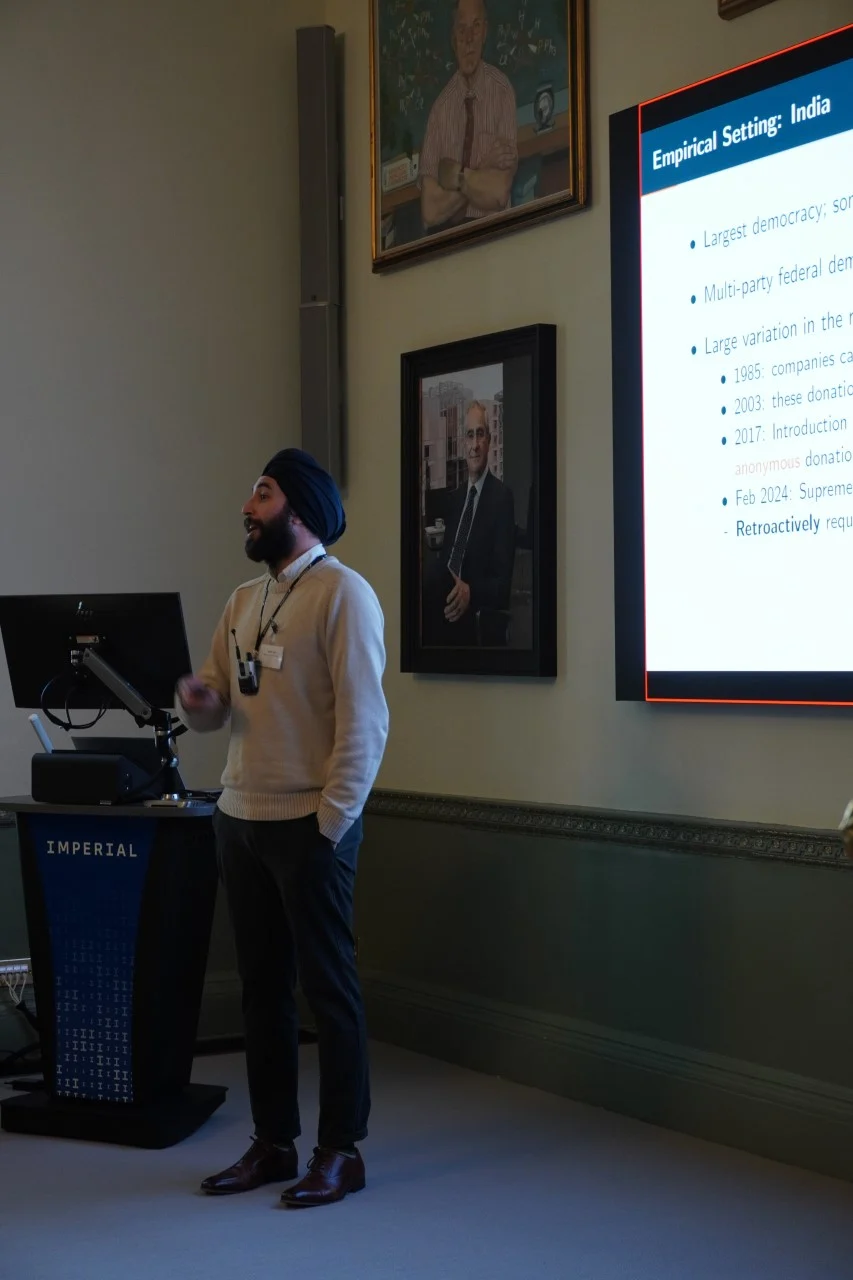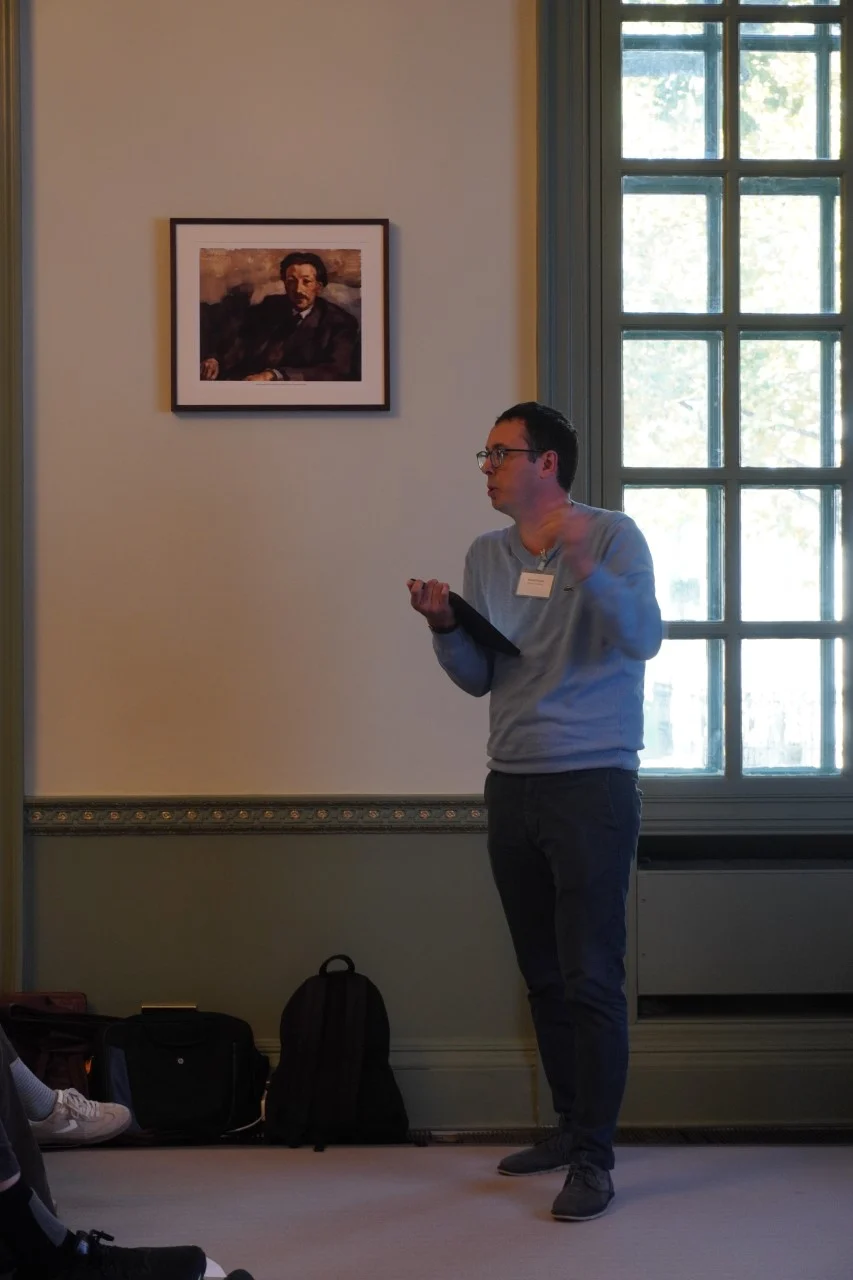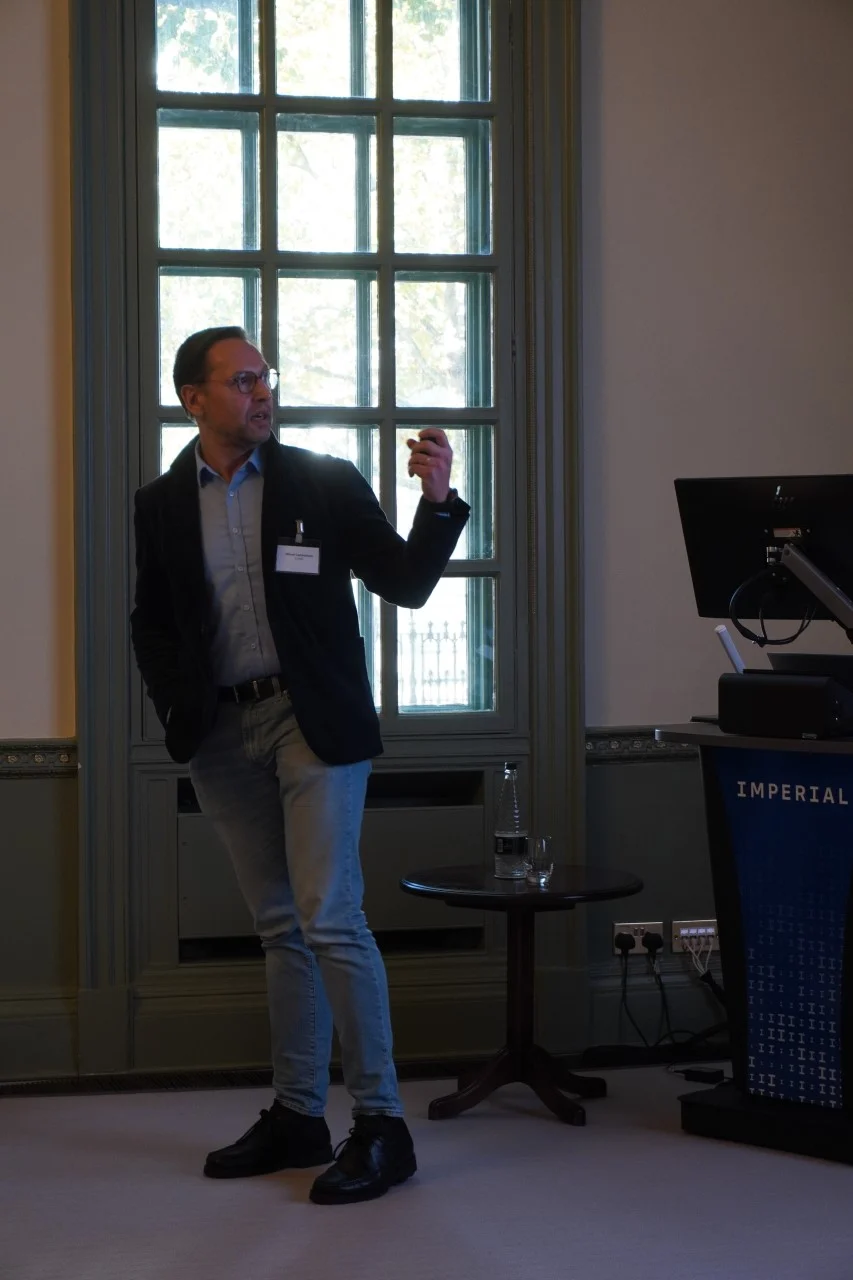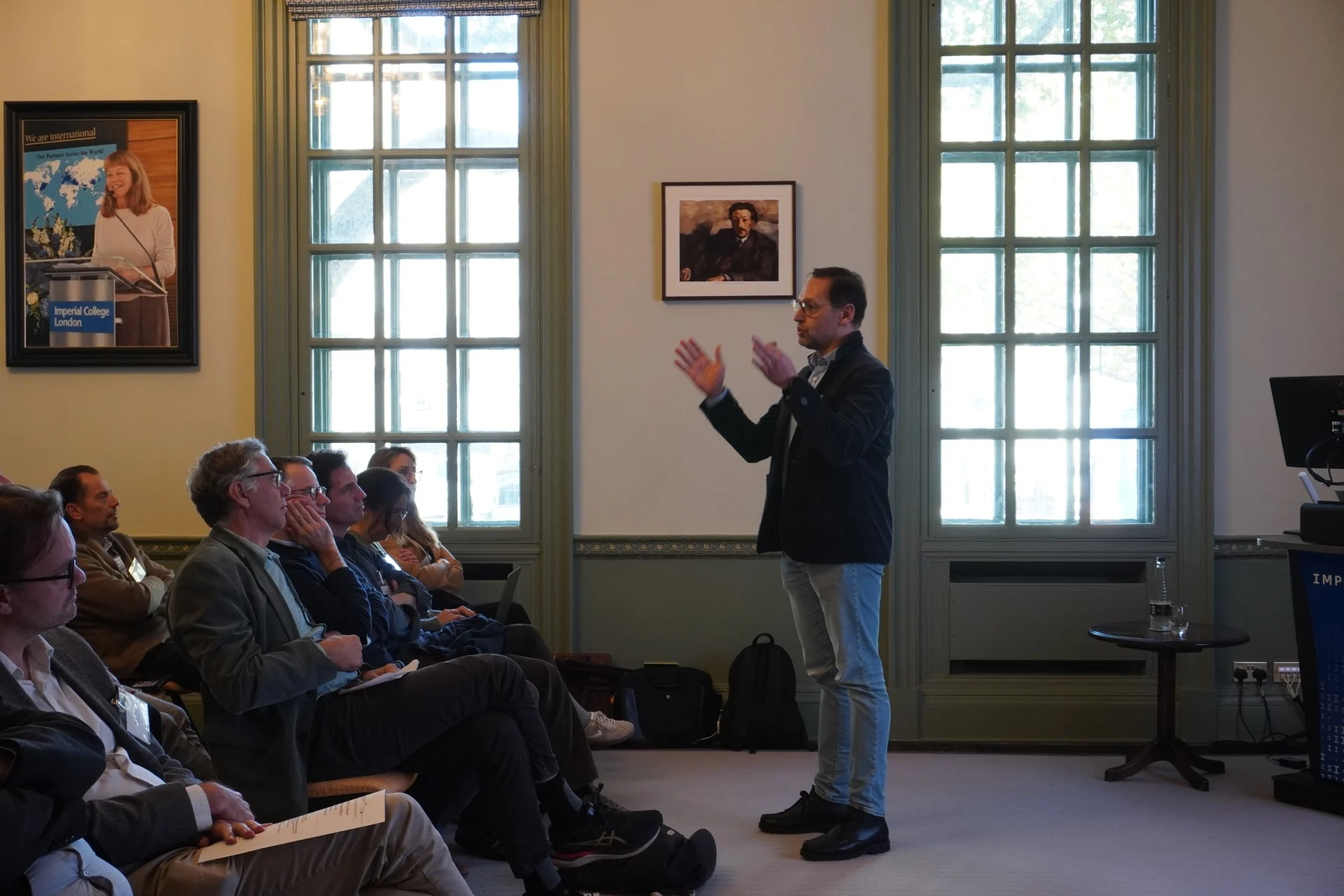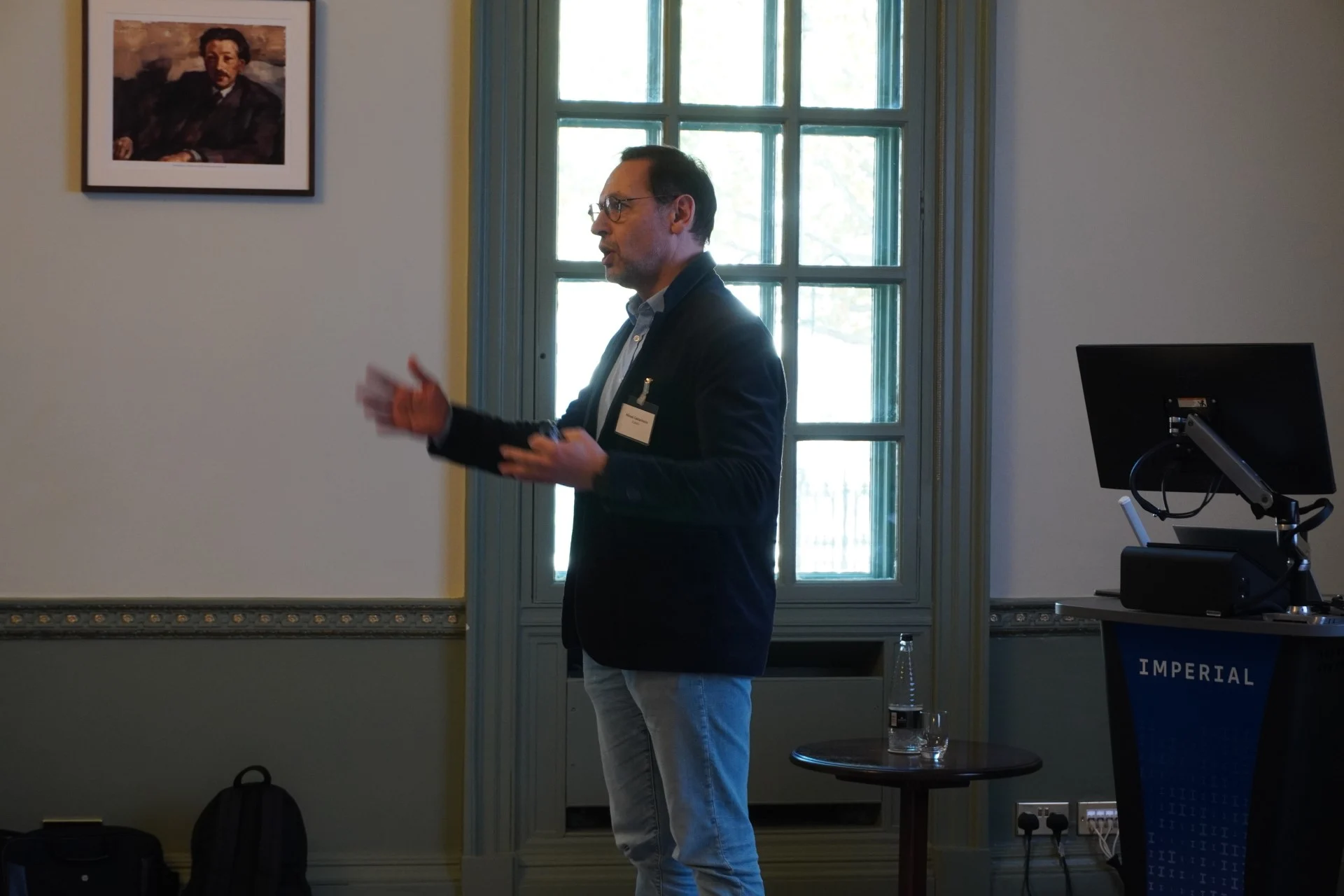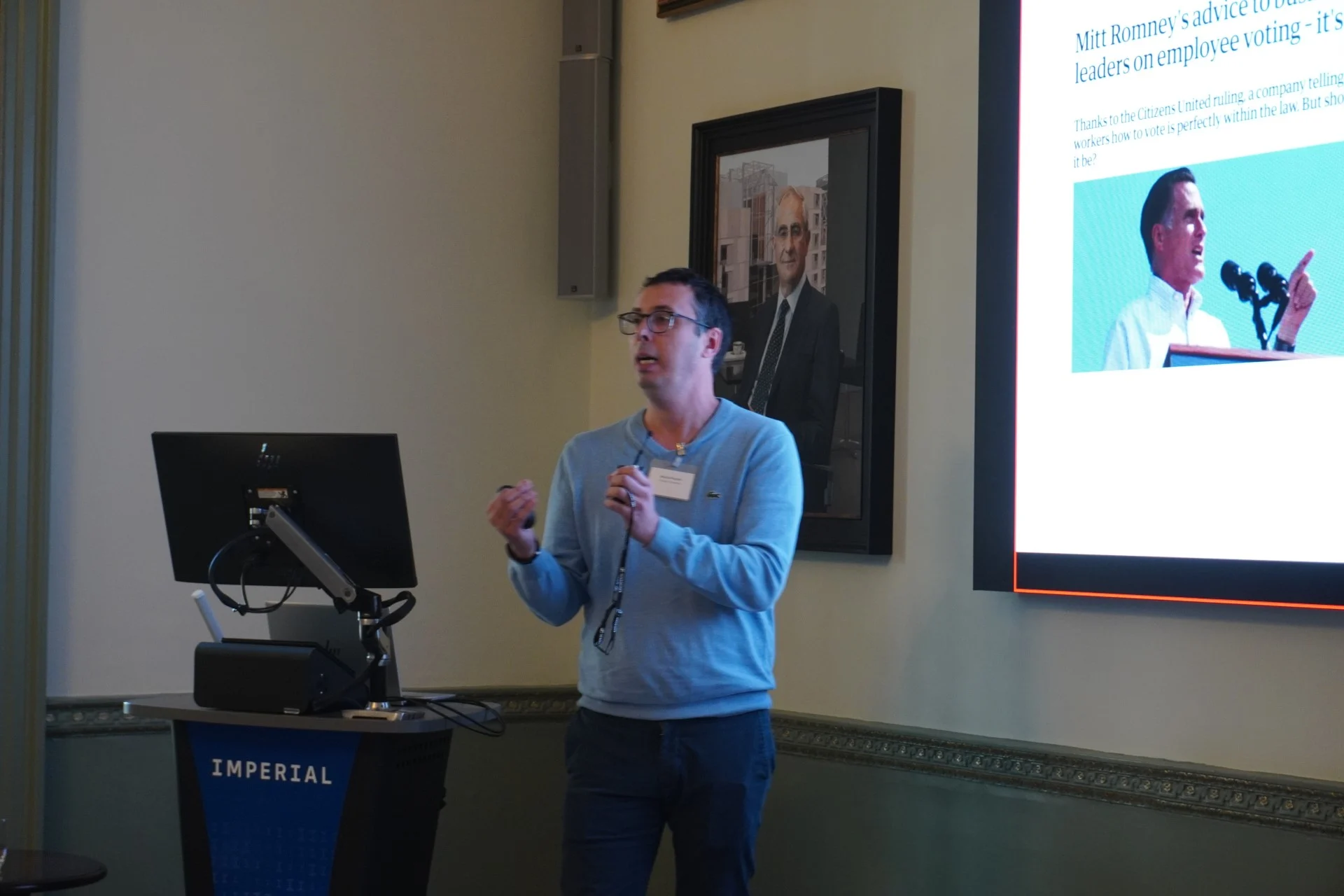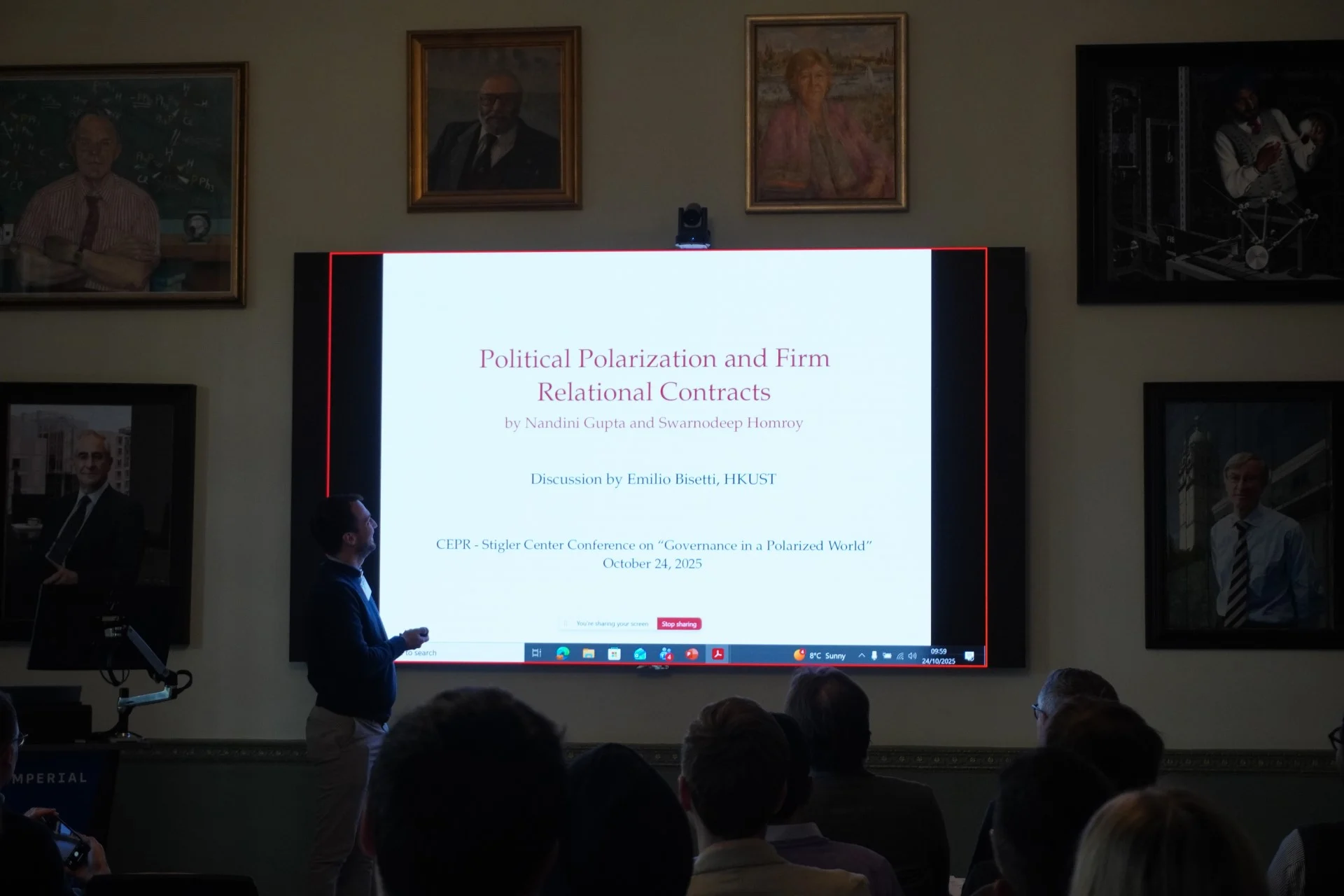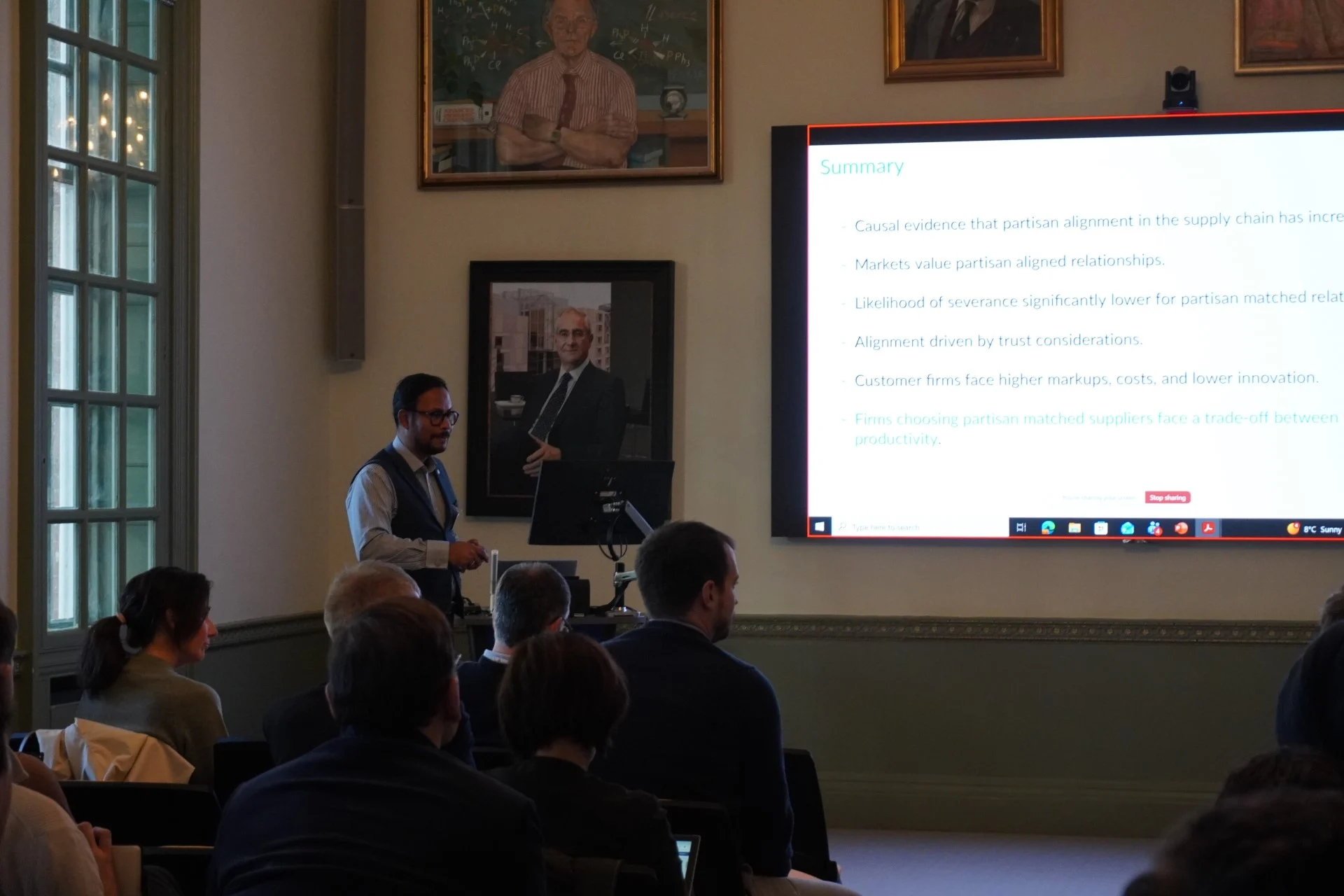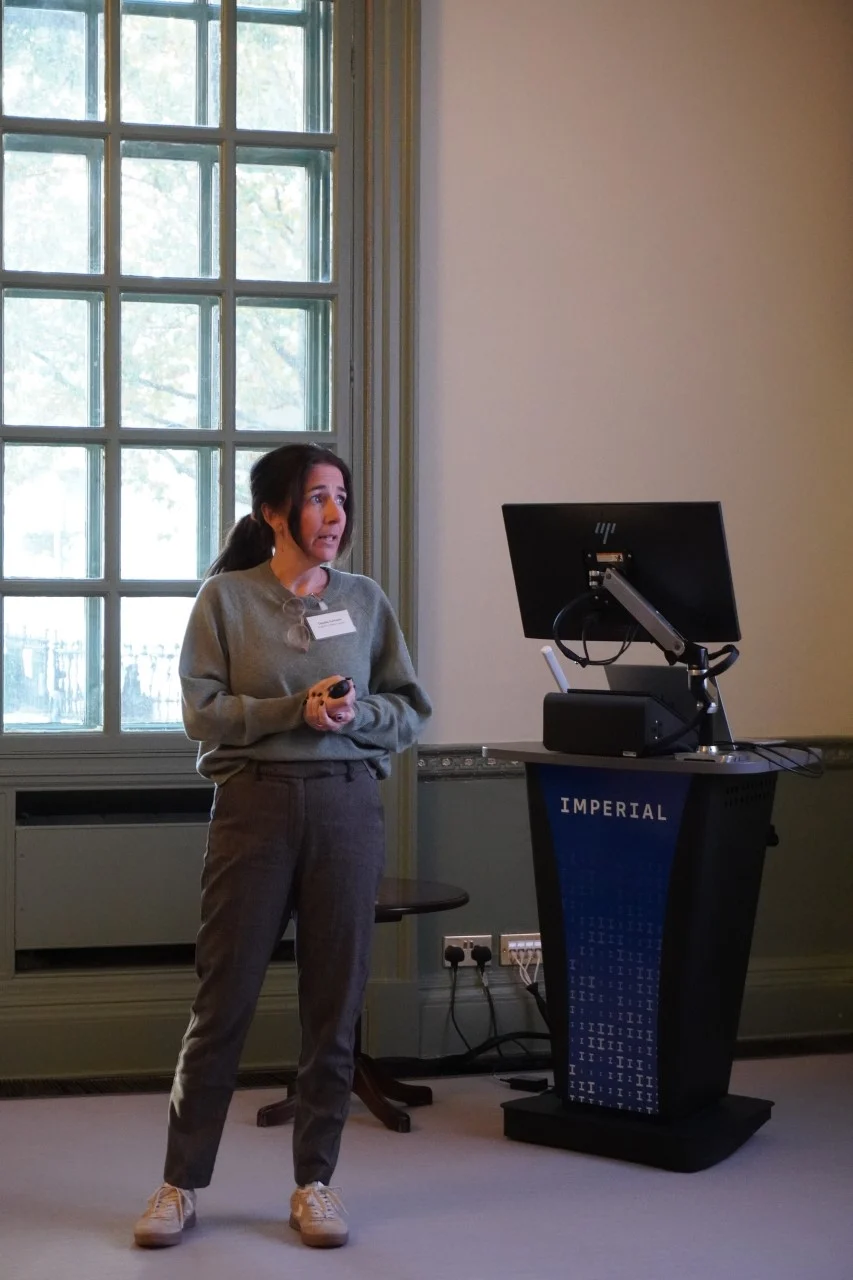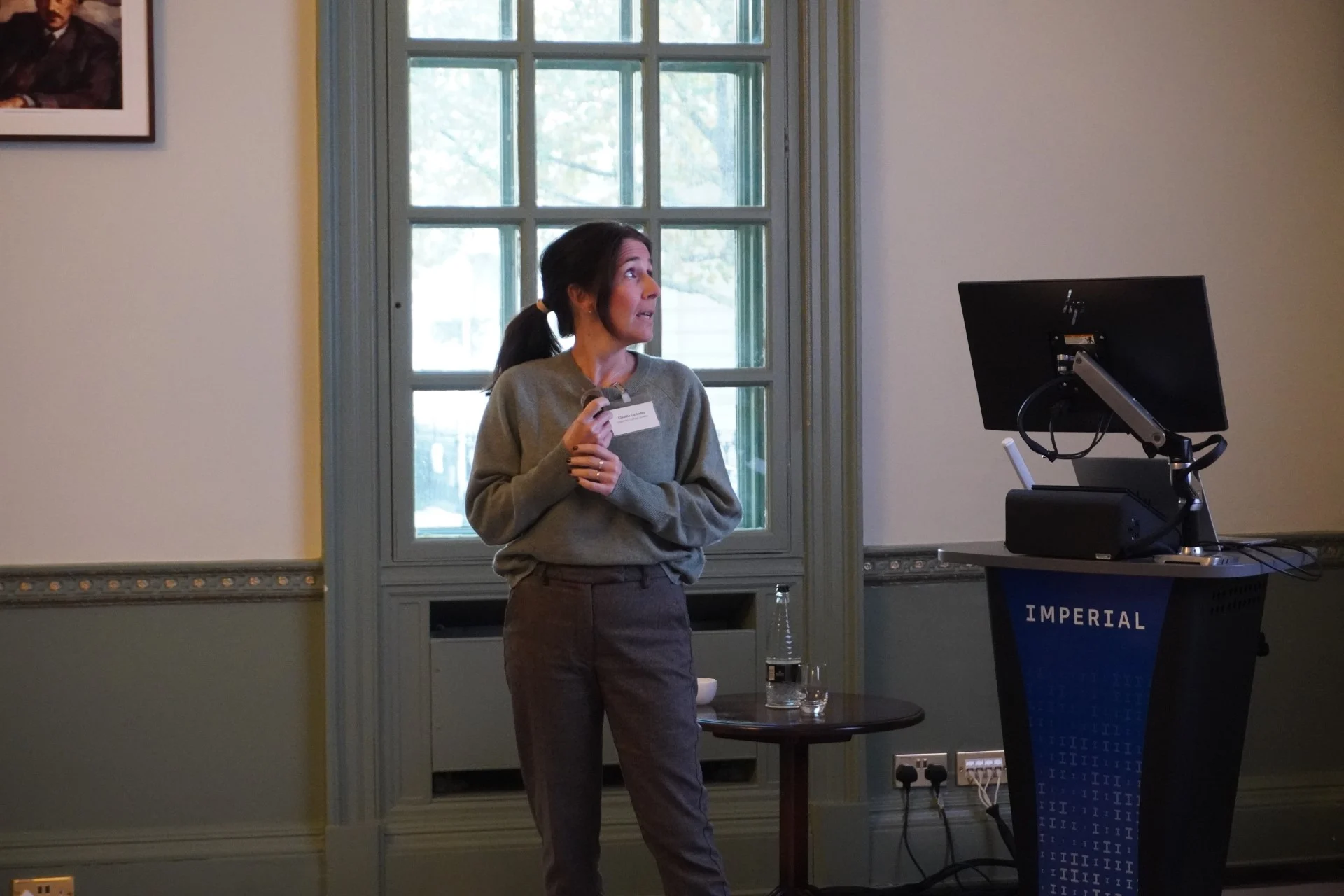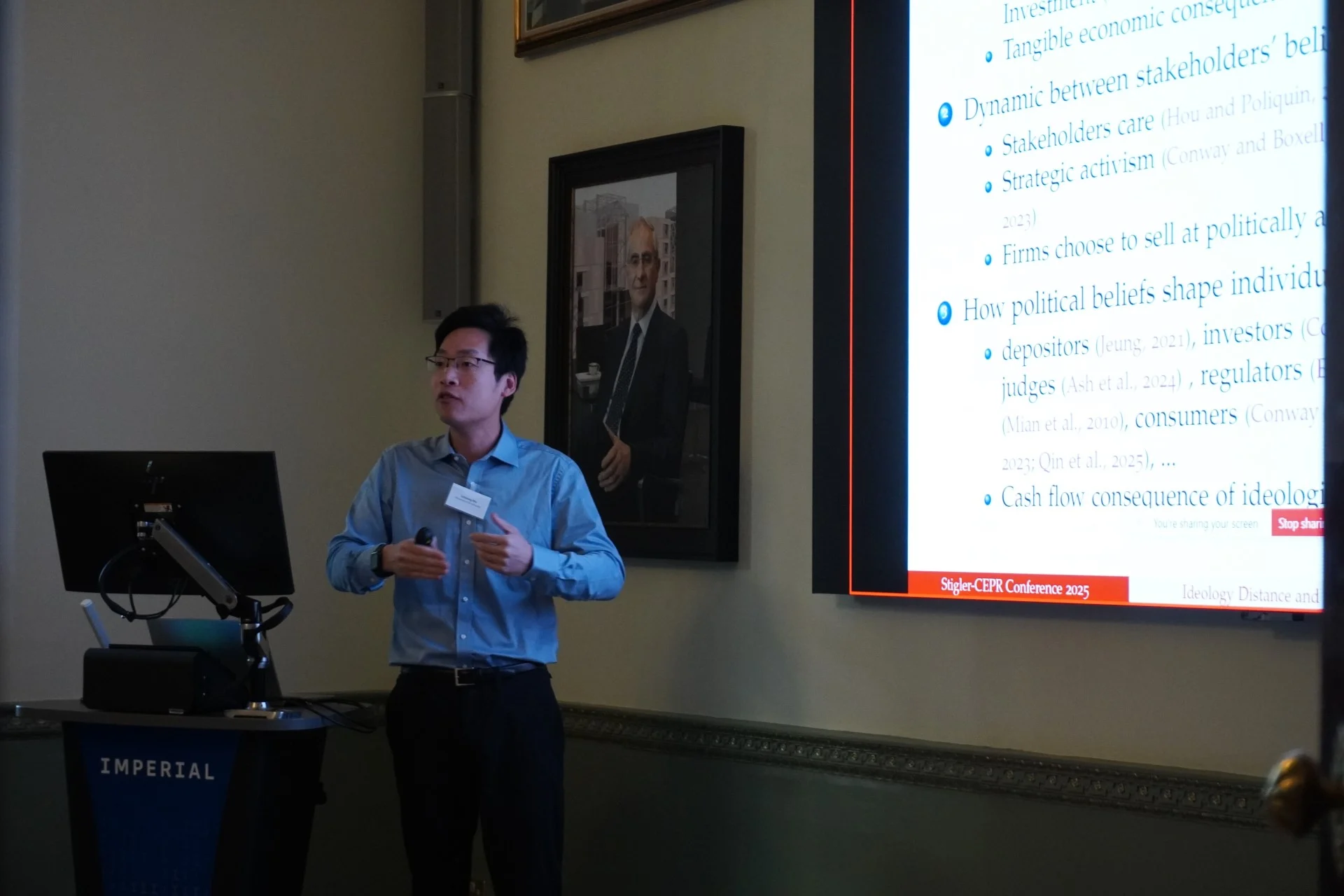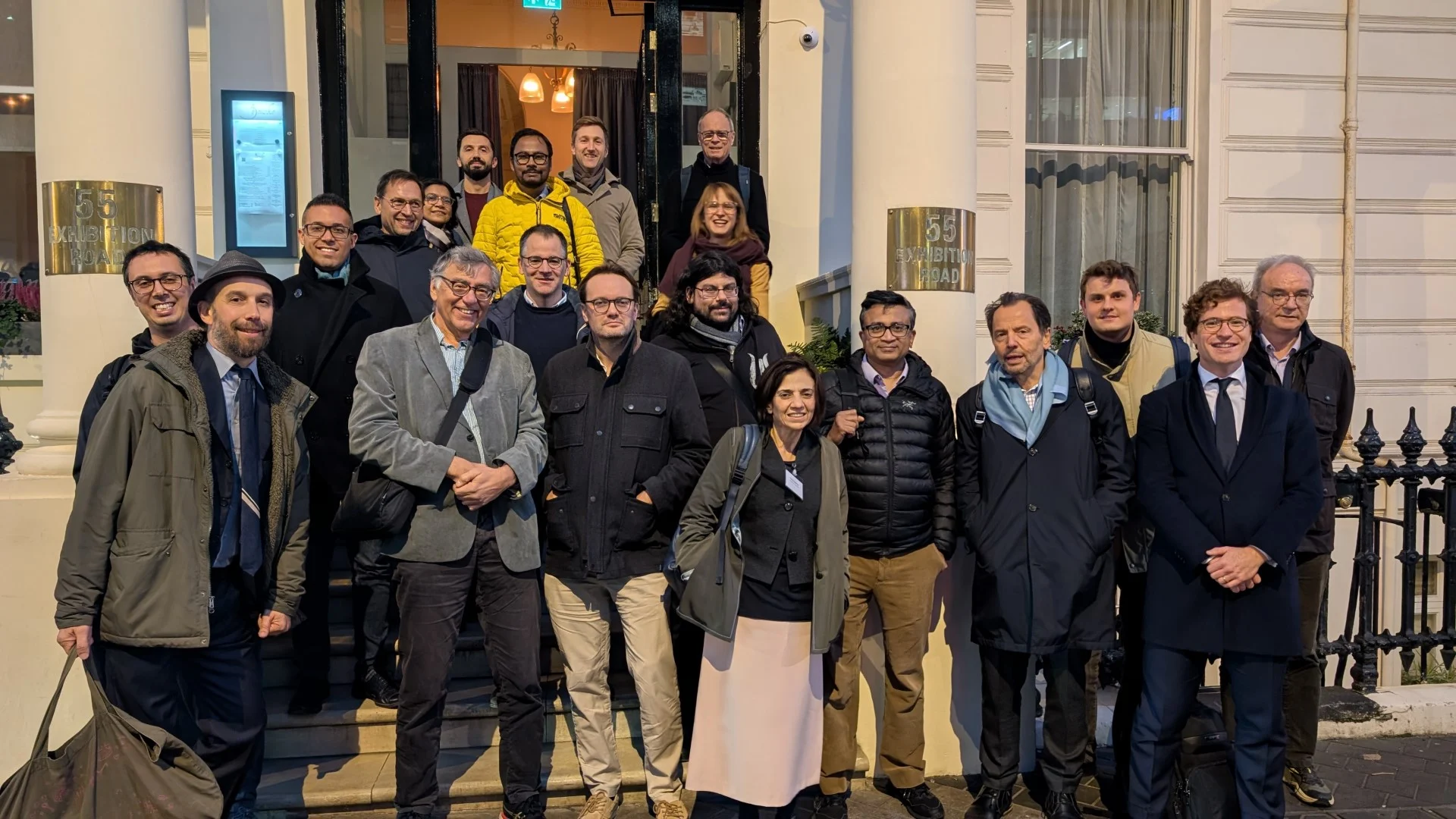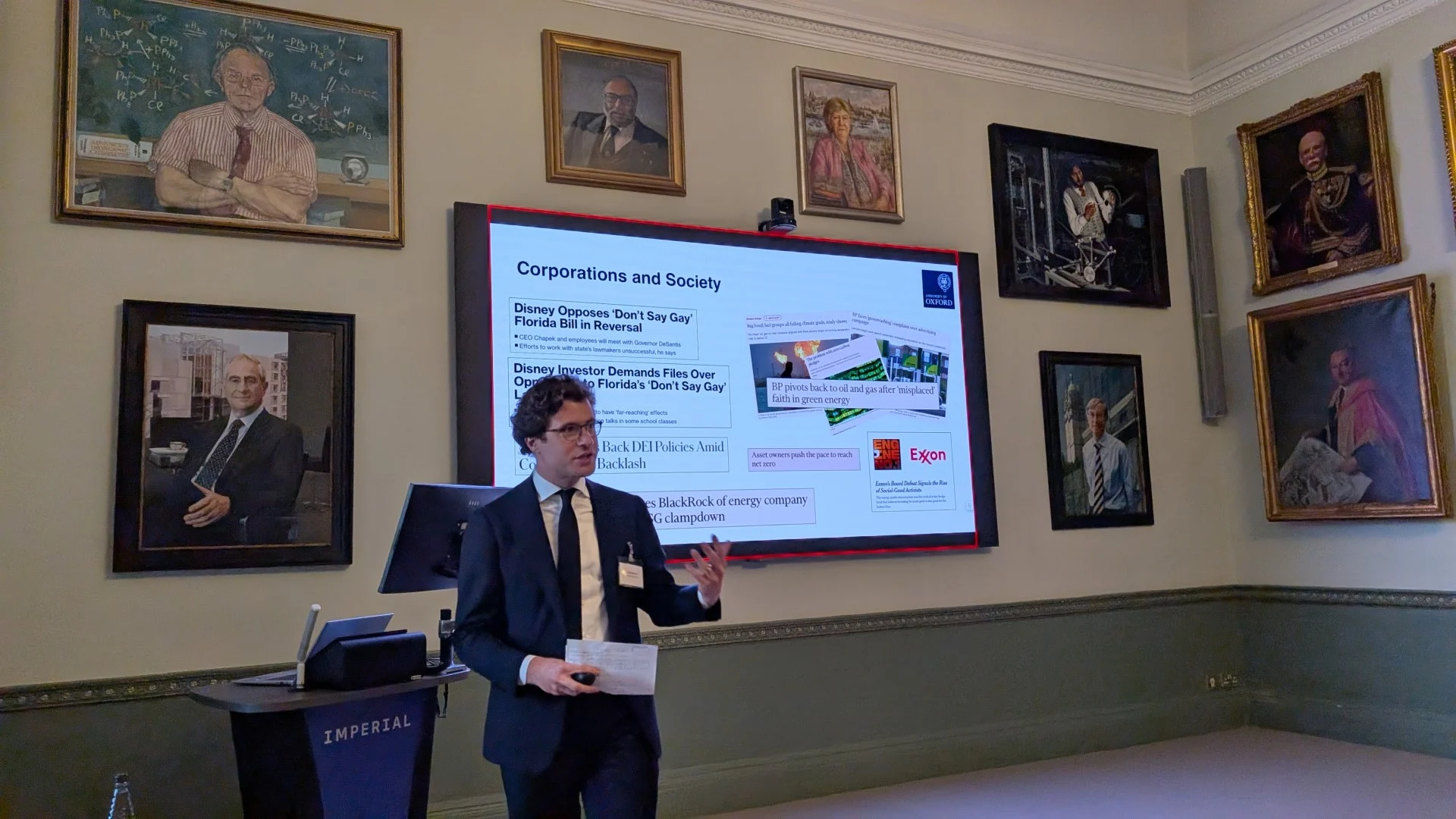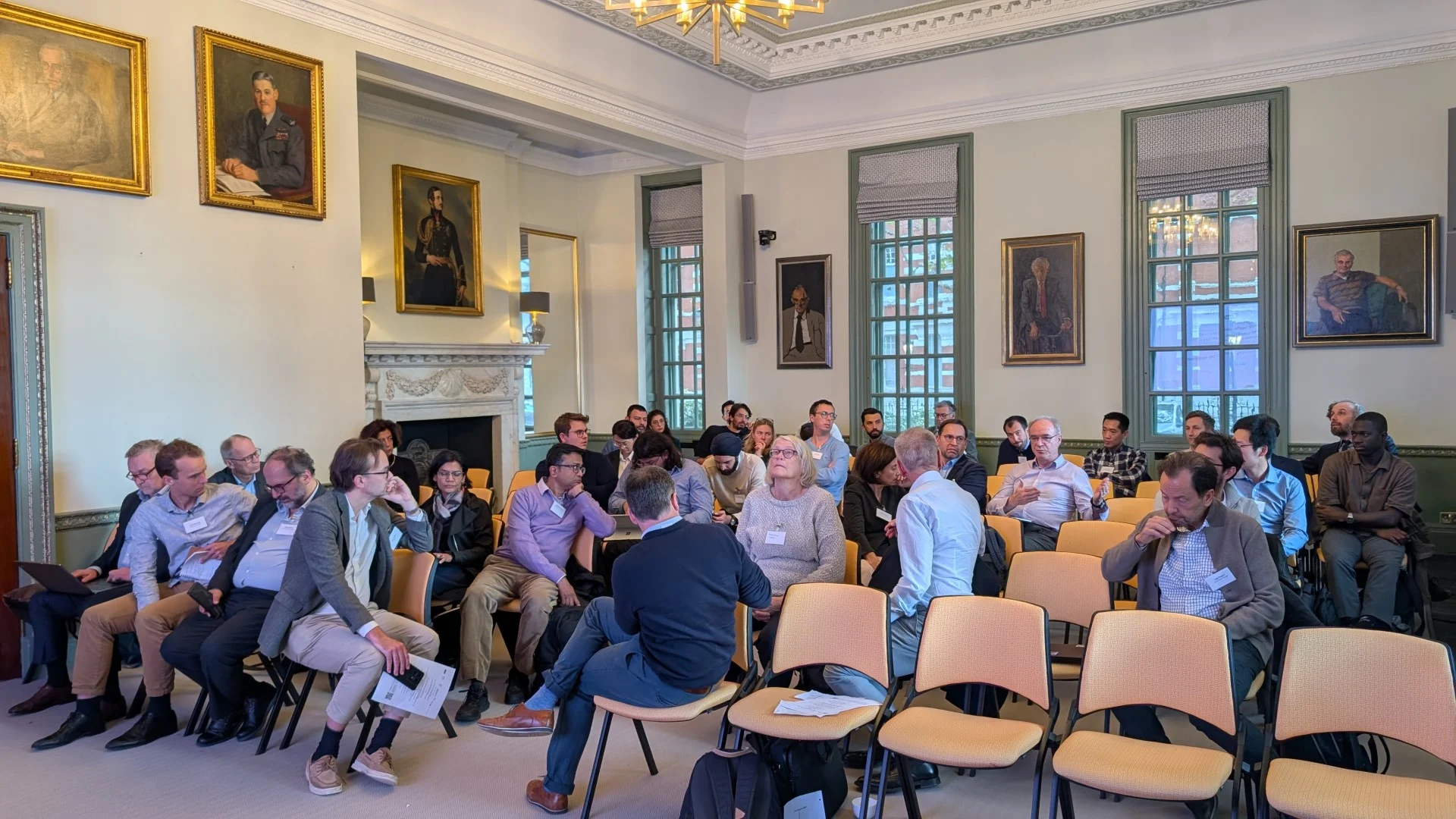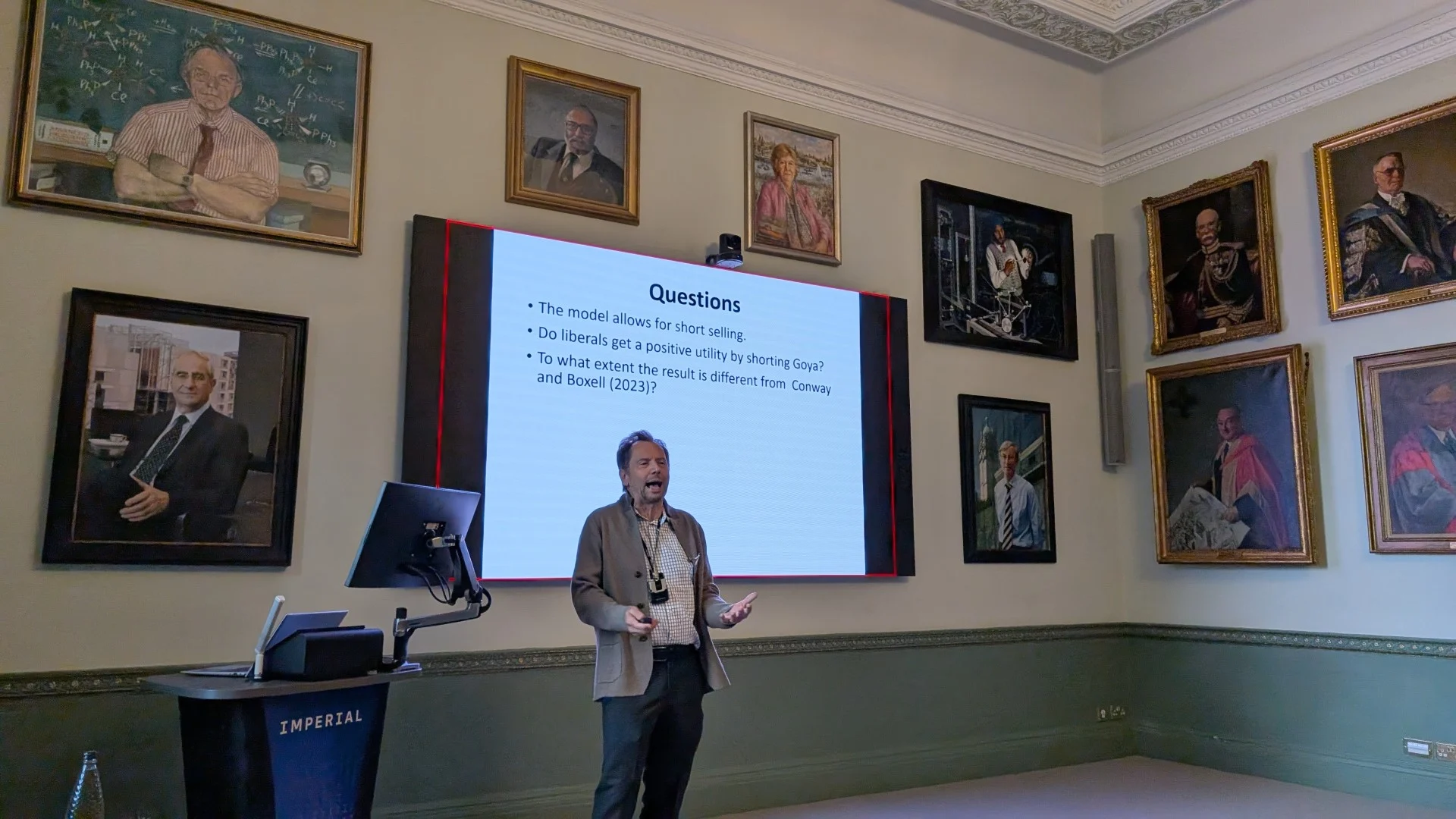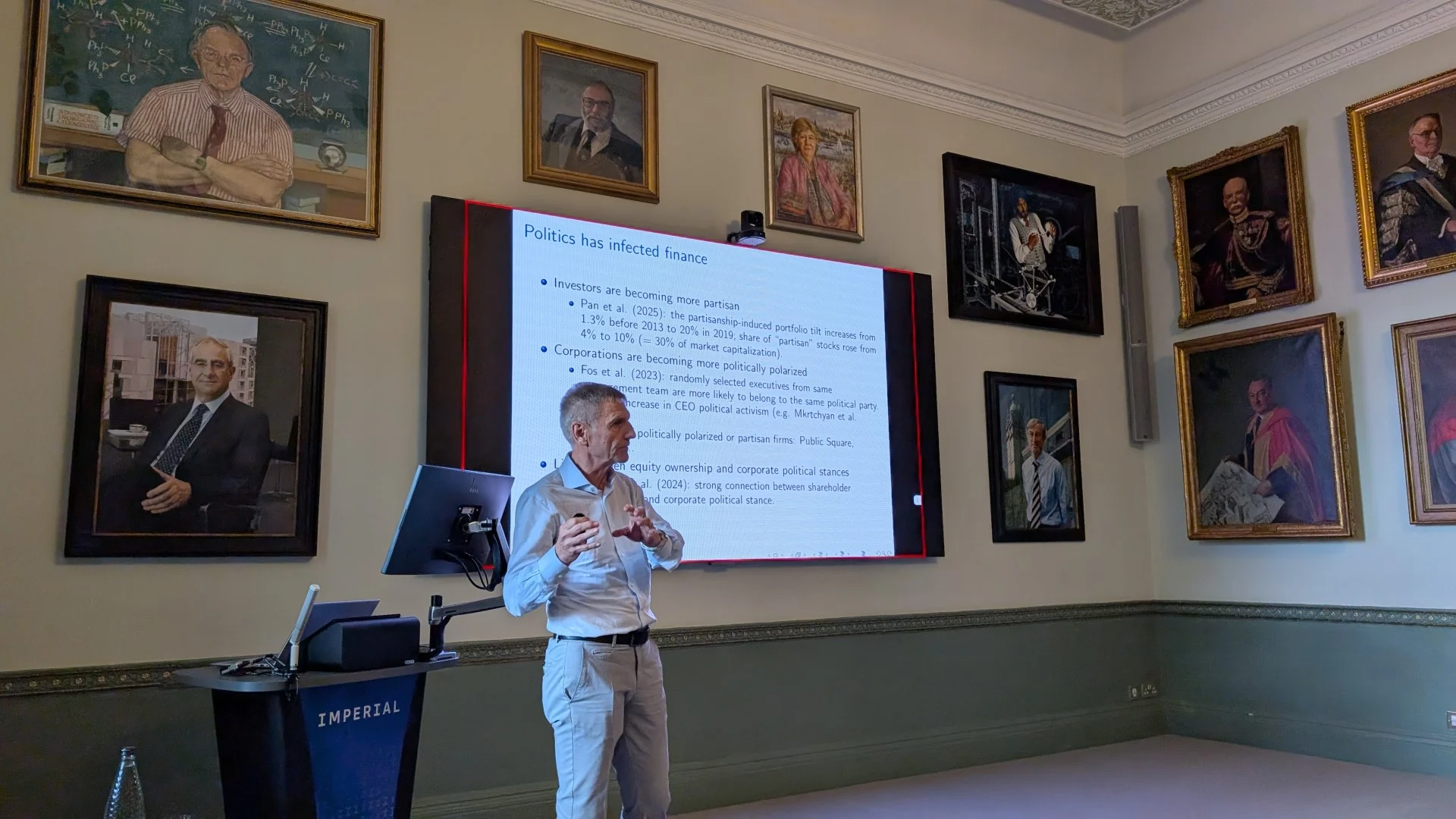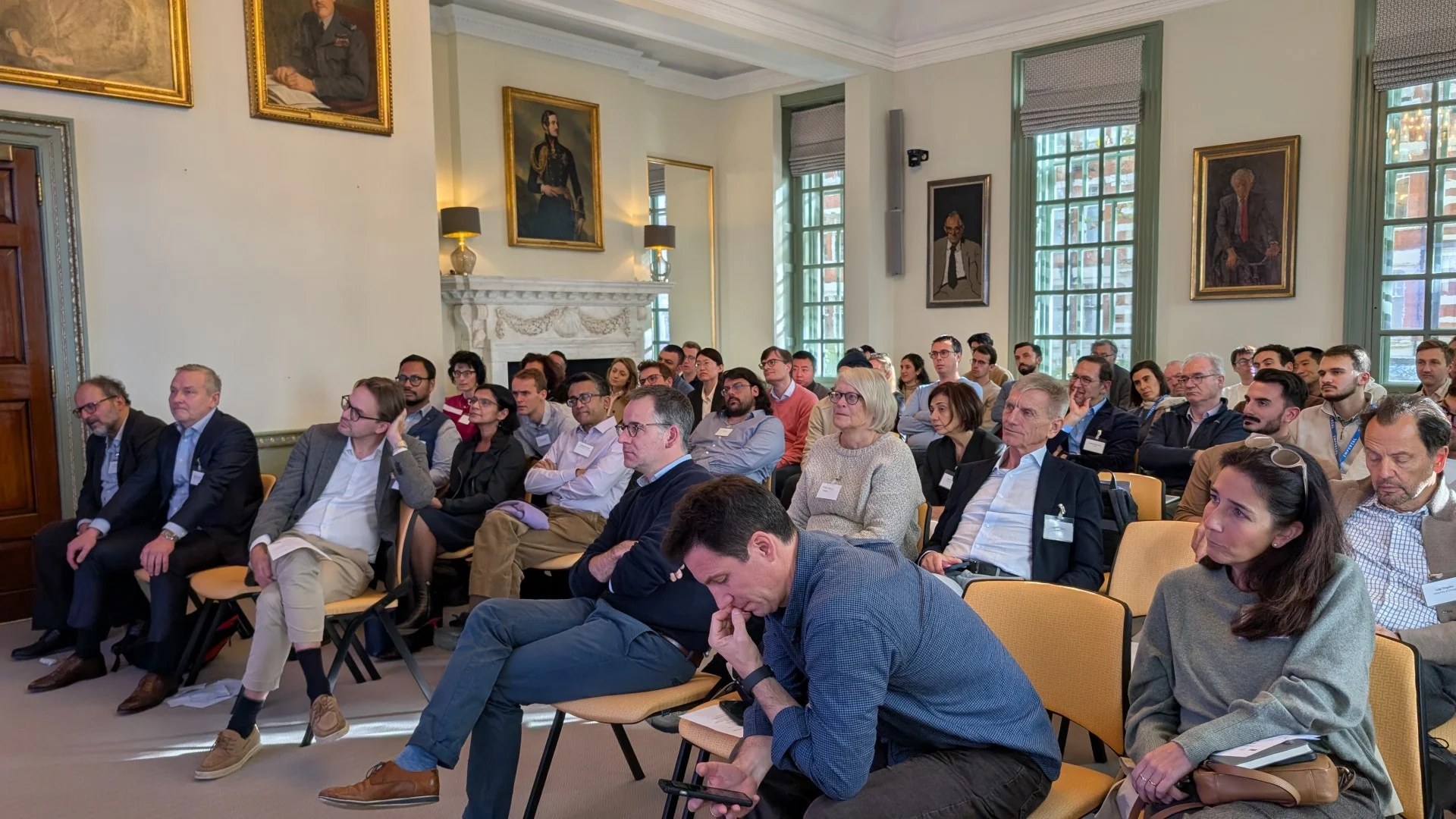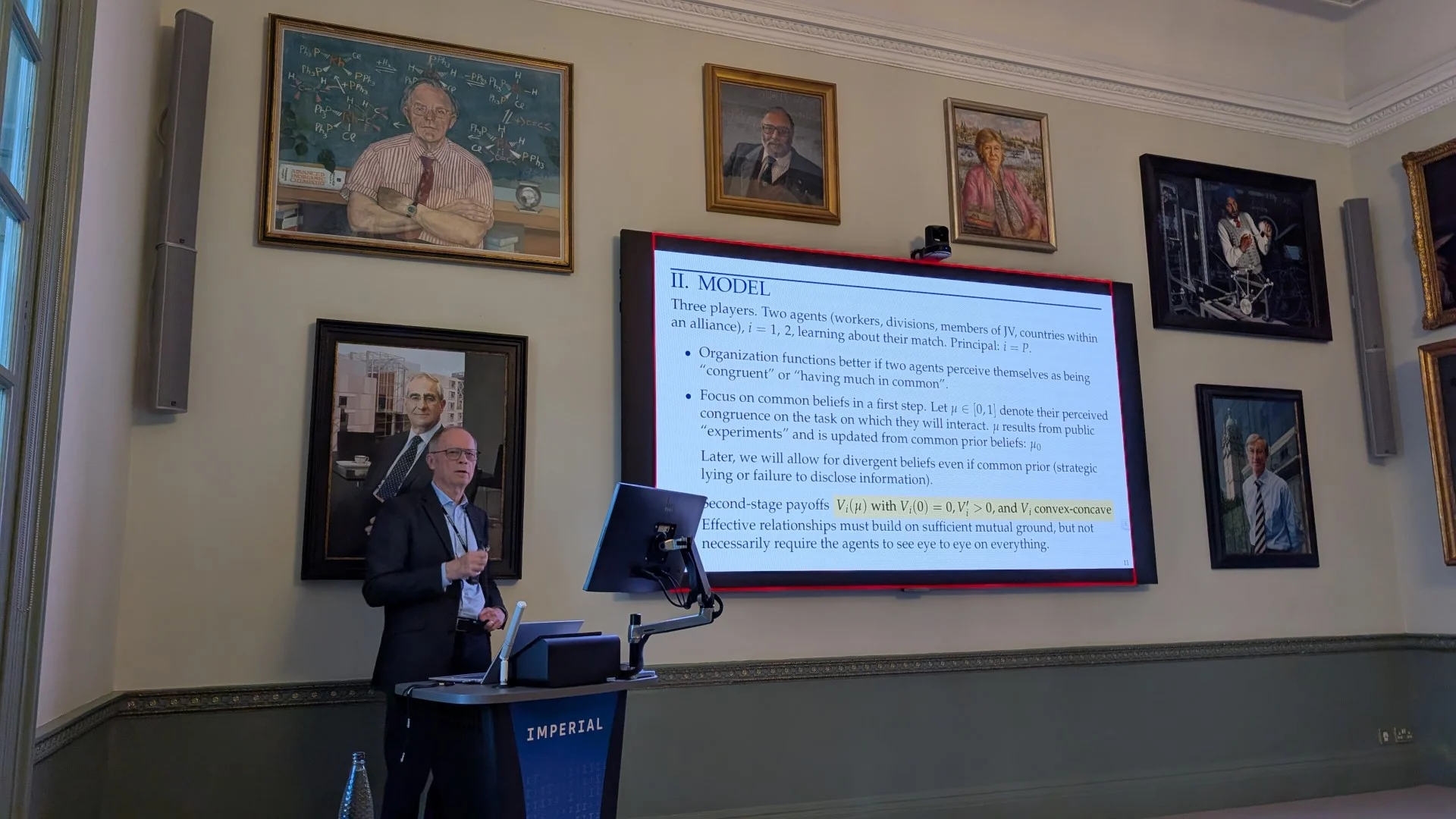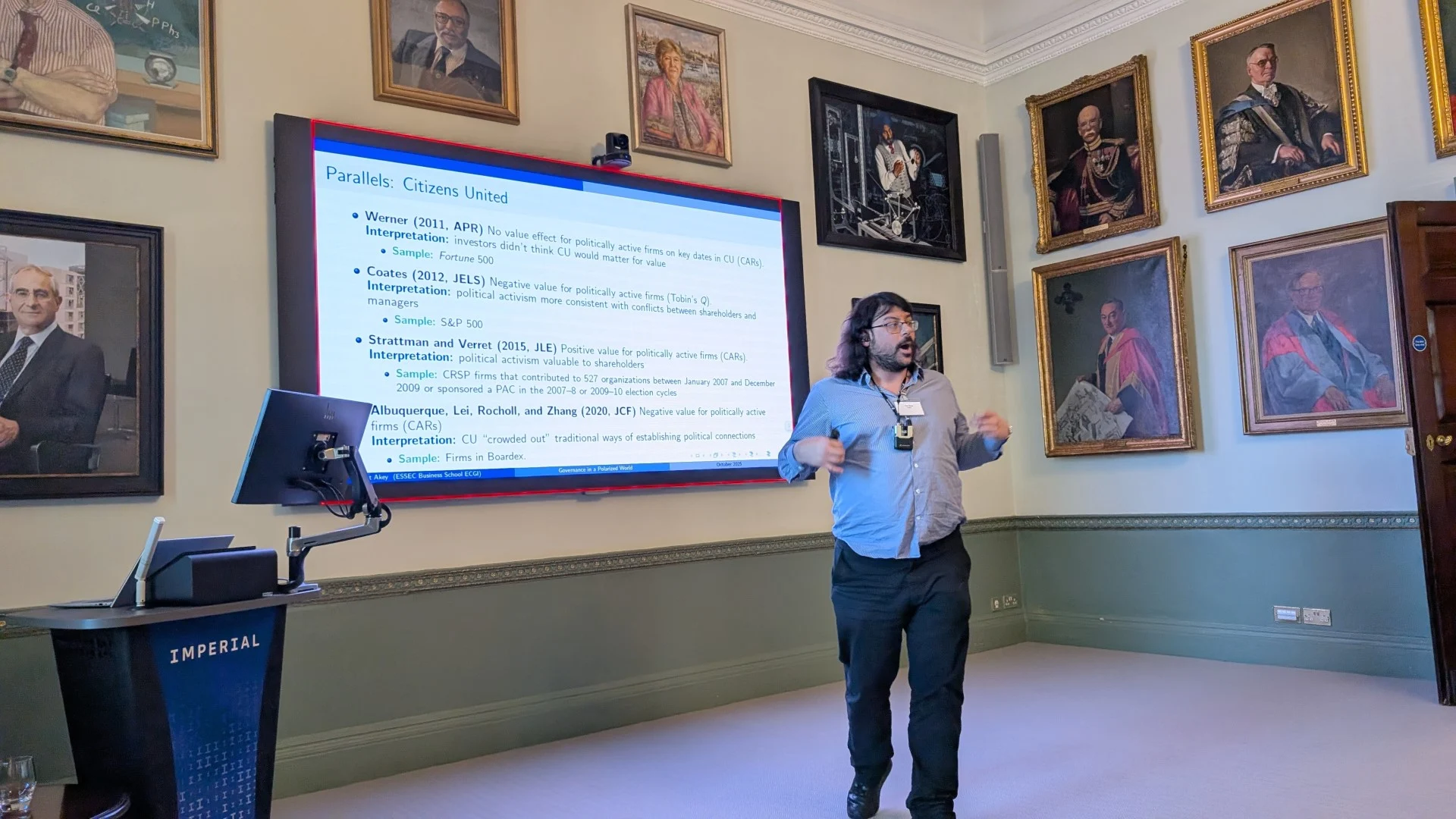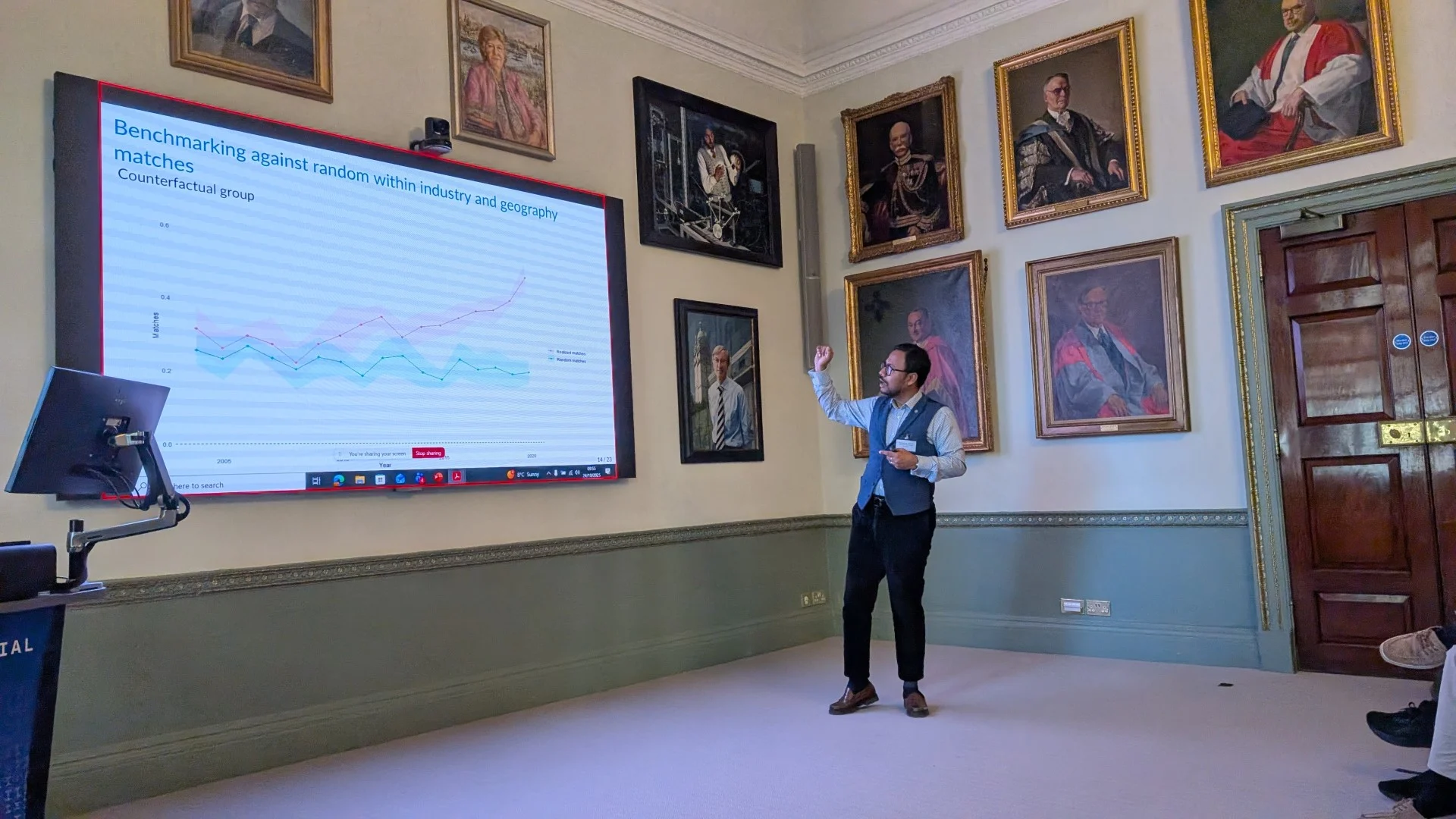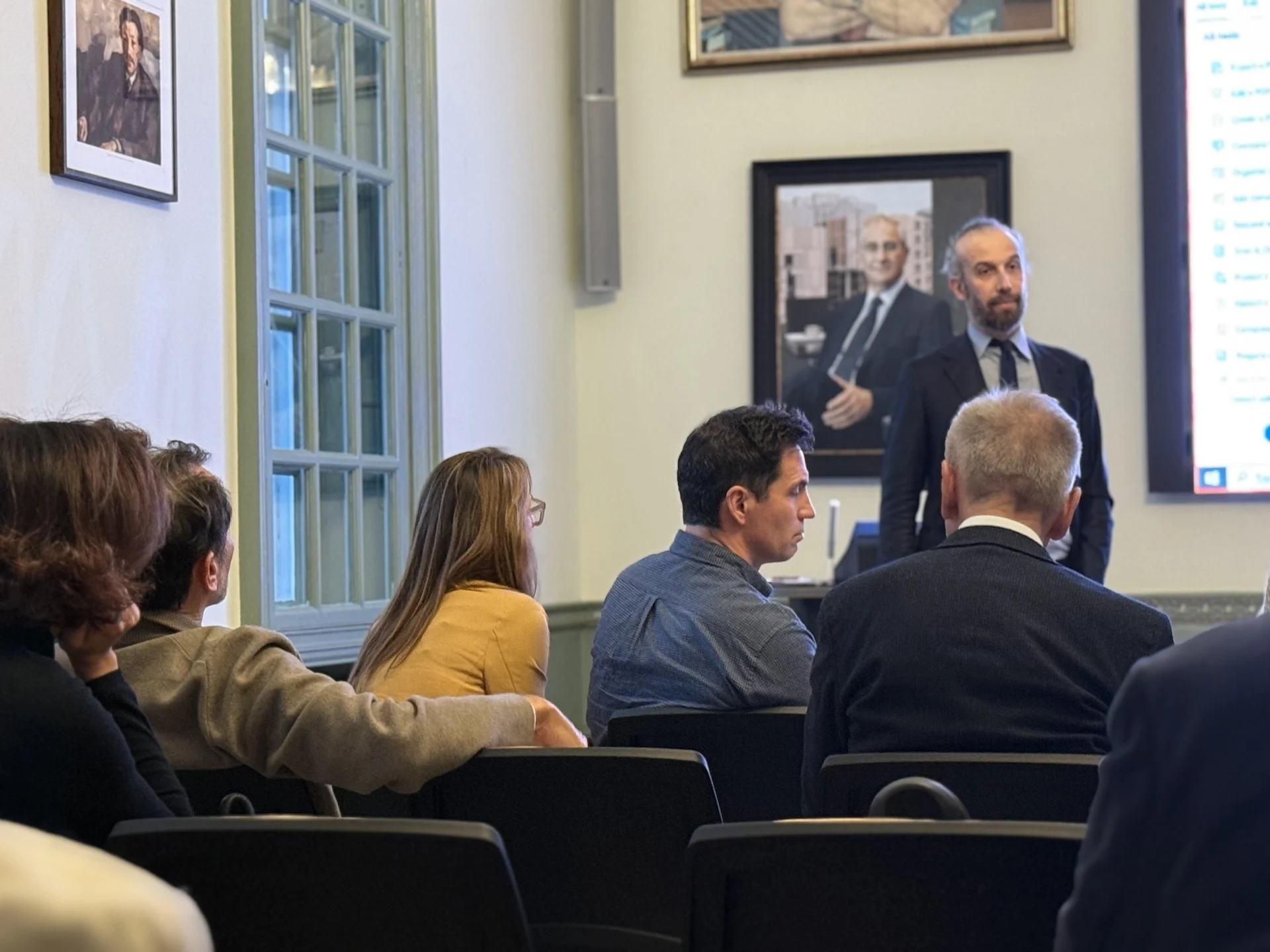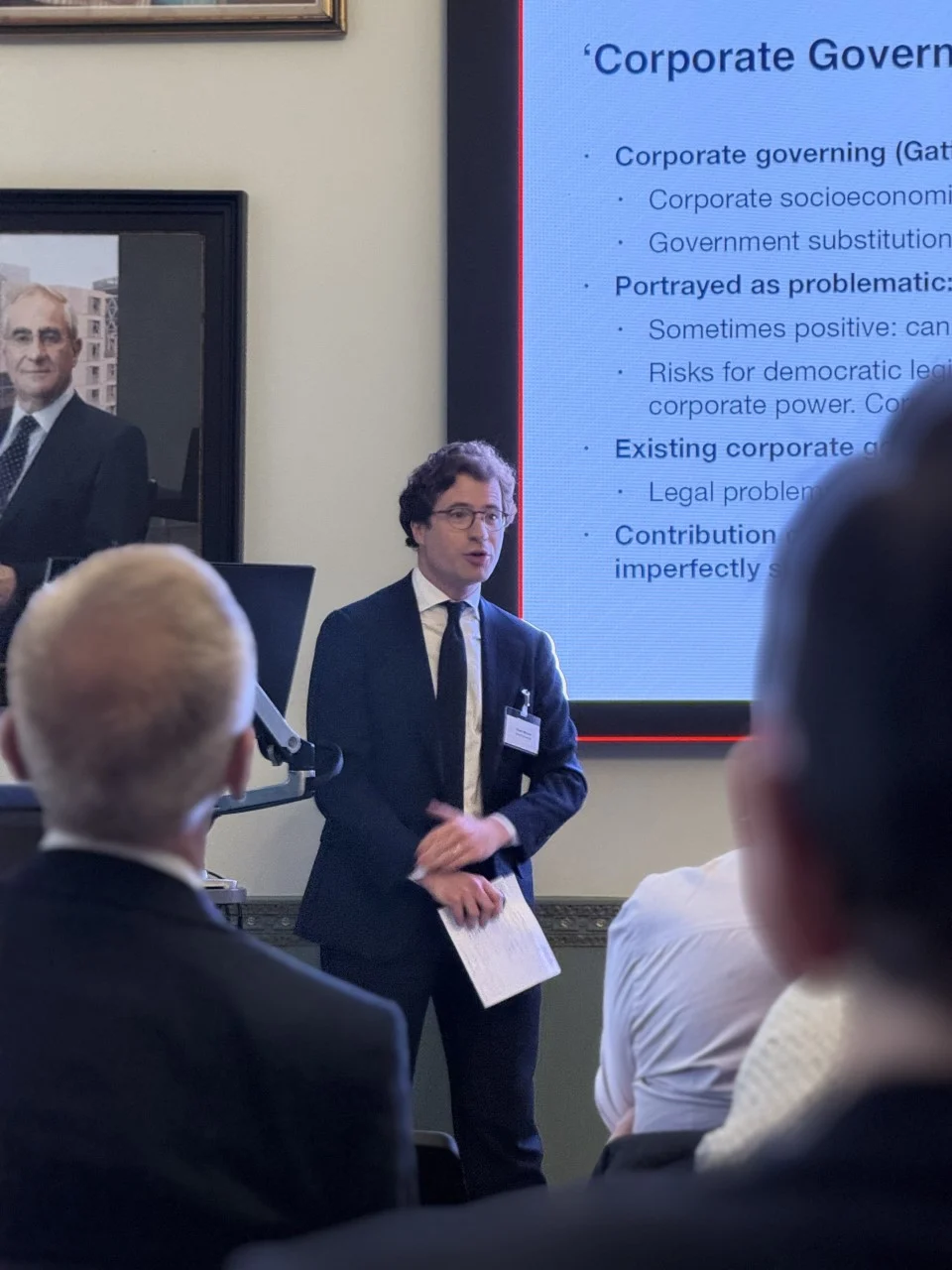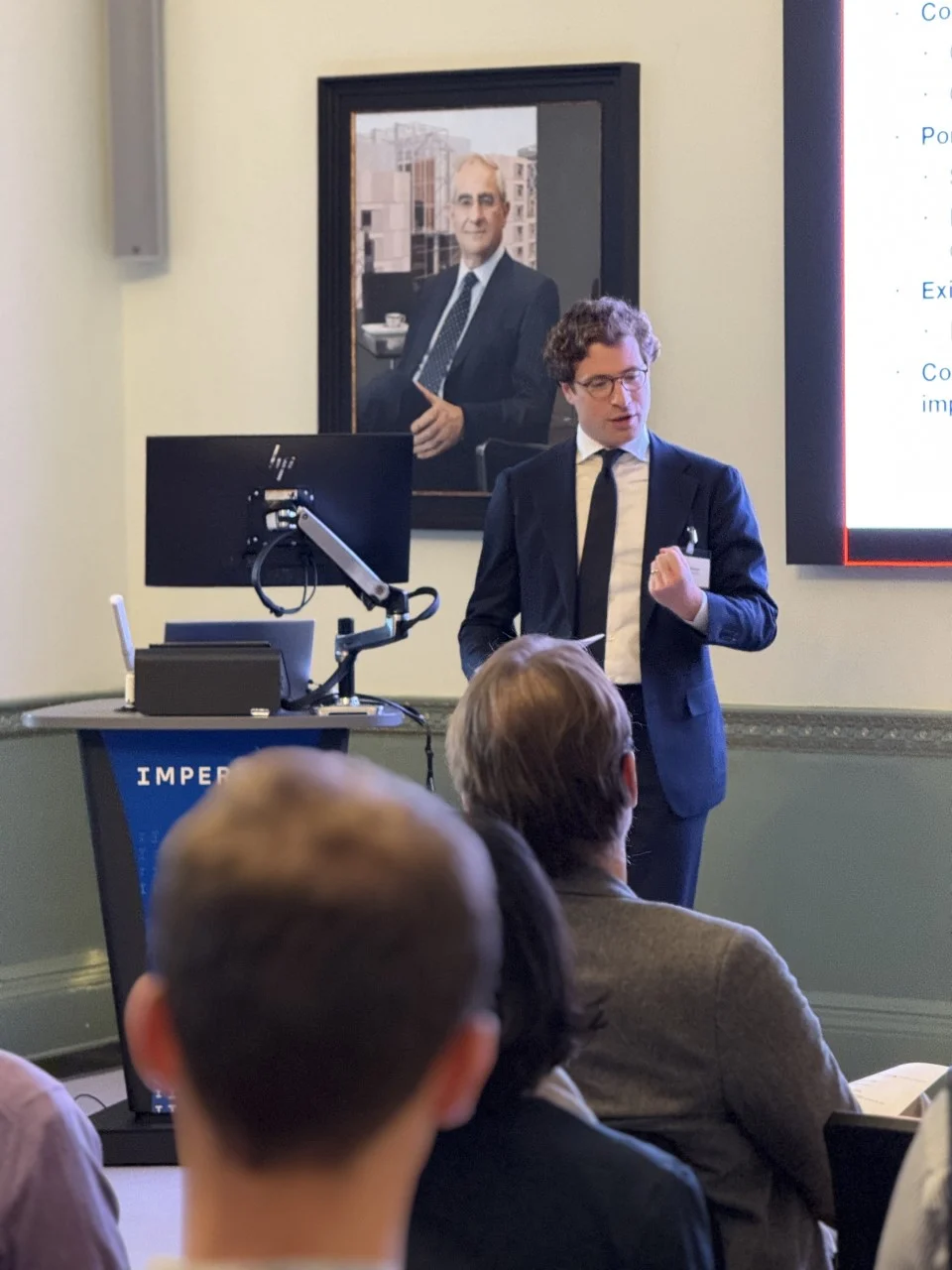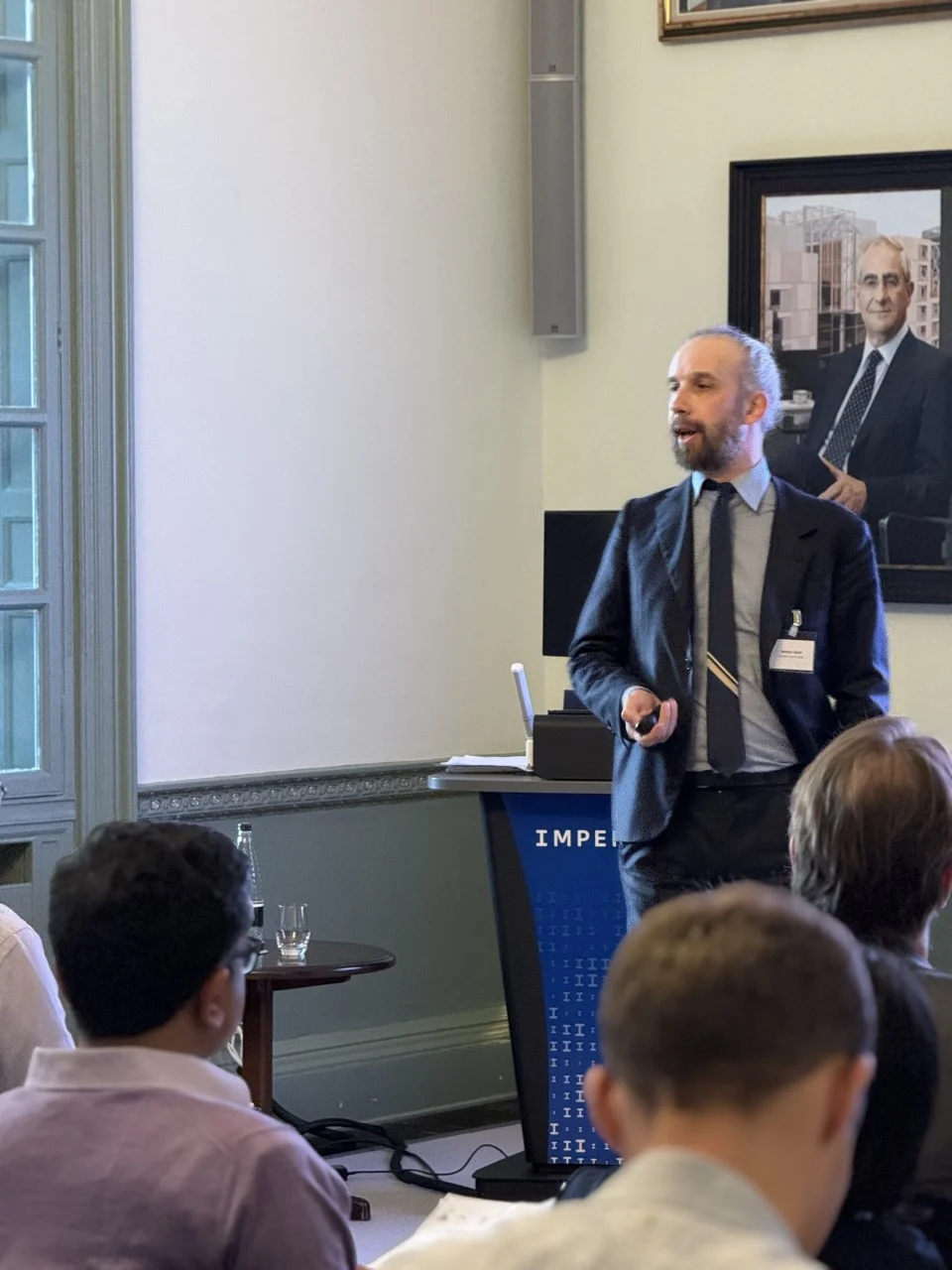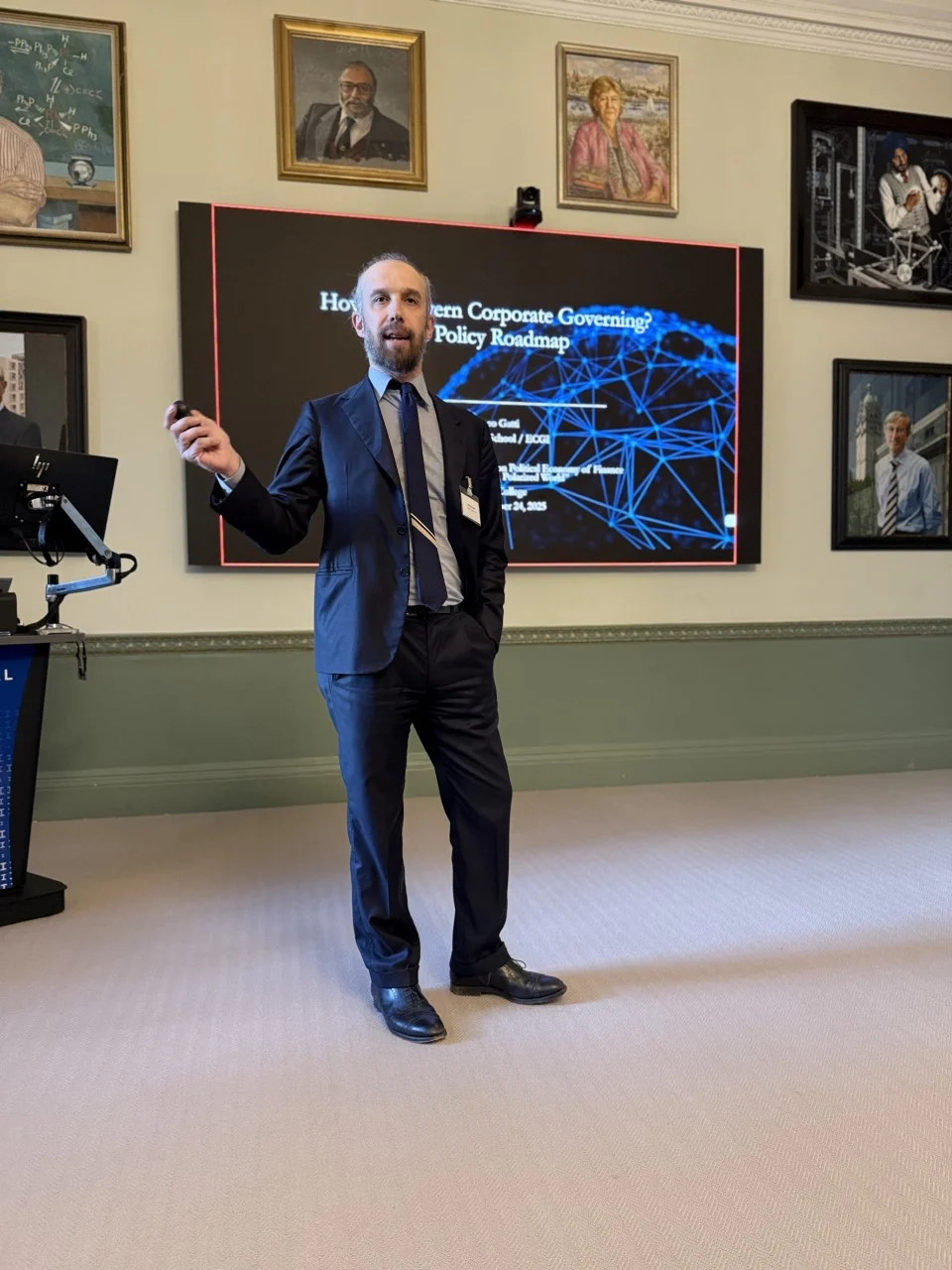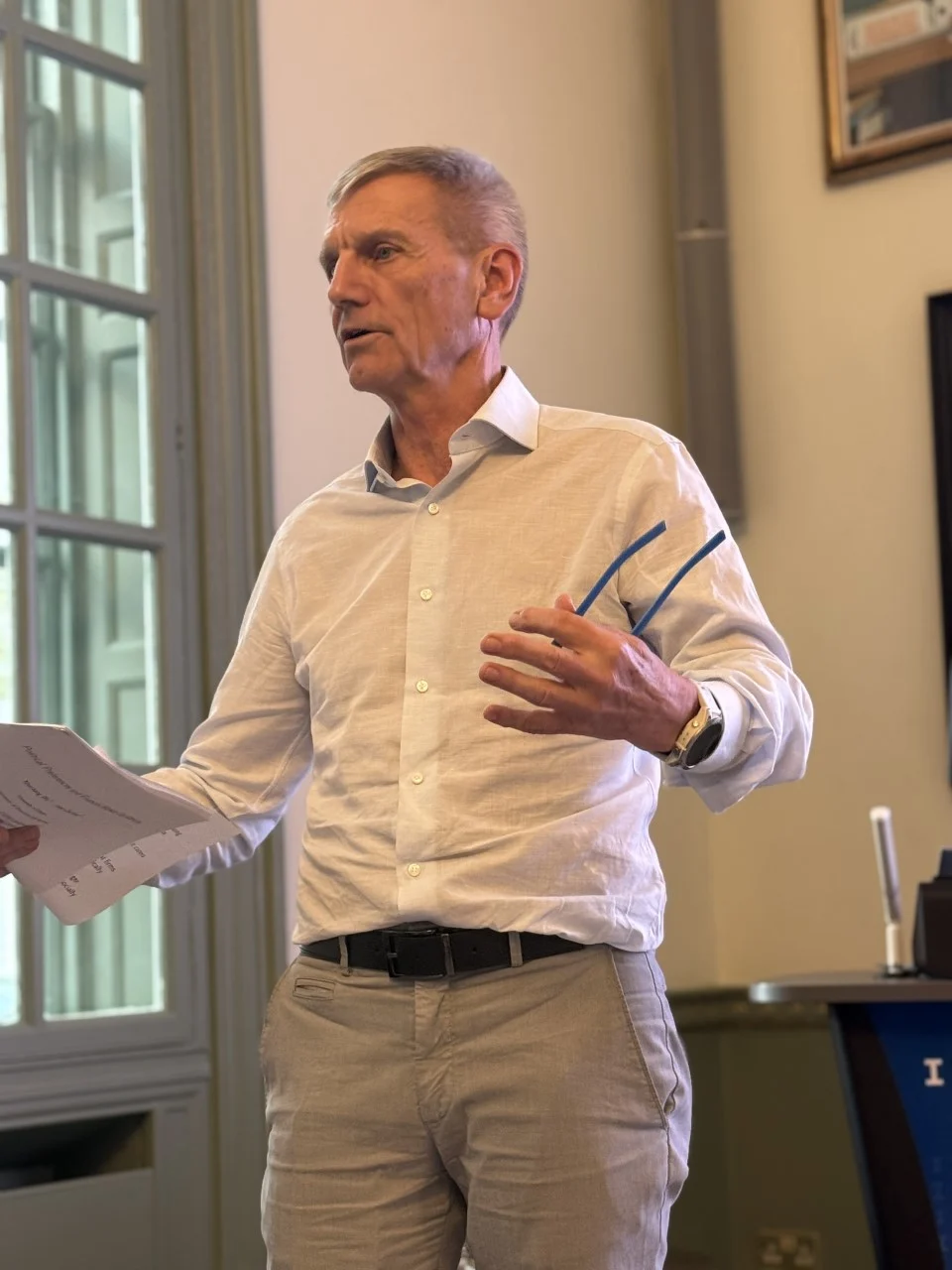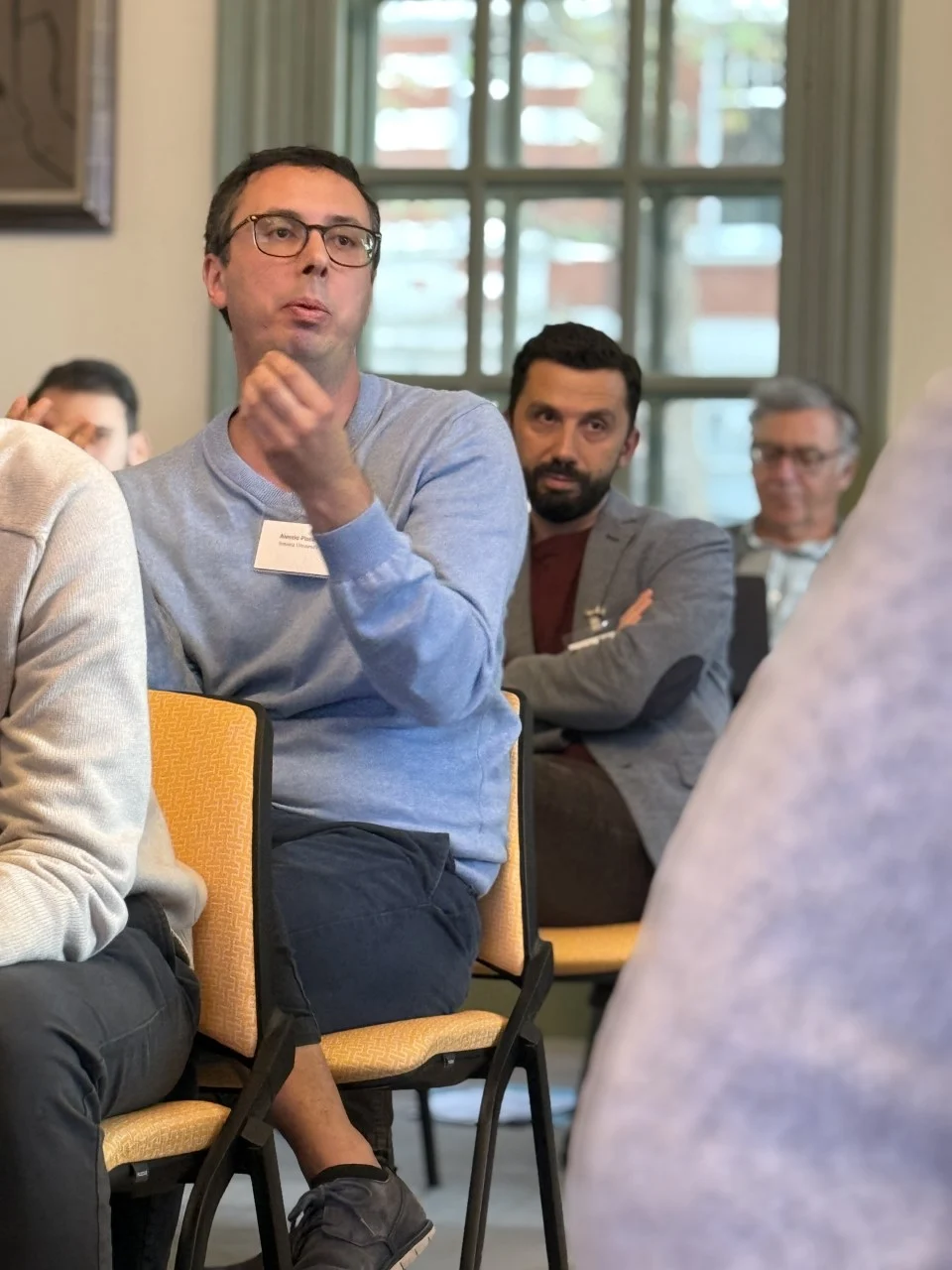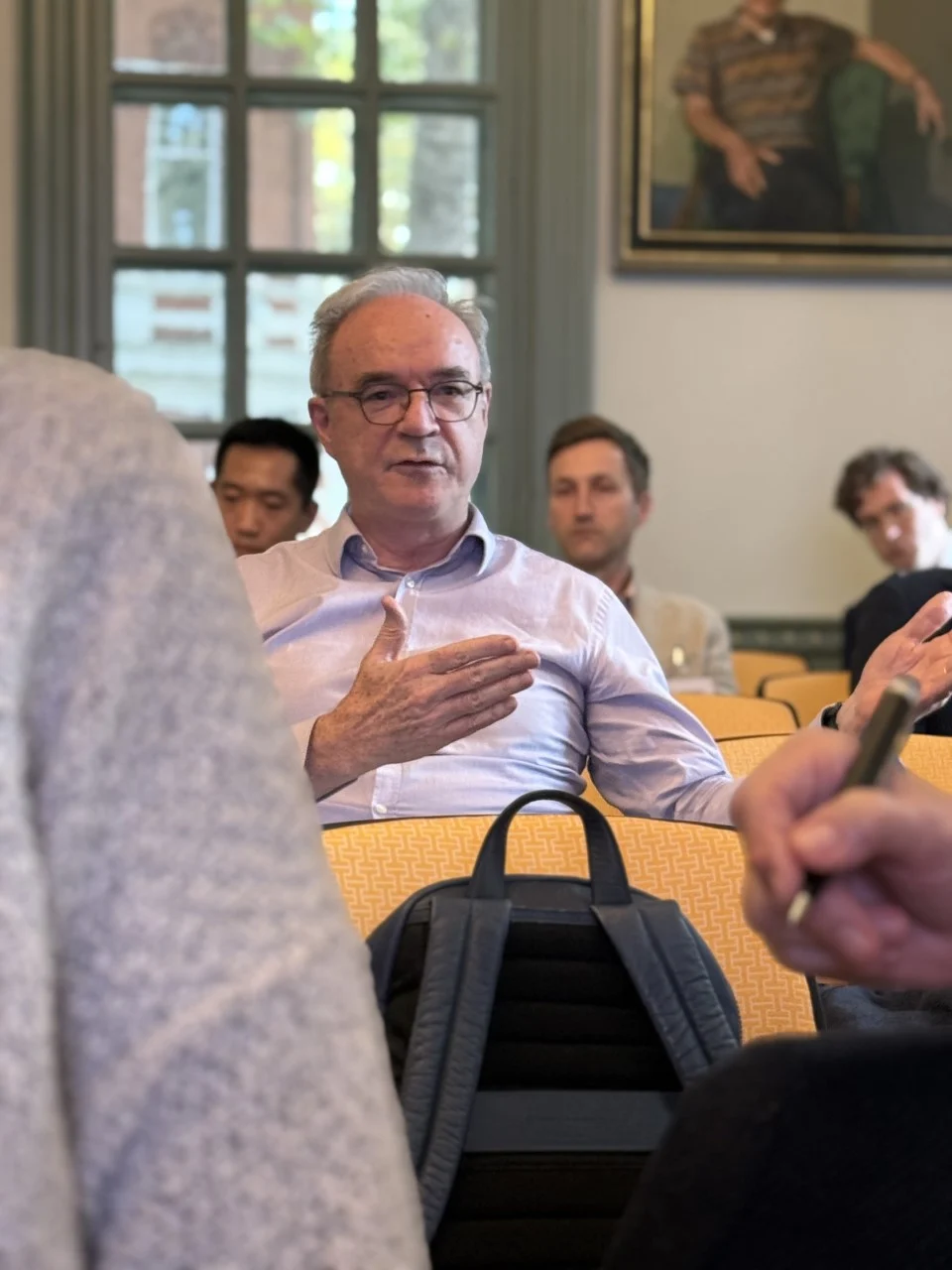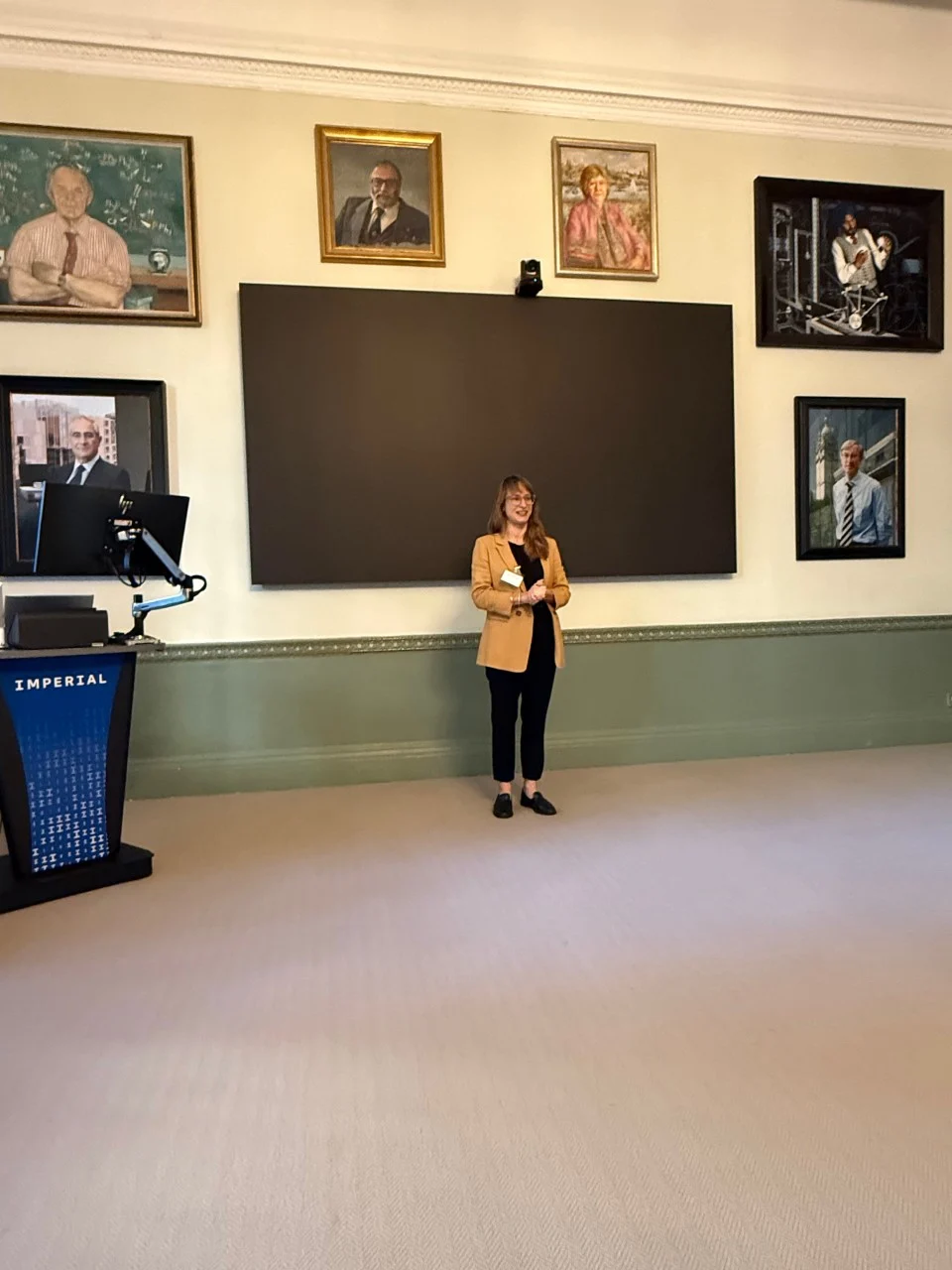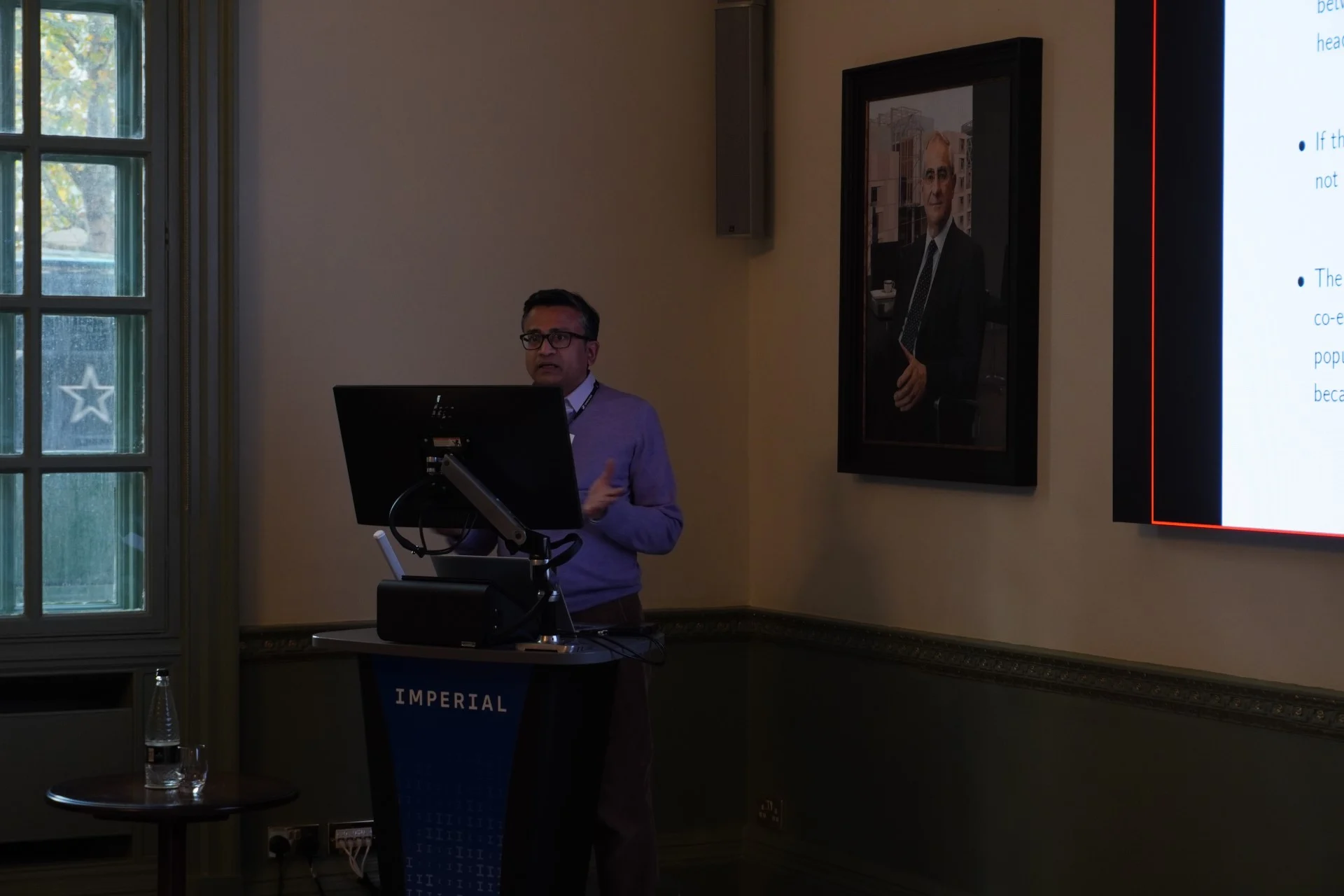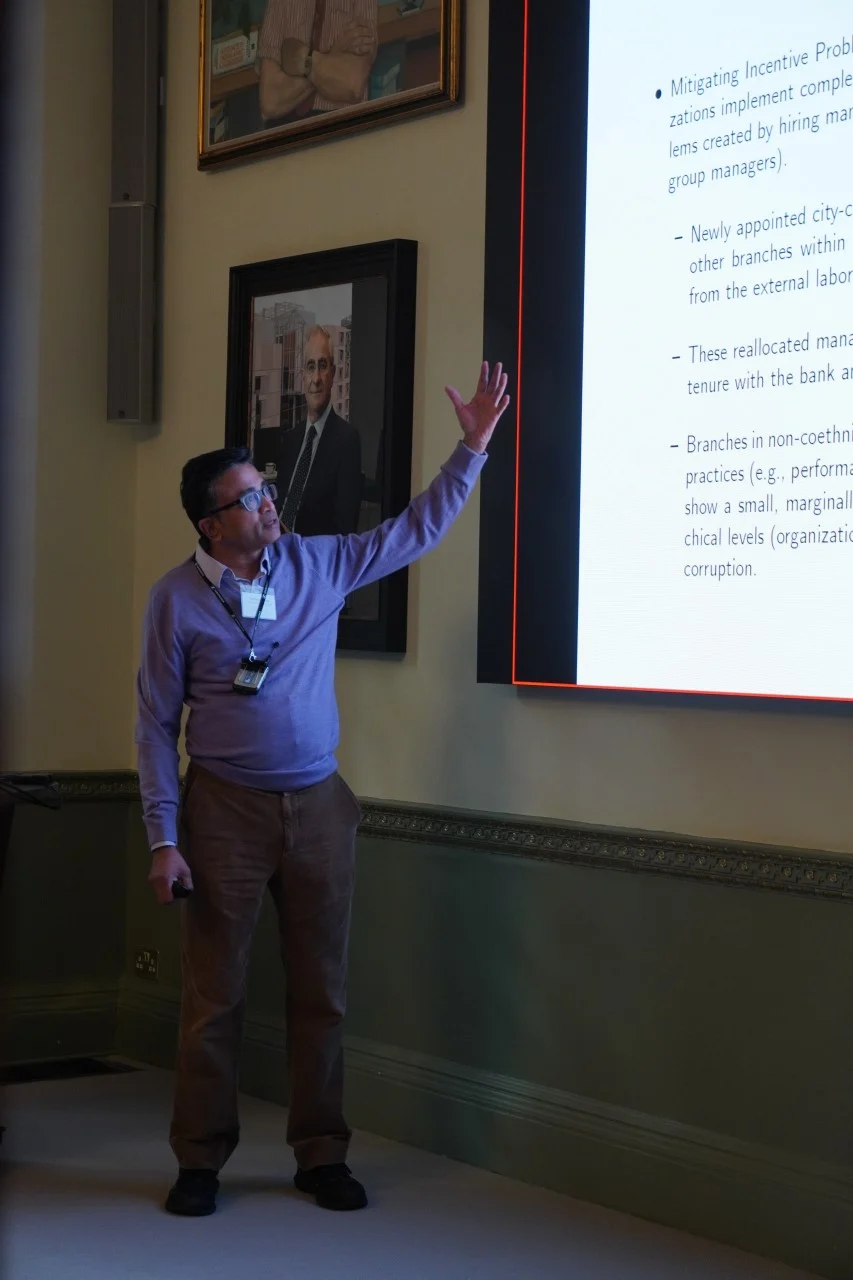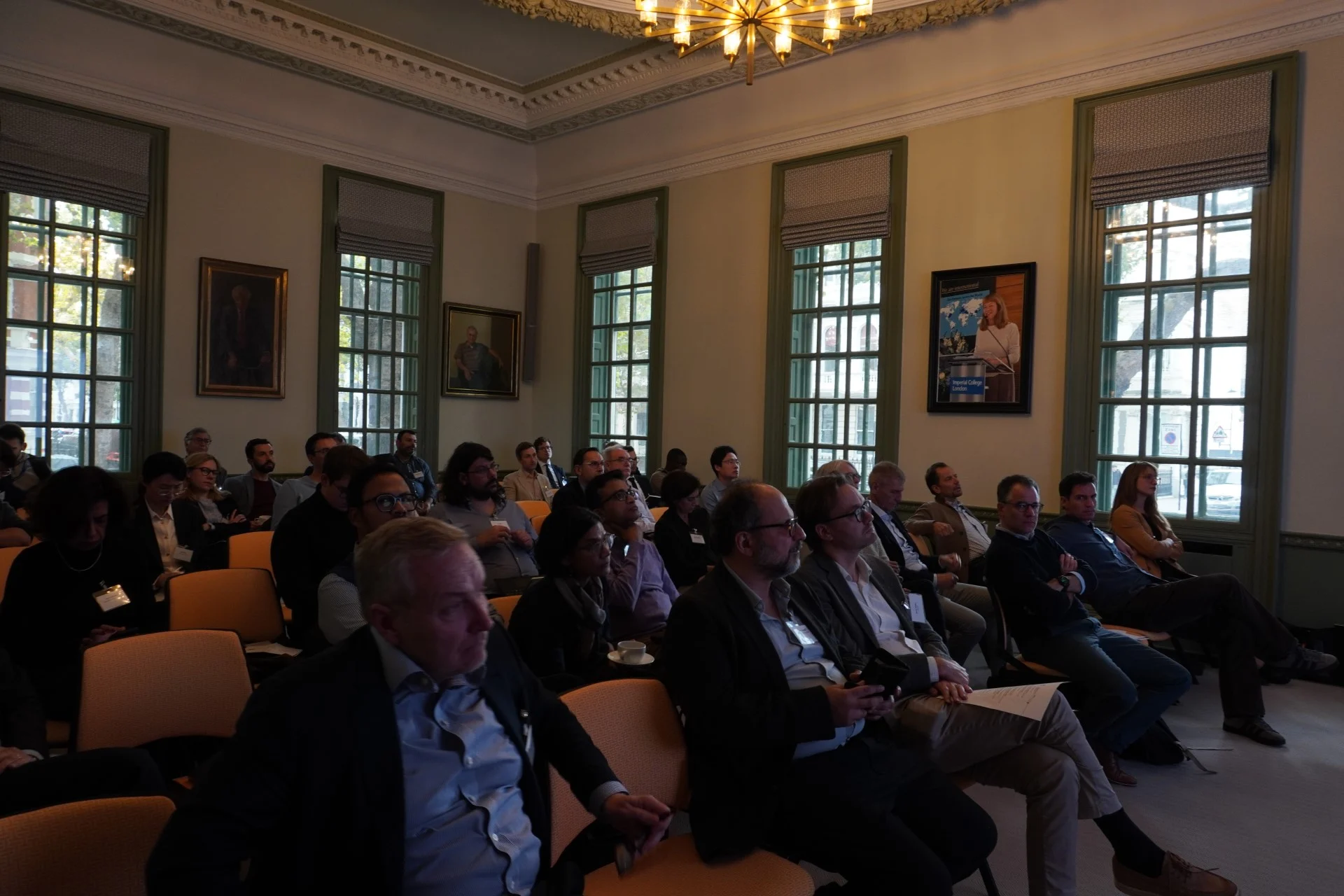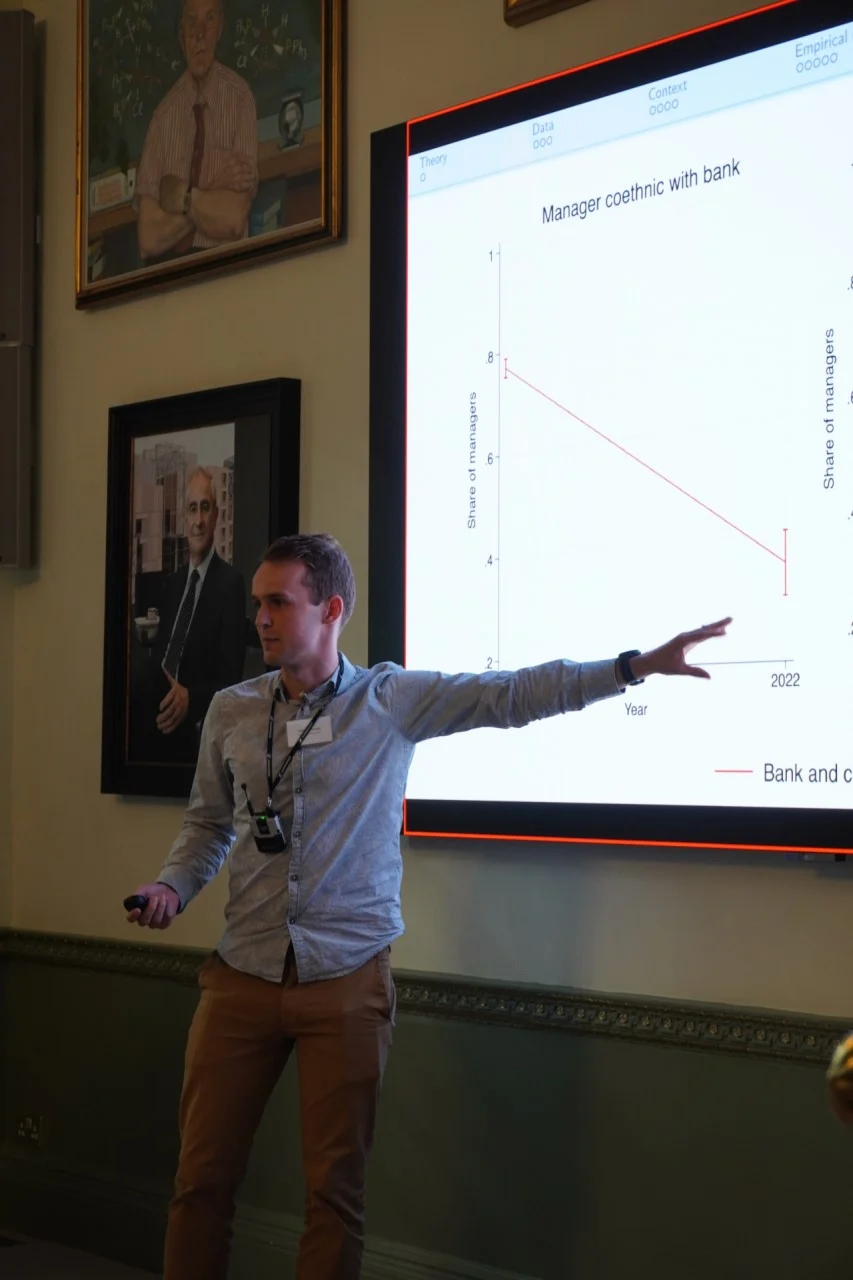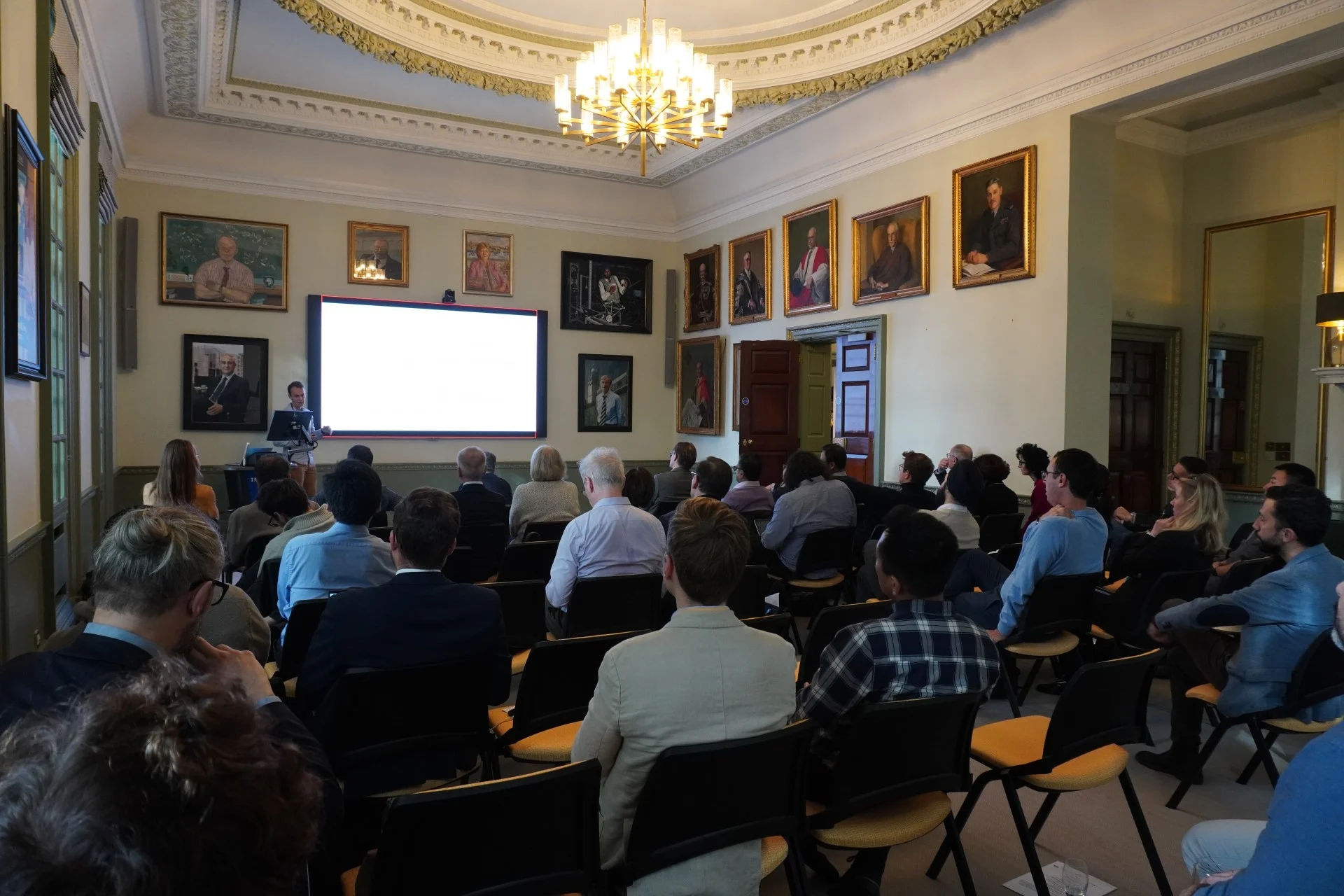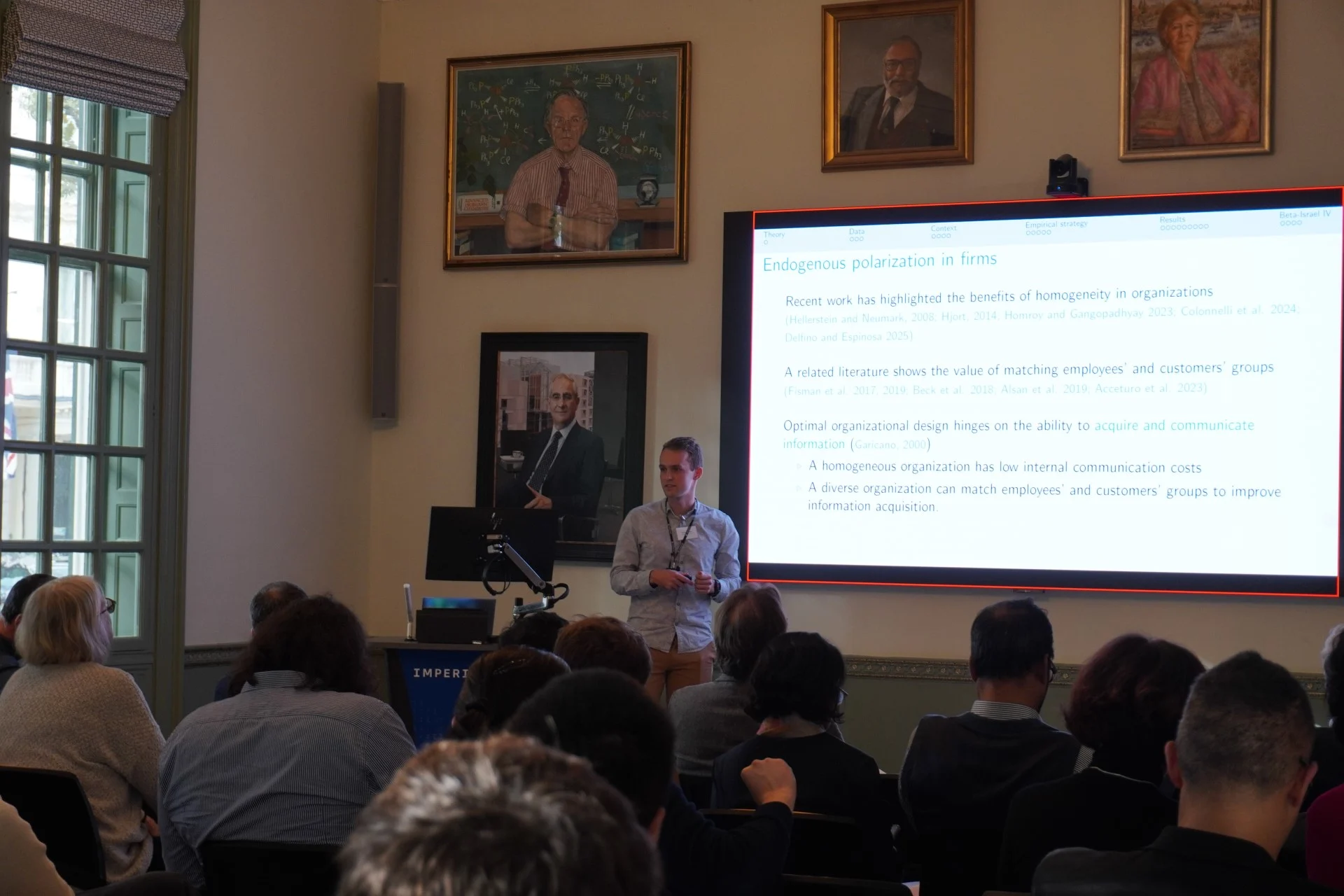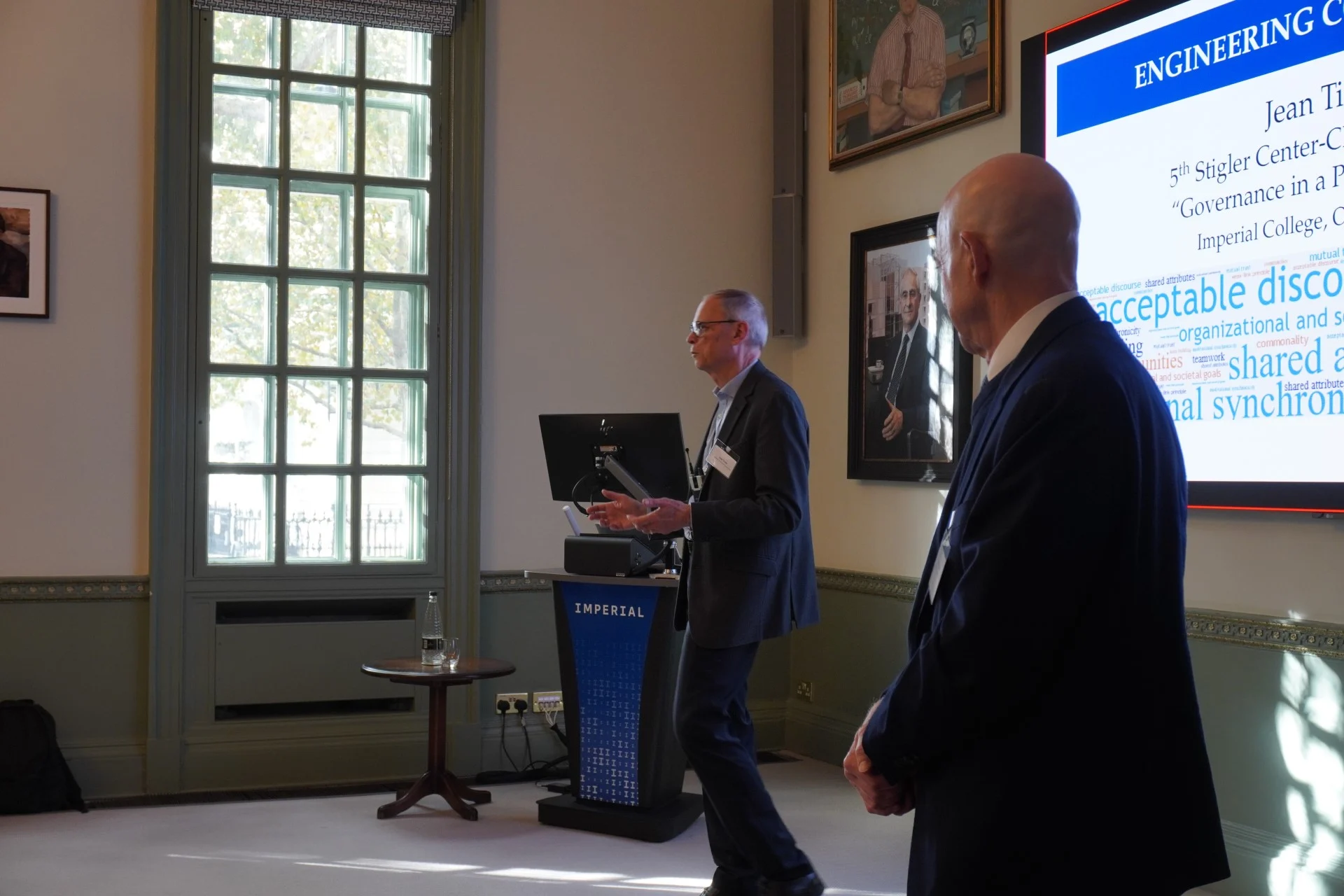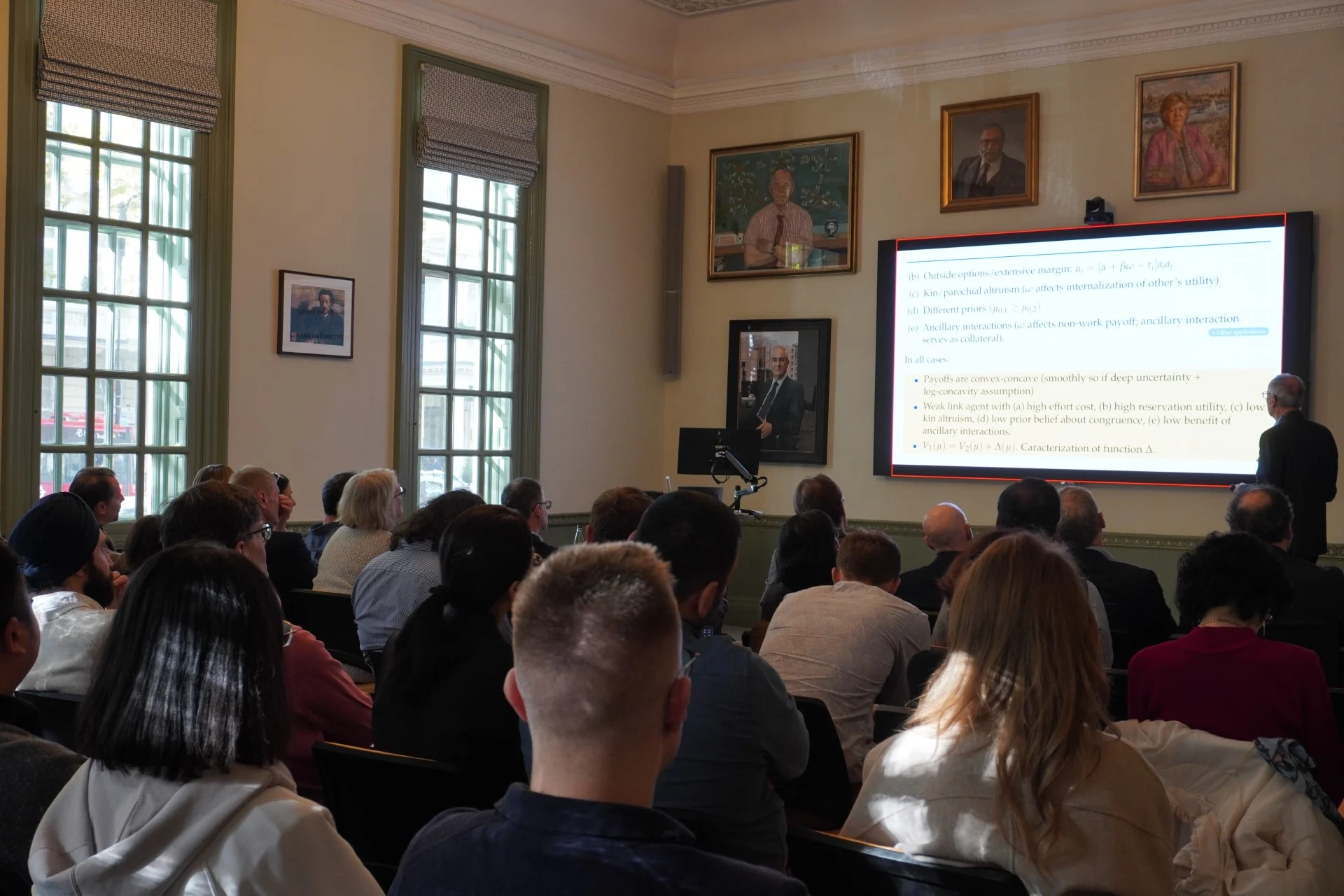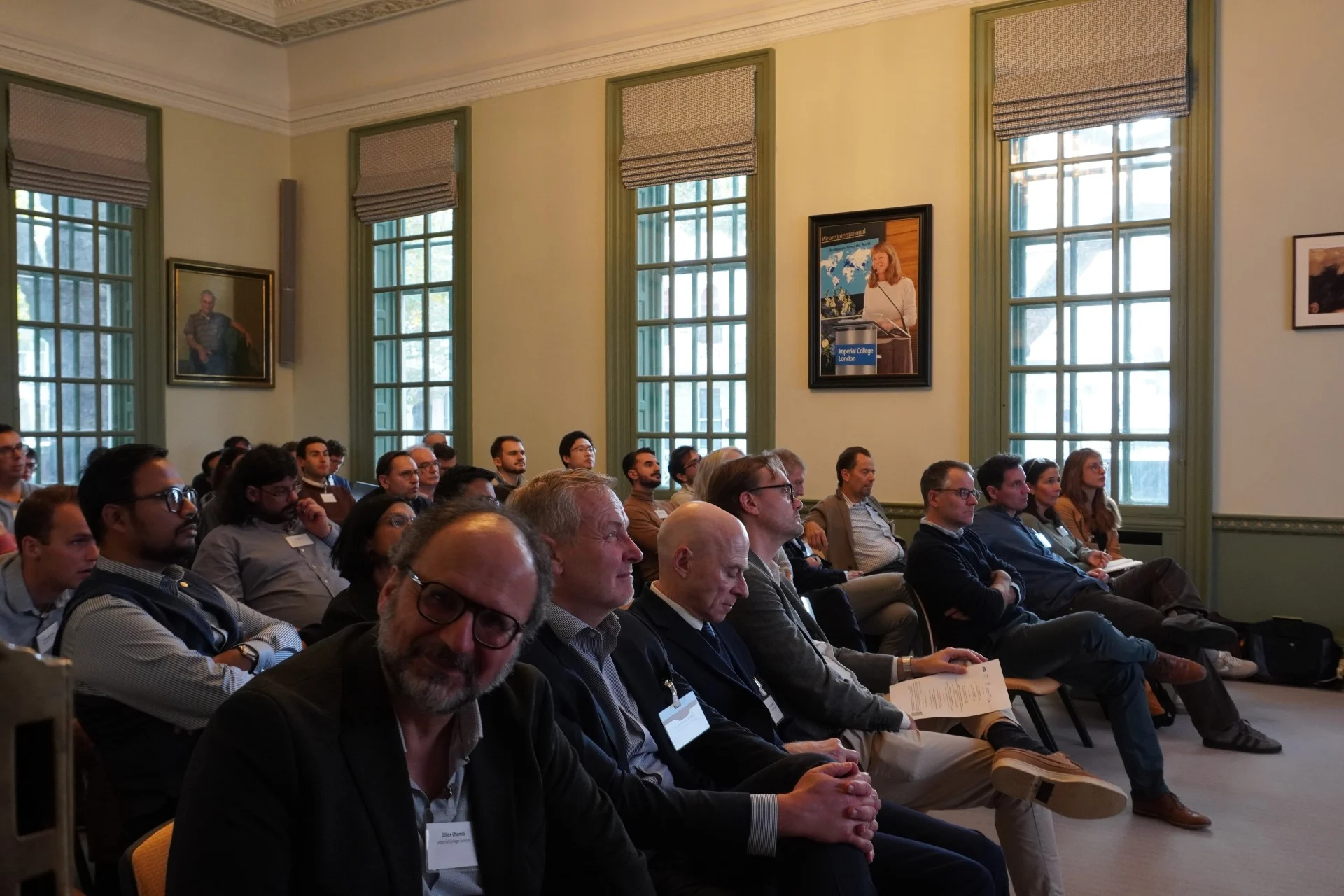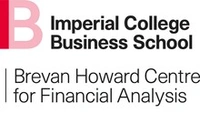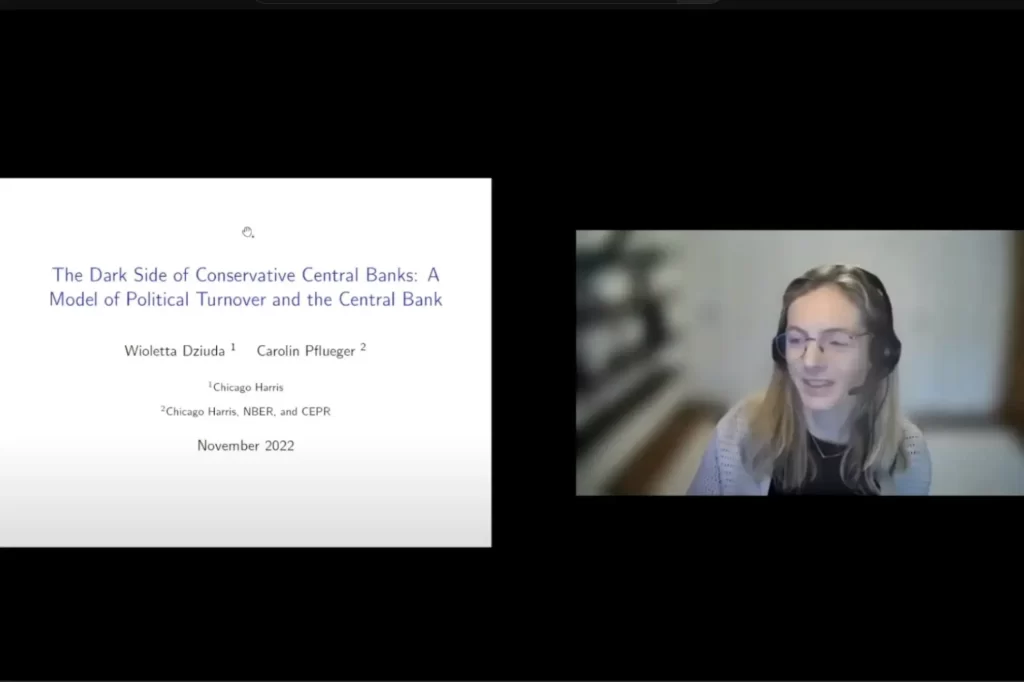Stigler Center-CEPR Conference Series
on the Political Economy of Finance
PolEconFin jointly organizes with the Stiger Center at the University of Chicago and the Centre for Economic Policy Research (CEPR) a conference series on the Political Economy of Finance. The objective is to promote research on this highly topical area, usually treated separately in economics and finance, and build a community of researchers active in political economy of finance.
This conference series is held annually and alternates between Europe and the United States. The conference hosts a limited number of paper presentations with designated discussants and ample opportunity for discussion and interaction. Each edition of the conference focuses on a specific theme.
Date: Friday 24 October 2025
Venue: Imperial College London, the UK
Invitation request: click here
More information about the conference here
October 24, 2025
8:30 – 9:00
Welcome
9:00 – 10:30
Polarized Consumers & Suppliers
Chair: Tommaso Valetti (Imperial College London & CEPR)
Do Consumers Spend Their Money Where Their Votes Are? Ideology Distance and Local Sales
Lei Chen (University of Melbourne), Muhan Hu (University of Strathclyde), Linxiang Ma (University of Strathclyde), and Xiaoke Ye (University of Liverpool)
Discussant: Cláudia Custódio (Imperial College London & CEPR)
Politically Polarized Supply Chains
Nandini Gupta (Indiana University), Swarnodeep Homroy (University of Groningen)
Discussant: Emilio Bisetti (HKUST)
10:30 – 11:00
Break
11:00 – 12:30
Electoral Politics & Finance
Chair: Enrico Perotti (University of Amsterdam & CEPR)
Firms as Electoral Monopsonies
Carlos F. Avenancio-León (UC San Diego), Adelina Barbalau (University of Alberta), Cyndi Xinyu Hou (Indiana University), Alessio Piccolo (Indiana University)
Discussant: Micael Castanheira (ECARES & CEPR)
Hidden Campaign Finance: Evidence from India
Sukrit Puri (MIT), Boris Vallée (Harvard)
Discussant: Pat Akey (ESSEC)
12:30 – 13:30
Lunch
13:30 – 14:30
Keynote Speech
Chair: Franklin Allen (Imperial College London & CEPR)
Engineering Commonality
Jean Tirole (Toulouse School of Economics & CEPR)
14:30 – 15:00
Break
15:00 – 16:30
Endogenous Polarization of Firms
Chair: Helios Herrera (University of Warwick & CEPR)
Banking on Conflict: Managers and Organisational Design
Nicola Limodio (University of Bocconi & CEPR), Luca Picariello (University of Naples Federico II), Tom Schwantje (University of Bocconi)
Discussant: Maitreesh Ghatak (London School of Economics & CEPR)
Political Preferences and Financial Market Equilibrium
Youchang Wu (University of Oregon), Josef Zechner (WU Vienna University & CEPR)
Discussant: Luigi Zingales (University of Chicago & CEPR)
16:30 – 17:00
Break
17:00 – 17:45
Public Governance & Firms
Chair: Patrick Bolton (Imperial College London & CEPR)
How to Govern Corporate Governing? A Policy Roadmap
Matteo Gatti (Rutgers Law School)
Discussant: Thom Wetzer (University of Oxford & CEPR)
18:00
Dinner




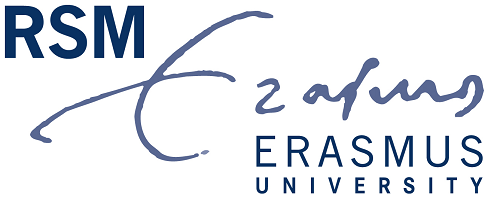
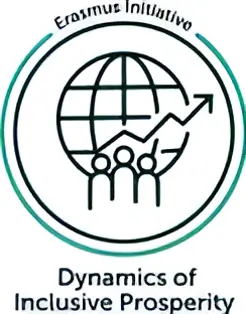
Jean Tirole is honorary chairman of the Foundation JJ Laffont-Toulouse School of Economics (TSE) and of the Institute for Advanced Study in Toulouse (IAST), and scientific director of TSE-Partnership. He is also affiliated with MIT, where he holds a visiting position, and the Institut de France. Professor Tirole’s research covers industrial organization, regulation, finance, macroeconomics and banking, and psychology-based economics. Jean Tirole has published over two hundred articles in international reviews, as well as twelve scientific books. Published in English in 2017, his latest book entitled Economics for the Common Good is accessible to a wide audience and available in a number of other languages. He is laureate of numerous international distinctions, including the 2007 CNRS gold medal and the 2014 Sveriges Riksbank prize in economic sciences in memory of Alfred Nobel.

Jean Tirole
Toulouse School of Economics

Thomas Lambert
Erasmus University Rotterdam

Enrico Perotti
University of Amsterdam

Magdalena Rola-Janicka
Imperial College London

Luigi Zingales
University of Chicago Booth School of Business

Pat Akey
INSEAD
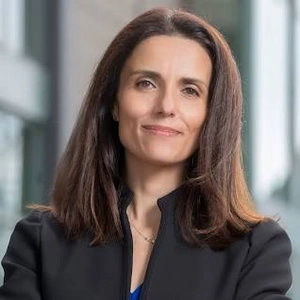
Matilde Bombardini
University of California Berkeley

Daniel Ferreira
London School of Economics

Nandini Gupta
Indiana University

Deniz Igan
International Monetary Fund

Elisabeth Kempf
Harvard University

Hélène Landemore
Yale University
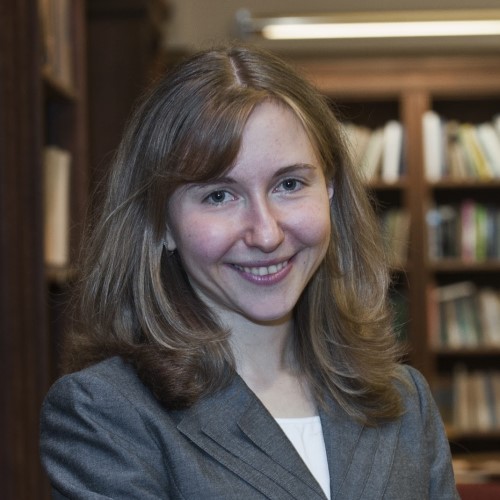
Nadya Malenko
Boston College

Clara Martinez-Toledano
Imperial College London
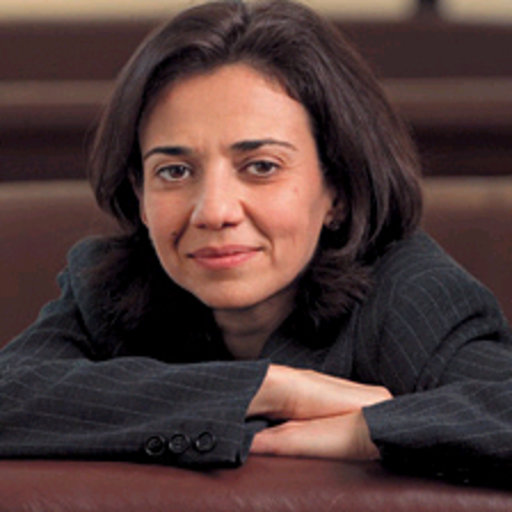
Paola Sapienza
Stanford University
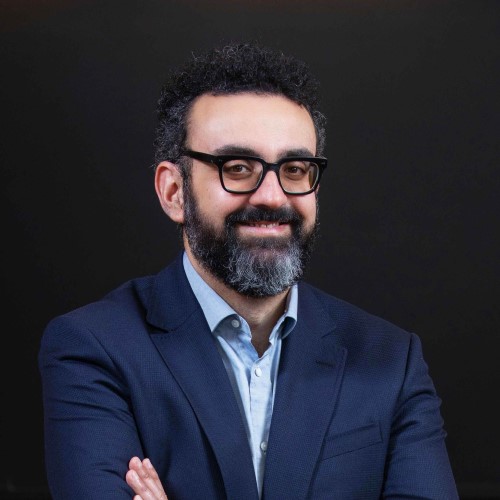
Roberto Tallarita
Harvard University

Josef Zechner
WU Vienna University
Submission deadline: Sunday 22 June 2025
The Event
In a time of large shocks and rising inequality, the political divide is growing. Polarization forces changes to private and public governance, reshaping financial markets, corporate strategies and public policy.
How does corporate governance adjust in a more conflictual world? How do a divided society and politicized corporations respond to major societal challenges such as climate change or economic decline? How do inequality and politicization shape governance choices and the trade-offs faced by voters, businesses and governments? How can organizations foster trust and cohesion in an era of polarization?
The conference invites theoretical and empirical papers on these and related themes.
The conference keynote will be delivered by Nobel Laureate:
Jean Tirole
Toulouse School of Economics and CEPR
This conference results from the merger of the conferences on Political Economy of Finance previously organized by PolEconFin and the Stigler Center, respectively. This revamped conference series is held annually and alternates between Europe and the United States.
The event, jointly hosted by the Stigler Center and The Centre for Economic Policy Research (CEPR), aims to bring together researchers active at the intersections between Economics, Finance, Political Science, Philosophy, and Law.
This conference is in-person and by invitation-only.
This edition is co-funded by Imperial College London and Erasmus Initiative ‘Dynamics of Inclusive Prosperity’ at Erasmus University Rotterdam.
Submission
Please submit papers by logging in to https://hub.cepr.org/ and then going to https://hub.cepr.org/event/4675 to find the conference submission page. The submission deadline is Sunday 22 June 2025 (6PM BST).
If you have any difficulties submitting your paper for this event, please contact Jemila Benchikh at [email protected] for assistance (with subject header “Stigler Center-CEPR Political Economy of Finance Conference”). There is no submission fee. The authors will be notified about the acceptance of papers end of August 2025.
Further Information
The conference will be held in-person at Imperial College London. The conference is scheduled on Friday 24 October 2025 and followed by a dinner with all participants
Date: November 8-9 2024
Venue: Gleacher Center, 450 Cityfront Plaza Dr, Chicago, IL 60611
Invitation request: click here
More information about the conference here
November 8, 2024
1:30 p.m. – 1:35 p.m. CT
Welcome Remarks
1:35 p.m. – 2:25 p.m. CT
Consuming Values (with Levi Boxell)
Jacob Conway, University of Chicago
Discussant: Efraim Benmelech, Northwestern University
2:25 p.m. – 2:35 p.m. CT
Break
2:35 p.m. – 3:25 p.m. CT
How Anti-ESG Pressure Affects Investment: Evidence from Retirement Savings
Jane Danyu Zhang, University of Oregon
Discussant: Nandini Gupta, Indiana University
3:25 p.m. – 3:30 p.m. CT
Break
3:30 p.m. – 4:20 p.m. CT
Divestment and Engagement: The Effect of Green Investors on Corporate Carbon Emissions (with Matthew Kahn and John Matsusaka)
Chong Shu, University of Utah
Discussant: Lubos Pastor, University of Chicago
4:20 p.m. – 4:30 p.m. CT
Break
4:30 p.m. – 5:20 p.m. CT
Expanding Shareholder Voice: The Impact of SEC Guidance on Environmental and Social Proposals (with Kenneth Khoo)
Roberto Tallarita, Havard University
Discussant: Elizabeth Pollman, University of Pennsylvania
5:20 p.m. – 5:30 p.m. CT
Break
5:30 p.m. – 6:20 p.m. CT
The Politicization of Social Responsibility (with Todd Gormley and Meng Wang)
Manish Jha, Georgia State University
Discussant: Nadya Malenko, Boston College
6:30 p.m. – 7:00 p.m. CT
Reception
7:00 p.m. – 8:00 p.m. CT
Dinner | Keynote
Oliver Hart, Nobel Laureate, Harvard University
November 9, 2024
8:30 a.m. – 9:00 a.m. CT
Breakfast
9:00 a.m. – 9:50 a.m. CT
Voting on Public Goods: Citizens vs. Shareholders (with Doron Levit, Nadya Malenko, and Magdalena Rola-Janicka)
Robin Döttling, Erasmus University Rotterdam
Discussant: Nicola Persico, Northwestern University
9:50 a.m. – 10:00 a.m. CT
Break
10:00 a.m. – 10:50 a.m. CT
Minority Representation at Work (with Wei Cai, Anthony Le, and Felix Vetter)
Matthias Breuer, Columbia University
Discussant: Kilian Huber, University of Chicago
10:50 a.m. – 11:00 a.m. CT
Break
11:00 a.m. – 11:50 a.m. CT
How Well Do Voting Choice Policies Represent Public and Investor Preferences? (with Zachary Peskowitz and Suhas Sridharan)
B. Pablo Montagnes, Emory University
Discussant: Elisabeth Kempf, Harvard University
11:50 a.m. – 12:00 p.m. CT
Break
12:00 p.m. – 1:00 p.m. CT
Lunch | Reclaiming Corporate Democracy
Sarah Haan, Washington and Lee University
Discussant: Hélène Landemore, Yale University
1:00 p.m. – 1:10 p.m. CT
Break
1:10 p.m. – 2:00 p.m. CT
Corporate Actions as Moral Issues (with Elisabeth Kempf)
Oliver Spalt, University of Mannheim
Discussant: David Thesmar, Massachusetts Institute of Technology
2:00 p.m CT
Closing Remarks | Conference Adjourns
Sir Oliver Hart is currently the Lewis P. and Linda L. Geyser University Professor at Harvard University, where he has taught since 1993. He is the 2016 co-recipient of the Sveriges Riksbank Prize in Economic Sciences in Memory of Alfred Nobel. Hart’s research centers on the roles that ownership structure and contractual arrangements play in the governance and boundaries of corporations. His recent work focuses on how parties can write better contracts, and on the social responsibility of business. He has published a book (Firms, Contracts, and Financial Structure, Oxford University Press, 1995) and numerous journal articles. He has used his theoretical work on firms and contracts in several legal cases. He is a Fellow of the Econometric Society, the American Academy of Arts and Sciences, the British Academy, and the American Finance Association, a member of the National Academy of Sciences, a Distinguished Fellow of the American Economic Association, and has several honorary degrees. He has been president of the American Law and Economics Association and a vice president of the American Economic Association. He was made a Knight Bachelor in the King’s Birthday Honours List, 2023.

Oliver Hart
Harvard University

Thomas Lambert
Erasmus University Rotterdam

Magdalena Rola-Janicka
Imperial College London

Luigi Zingales
University of Chicago Booth School of Business

Efraim Benmelech
Northwestern University

Emanuele Colonnelli
University of Chicago

Mara Faccio
Purdue University

Elisabeth Kempf
Harvard University

Hélène Landemore
Yale University

John Matsusaka
University of Southern California

Enrico Perotti
University of Amsterdam
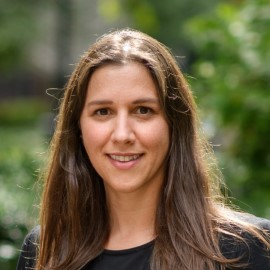
Elizabeth Pollman
University of Pennsylvania
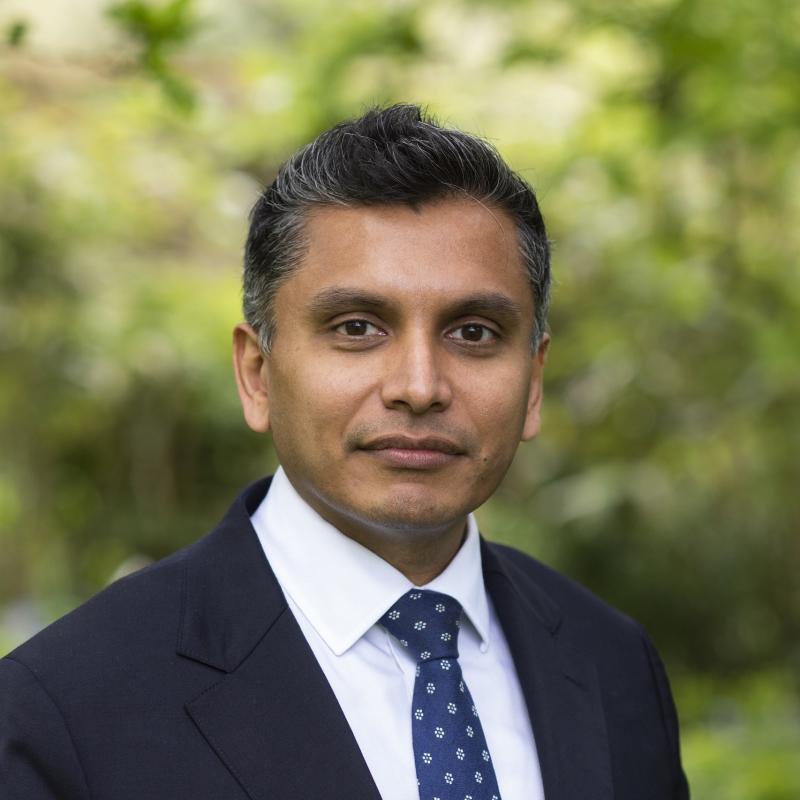
Karthik Ramanna
University of Oxford

Paola Sapienza
Northwestern University

Amit Seru
Stanford University

Paolo Volpin
Drexel University
The Event
This is the fourth edition of an annual conference series on the Political Economy of Finance. The event, jointly hosted by the Stigler Center and the CEPR, aims to bring together researchers active at the intersections between Economics, Finance, Political Science, and Law.
The conference keynote will be delivered by Nobel Laureate:
Oliver Hart
Harvard University
One of the goals of the 1934 Security and Exchange Act was to promote shareholder democracy through the proxy ballot. Ninety years later, this goal is far from being achieved. The rise of index funds has concentrated an enormous amount of voting power in just a few hands. Is corporate democracy desirable? What are its costs and benefits? Is it feasible in the face of the enormous concentration of voting power and the rational apathy of voters? What can we learn from political democracy? Is corporate democracy a form of plutocracy? The conference invites papers on all these themes.
Call for Papers
Papers are now being accepted on topics related to corporate democracy.
To submit a paper for consideration, you must first create an account with the Ex Ordo submission site: https://pef2024.exordo.com.
Deadline: Papers must be submitted through our Ex Ordo portal by June 30 (11:59pm CT Chicago time).
Authors will be notified in August.
Sir Oliver Hart is currently the Lewis P. and Linda L. Geyser University Professor at Harvard University, where he has taught since 1993. He is the 2016 co-recipient of the Sveriges Riksbank Prize in Economic Sciences in Memory of Alfred Nobel. Hart’s research centers on the roles that ownership structure and contractual arrangements play in the governance and boundaries of corporations. His recent work focuses on how parties can write better contracts, and on the social responsibility of business. He has published a book (Firms, Contracts, and Financial Structure, Oxford University Press, 1995) and numerous journal articles. He has used his theoretical work on firms and contracts in several legal cases. He is a Fellow of the Econometric Society, the American Academy of Arts and Sciences, the British Academy, and the American Finance Association, a member of the National Academy of Sciences, a Distinguished Fellow of the American Economic Association, and has several honorary degrees. He has been president of the American Law and Economics Association and a vice president of the American Economic Association. He was made a Knight Bachelor in the King’s Birthday Honours List, 2023.

Oliver Hart
Harvard University

Thomas Lambert
Erasmus University Rotterdam

Magdalena Rola-Janicka
Imperial College London

Luigi Zingales
University of Chicago Booth School of Business
Date: Friday 20 October 2023
Venue: Wereldmuseum, Willemskade 25, 3016 DM Rotterdam
Registration: click here
Call for papers: click here
The conference theme of the 2023 edition is dedicated to the interactions between firms’ political power, their stakeholders and society at large.
09.00-09.20 – Welcome | Salon
09.20-09.30 – Opening |Erkerside Ballroom
Enrico Perotti (University of Amsterdam & CEPR)
09.30-11.00 – Politics and Sustainable Finance | Erkerside Ballroom
Chair: Pat Akey (INSEAD)
Why Divest? The Political and Informational Roles of Institutions in Asset Stranding
Presenter: Adlai Fisher (UBC Sauder School of Business)
Discussant: Alessio Piccolo (Kelley School of Business, Indiana University)
Is Sustainable Finance a Dangerous Placebo?
Presenter: Stefano Ramelli (University of St.Gallen)
Discussant: Sébastien Pouget (Toulouse School of Economics)
11.00-11.30 – Break | Salon
11.30-12.30 – Keynote Lecture | Erkerside Ballroom
Chair: Deniz Igan (Bank for International Settlements & CEPR)
Reforming Capitalism
Presenter: Luigi Zingales (University of Chicago Booth School of Business & CEPR)
12.30-13.30 – Lunch | Salon
13.30-15.00 – Democracy and Capital | Erkerside Ballroom
Chair: Alberto Manconi (Boconni University & CEPR)
Who Values Democracy?
Presenter: Max Miller (Harvard Business School)
Discussant: Marc Flandreau (University of Pennsylvania)
The Origins of Limited Liability: Catering to Safety Demand with Investors’ Irresponsibility
Presenter: Guillaume Vuillemey (HEC Paris & CEPR)
Discussant: Peter Koudijs (Erasmus School of Economics)
15.00-15:30 – Break | Salon
15.30-17.00 – Ideology and Institutions | Erkerside Ballroom
Chair: Elisabeth Kempf (Harvard Business School & CEPR)
Markets under Siege: How Differences in Political Beliefs Move Financial Markets
Presenter: Saumitra Jha (Stanford Graduate School of Business)
Discussant: Rik Frehen (Tilburg University)
The Politics of Academic Research
Presenter: Chong Shu (David Eccles School of Business, University of Utah)
Discussant: Enrichetta Ravina (Federal Reserve Bank of Chicago & CEPR)
17.00-18.00 – Museum Visit | Main Collection
18.00-22.00 – Aperitif and Dinner | Salon
Luigi Zingales’ research interests span from corporate governance to financial development, from political economy to the economic effects of culture. He co-developed the Financial Trust Index, which is designed to monitor the level of trust that Americans have toward their financial system. In addition to holding his position at Chicago Booth, Zingales is currently a faculty research fellow for the National Bureau of Economic Research, a research fellow for the Center for Economic Policy Research, and a fellow of the European Governance Institute. In 2014 he was the President of the American Finance Association. He is the co-host of the podcast Capitalisn’t.
In July 2015 he became the director of the Stigler Center at the University of Chicago which he is refocusing on promoting and diffusing research on regulatory capture and the various distortions that special interest groups impose on capitalism.

Luigi Zingales
University of Chicago Booth School of Business
His research has earned him the 2003 Bernácer Prize for the best young European financial economist. His work has been published in the major economic and finance journals, but he has publications also in Science and the Proceedings of the National Academy of Science.
His book, Saving Capitalism from Capitalists, coauthored with Raghuram G. Rajan, has been acclaimed as “one of the most powerful defenses of the free market ever written” by Bruce Bartlett of National Review Online. Of his latest book, “A Capitalism for the People: Recapturing the Lost Genius of American Prosperity,” the Financial Times has written “Zingales’ fundamental diagnosis is right.”
Born in Italy, Zingales carries with him a civic passion and the belief that economists should not just interpret the world, they should change it for the better. Commenting on his method of teaching on a few very important lessons rather than a myriad of details, Zingales says, “Twenty years from now they might have forgotten all the details of my course, but hopefully they will not have forgotten the way of thinking.” Zingales received a bachelor’s degree in economics summa cum laude from Universitr Bocconi in Italy in 1987 and a PhD in economics from the Massachusetts Institute of Technology in 1992. He joined the Chicago Booth faculty in 1992.
In addition to teaching and researching, Zingales enjoys travelling to developing countries.

Thomas Lambert
Erasmus University Rotterdam

Enrico Perotti
University of Amsterdam

Magdalena Rola-Janicka
Tilburg University

Pat Akey
University of Toronto

Matilde Bombardini
University of California Berkeley
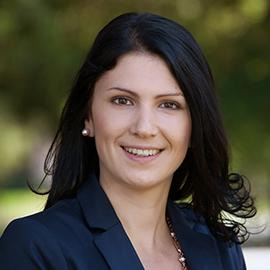
Dana Foarta
Stanford University

Nandini Gupta
Indiana University

Deniz Igan
Bank for International Settlements

Elisabeth Kempf
Harvard University

Orkun Saka
City, University of London
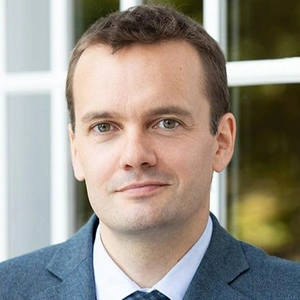
Boris Vallee
Harvard University

Paolo Volpin
Drexel University

Ernst-Ludwig von Thadden
University of Mannheim
Date: Saturday 12 November 2022
Venue: University of Amsterdam (hybrid)
Registration: click here
The conference theme of the 2022 edition is dedicated to exploring the intersections between
political institutions, central banks, and the real sector.
09.50-10.00 – Opening
Enrico Perotti (University of Amsterdam & CEPR)
10.00-11.30 – Historical Perspectives
Chair: Deniz Igan (Bank for International Settlements & CEPR)
Central Banks’ Balance Sheet and the Macroeconomy, 1587-2020
Presenter: Moritz Schularick (University of Bonn & CEPR)
Discussant: Eric Monnet (Paris School of Economics & CEPR)
Central Bank Losses and Lending of Last Resort
Presenter: Kris Mitchener (Santa Clara University & CEPR)
Discussant: Alexander Michaelides (Imperial College London & CEPR)
12.00-13.00 – Visions from the Frontline
Chair: Ernst-Ludwig von Thadden (University of Mannheim & CEPR)
Fiscal Dominance and Regulatory Forbearance
Presenter: Viral Acharya (New York University Stern School of Business & CEPR)
13.00-14.30 – Lunch at Cantina Caliente
14.30-16.45 – Theory and Empirics
Chair: Alessandro Riboni (Ecole Polytechnique & CEPR)
The Dark Side of Conservative Central Banks: A Model of Political Turnover and the Central Bank
Presenter: Carolin Pflueger (University of Chicago & CEPR)
Discussant: Dana Foarta (Stanford Graduate School of Business & CEPR)
(In)dependent Central Banks
Presenter: Sotirios Kokas (University of Essex)
Discussant: Viral Acharya (New York University Stern School of Business & CEPR)
The Coming Battle of Digital Currencies
Presenter: Simon Mayer (HEC Paris)
Discussant: Jean-Charles Rochet (Geneva Finance Research Institute & CEPR)
17.15-18.15 – Keynote Lecture
Chair: Orkun Saka (City, University of London & London School of Economics)
Barry Eichengreen (University of California, Berkeley & CEPR)
18.30-22.00 – Dinner at Restaurant Elkaar
Barry Eichengreen is the George C. Pardee and Helen N. Pardee Professor of Economics and Professor of Political Science at the University of California, Berkeley, where he has taught since 1987. He is a Research Associate of the National Bureau of Economic Research (Cambridge, Massachusetts) and Research Fellow of the Centre for Economic Policy Research (London, England). In 1997-98 he was Senior Policy Advisor at the International Monetary Fund. He is a fellow of the American Academy of Arts and Sciences (class of 1997).
Professor Eichengreen has held Guggenhim and Fulbright Fellowships and been a fellow of the Center for Advanced Study in the Behavioral Sciences (Palo Alto) and the Institute for Advanced Study (Berlin). From 2004 to 2020 he served as convener of the Bellagio Group of academics and officials. He is a regular monthly columnist for Project Syndicate.
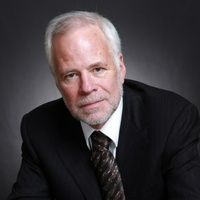
Barry Eichengreen
University of California, Berkeley
His most recent books are In Defense of Public Debt with Asmaa El-Ganainy, Rui Esteves and Kris Mitchener (Oxford University Press 2021), The Populist Temptation: Economic Grievance and Political Reaction in the Modern Era (Oxford University Press, 2018), How Global Currencies Work: Past, Present, and Future with Livia Chitu and Arnaud Mehl (November 2017), The Korean Economy: From a Miraculous Past to a Sustainable Future with Wonhyuk Lim, Yung Chul Park and Dwight H. Perkins (March 2015), Renminbi Internationalization: Achievements, Prospects, and Challenges, with Masahiro Kawai (February 2015), Hall of Mirrors: The Great Depression, The Great Recession, and the Uses–and Misuses–of History (January 2015), From Miracle to Maturity: The Growth of the Korean Economy with Dwight H. Perkins and Kwanho Shin (2012) and Exorbitant Privilege: The Rise and Fall of the Dollar and the Future of the International Monetary System (2011) (shortlisted for the Financial Times and Goldman Sachs Business Book of the Year Award in 2011).
Professor Eichengreen was awarded the Economic History Association’s Jonathan R.T. Hughes Prize for Excellence in Teaching in 2002 and the University of California at Berkeley Social Science Division’s Distinguished Teaching Award in 2004. He is the recipient of a doctor honoris causa from the American University in Paris, and the 2010 recipient of the Schumpeter Prize from the International Schumpeter Society. He was named one of Foreign Policy Magazine ‘s 100 Leading Global Thinkers in 2011. He is a past president of the Economic History Association (2010-11 academic year).

Jean-Edouard Colliard
HEC Paris and CEPR

Dana Foarta
Stanford University and CEPR

Hans Gersbach
ETH Zurich and CEPR

Rainer Haselmann
Goethe University Frankfurt and CEPR

Deniz Igan
Bank for International Settlements and CEPR

Elisabeth Kempf
University of Chicago and CEPR

Kris James Mitchener
Santa Clara University and CEPR

Alessandro Riboni
Ecole Polytechnique and CEPR

Martin Schmalz
University of Oxford and CEPR

Christoph Trebesch
Kiel University and CEPR
Central Banks’ Balance Sheet and the Macroeconomy, 1587-2020 by Moritz Schularik
Discussion by Eric Monnet
Central Bank Losses and Lending of Last Resort by Kris Mitchener
Discussion by Alexander Michaelides
Discussion by Dana Foarta
(In)dependent Central Banks by Sotirios Kokas
Discussion by Viral Acharya
The Coming Battle of Digital Currencies by Simon Mayer
Discussion by Jean-Charles Rochet
From the Weaponized Dollar to the Digital Dollar: The Challenge for Central Banks by Barry Eichengreen
The papers for the online conference can be downloaded here.
Date: Friday February 12, 2021
Venue: Rotterdam School of Management, Erasmus University (online)
The conference theme of the 2021 edition was dedicated to exploring the intersections between political economy and central banking.
Francesco Trebbi (Berkeley Haas) gave a keynote lecture on “Investing in Influence”.
12.20-12.30 – Opening
Enrico Perotti (University of Amsterdam & CEPR)
12.30-14.00 – Electoral Politics, Credit, and Regulation
Chair: Elena Carletti (Bocconi University & CEPR)
Electoral Cycles in Macroprudential Regulation
Presenter: Karsten Müller (Princeton University)
Discussant: Anne-Laure Delatte (Paris Dauphine University & CEPR)
Toxic Loans and the Rise of Populist Candidacies
Presenter: Emilie Sartre (CREST-ENSAE)
Discussant: Boris Vallée (Harvard Business School)
14.30-16.00 – Institutions, Reforms, and Politics
Chair: Martin Hellwig (Max Planck Institute & University of Bonn)
A Diverse Monetary Union
Presenter: Oscar Soons (University of Amsterdam)
Discussant: Roberto Perotti (Bocconi University & CEPR)
Complexity and the Reform Process
Presenter: Dana Foarta (Stanford Graduate School of Business & CEPR)
Discussant: Frederic Malherbe (University College London & CEPR)
16.30-17.30 – Keynote Lecture
Investing in Influence
Francesco Trebbi (University of California, Berkeley & CEPR)
18.00-19.30 – Governance and Central Banking
Chair: Paul Tucker (Harvard Kennedy School)
(Why) Do Central Banks Care about their Profits?
Presenter: Igor Goncharov (Lancaster University)
Discussant: Prachi Mishra (International Monetary Fund)
Fifty Shades of QE: Comparing Findings of Central Bankers and Academics
Presenter: Elisabeth Kempf (University of Chicago Booth School of Business & CEPR)
Discussant: José-Luis Peydró (Pompeu Fabra University & CEPR)
Francesco Trebbi is the Bernard T. Rocca Jr. Chair and Professor at the University of California, Berkeley Haas School of Business. He is also Research Associate at the National Bureau of Economic Research (NBER) and Research Fellow of the Centre for Economic Policy Research (CEPR). Before joining UC Berkeley, he was Canada Research Chair and Professor of Economics at the University of British Columbia Vancouver School of Economics and Assistant Professor of Economics at the University of Chicago Booth School of Business. He received his PhD in Economics from Harvard University.
Professor Eichengreen has held Guggenhim and Fulbright Fellowships and been a fellow of the Center for Advanced Study in the Behavioral Sciences (Palo Alto) and the Institute for Advanced Study (Berlin). From 2004 to 2020 he served as convener of the Bellagio Group of academics and officials. He is a regular monthly columnist for Project Syndicate.

Francesco Trebbi
University of California, Berkeley
His academic research focuses on Political Economy and Applied Microeconomics broadly defined. He has worked on political institutions and their design, elections and political campaigns, behavior in legislatures, campaign finance, lobbying, banking and regulation. He has also worked on topics related to the political economy of development, corruption, ethnic politics, and intra-state conflict. He has interests in Finance, Development Economics, and Macroeconomics. His primary teaching interests are in Political Economy, Applied Econometrics, Macroeconomics, and Data Science.

Dana Foarta
Stanford GSB and CEPR

Hans Gersbach
ETH Zurich and CEPR

Deniz Igan
International Monetary Fund and CEPR

Frederic Malherbe
University College London and CEPR

Kris James Mitchener
Santa Clara University and CEPR

Enrico Perotti
University of Amsterdam and CEPR

Alessandro Riboni
Ecole Polytechnique and CEPR

Martin Schmalz
University of Oxford and CEPR

Vikrant Vig
London Business School and CEPR

Paolo Volpin
City University of London and CEPR
Electoral Politics, Credit, and Regulation
Institutions, Reforms, and Politics
Keynote Lecture by Francesco Trebbi
Governance and Central Banking
The papers for the online conference can be downloaded here.
Date: Friday 20 October 2023
Venue: Rotterdam
Registration: click here
This edition will be dedicated to the interactions between firms’ political power, their stakeholders and society at large.
Download the call for papers in pdf here
The Event
This is the third edition of an annual conference series on the Political Economy of Finance. The series is an initiative of PolEconFin, a platform for researchers active in the political economy of finance.
The academic programme will consist of six papers with discussants and also feature a keynote lecture by:
Luigi Zingales
University of Chicago Booth School of Business
The question of the purpose of firms in society is receiving renewed attention. The rise of ESG and, especially, the many challenges facing society such as climate change bring the attention of academics and policy-makers to the (political) role of firms in providing common good and shaping the political landscape around them. Developments on the political economy of finance literature are intimately related to the literature studying how stakeholders affect firm objectives and the pursuit of the common good. This edition aims to showcase studies on the political economy of finance addressing these issues of our time.
The organising committee invites submissions of theoretical and empirical papers on these issues. Topics of interest for the conference include:
- The politics of corporate social responsibility
- Corporate lobbying, regulation, and the environment
- Political ideology and firm value
- The political economy of corporate governance
- Political influence, competition, and innovation
- Political institutions and corporations
- Corporate power, academic research, and society
- Markets, firms, and money in politics
Submission
Please submit papers via XX. The submission deadline is Sunday 11 June 2023 (6PM BST).
Submission
The submission deadline is Sunday 11 June 2023 (6PM BST). There is no submission fee. The authors will be notified about the acceptance of papers in August 2023.
Instructions on the submissions process
Authors who already have a CEPR HUB profile can upload their submission by:
- Going to https://hub.cepr.org/ and logging in
- After you have logged in, go to https://hub.cepr.org/event/3900
- Click on “Step 1: Apply”
- Under “Apply to Attend” click “Yes”
- Tick the boxes that apply to you
- Tick “Would you like to submit a paper?”, upload your paper and supply the requested information, including which session the paper is for (Asset Pricing or Corporate Finance)
- Click “Submit form” to make the submission.
Authors who do not have a CEPR HUB profile can upload their submission by:
- Creating a new profile here https://hub.cepr.org/user/register
- After you have logged in, go to https://hub.cepr.org/event/3900
- Click on “Step 1: Apply”
- Under “Apply to Attend” click “Yes”
- Tick the boxes that apply to you
- Tick “Would you like to submit a paper?”, upload your paper and supply the requested information, including which session the paper is for (Asset Pricing or Corporate Finance)
- Click “Submit form” to make the submission.
If you have any difficulties registering for this event, please contact Despoina Chatzilari ([email protected]) for assistance (with subject header “CEPR Conference Politics, Corporations, and the Common Good”).
Further Information
The conference will be held in-person in Rotterdam. The conference is scheduled on Friday 20 October 2023 and followed by a dinner with all participants.
Email: [email protected]
10.00-11.30 – Historical Perspectives
Chair: Deniz Igan (Bank for International Settlements & CEPR)
Central Banks’ Balance Sheet and the Macroeconomy, 1587-2020
Presenter: Moritz Schularick (University of Bonn & CEPR)
Discussant: Eric Monnet (Paris School of Economics & CEPR)
Central Bank Losses and Lending of Last Resort
Presenter: Kris Mitchener (Santa Clara University & CEPR)
Discussant: Alexander Michaelides (Imperial College London & CEPR)
12.00-13.00 – Visions from the Frontline
Chair: Ernst-Ludwig von Thadden (University of Mannheim & CEPR)
Fiscal Dominance and Regulatory Forbearance
Presenter: Viral Acharya (New York University Stern School of Business & CEPR)
13.00-14.30 – Lunch at Cantina Caliente
14.30-16.45 – Theory and Empirics
Chair: Alessandro Riboni (Ecole Polytechnique & CEPR)
The Dark Side of Conservative Central Banks: A Model of Political Turnover and the Central Bank
Presenter: Carolin Pflueger (University of Chicago & CEPR)
Discussant: Dana Foarta (Stanford Graduate School of Business & CEPR)
(In)dependent Central Banks
Presenter: Sotirios Kokas (University of Essex)
Discussant: Viral Acharya (New York University Stern School of Business & CEPR)
The Coming Battle of Digital Currencies
Presenter: Simon Mayer (HEC Paris)
Discussant: Jean-Charles Rochet (Geneva Finance Research Institute & CEPR)
17.15-18.15 – Keynote Lecture
Chair: Orkun Saka (City, University of London & London School of Economics)
Barry Eichengreen (University of California, Berkeley & CEPR)
18.30-22.00 – Dinner at Restaurant Elkaar
Luigi Zingales’ research interests span from corporate governance to financial development, from political economy to the economic effects of culture. He co-developed the Financial Trust Index, which is designed to monitor the level of trust that Americans have toward their financial system. In addition to holding his position at Chicago Booth, Zingales is currently a faculty research fellow for the National Bureau of Economic Research, a research fellow for the Center for Economic Policy Research, and a fellow of the European Governance Institute. In 2014 he was the President of the American Finance Association. He is the co-host of the podcast Capitalisn’t.
In July 2015 he became the director of the Stigler Center at the University of Chicago which he is refocusing on promoting and diffusing research on regulatory capture and the various distortions that special interest groups impose on capitalism.

Luigi Zingales
University of Chicago Booth School of Business
His research has earned him the 2003 Bernácer Prize for the best young European financial economist. His work has been published in the major economic and finance journals, but he has publications also in Science and the Proceedings of the National Academy of Science.
His book, Saving Capitalism from Capitalists, coauthored with Raghuram G. Rajan, has been acclaimed as “one of the most powerful defenses of the free market ever written” by Bruce Bartlett of National Review Online. Of his latest book, “A Capitalism for the People: Recapturing the Lost Genius of American Prosperity,” the Financial Times has written “Zingales’ fundamental diagnosis is right.”
Born in Italy, Zingales carries with him a civic passion and the belief that economists should not just interpret the world, they should change it for the better. Commenting on his method of teaching on a few very important lessons rather than a myriad of details, Zingales says, “Twenty years from now they might have forgotten all the details of my course, but hopefully they will not have forgotten the way of thinking.” Zingales received a bachelor’s degree in economics summa cum laude from Universitr Bocconi in Italy in 1987 and a PhD in economics from the Massachusetts Institute of Technology in 1992. He joined the Chicago Booth faculty in 1992.
In addition to teaching and researching, Zingales enjoys travelling to developing countries.

Thomas Lambert
Erasmus University Rotterdam

Enrico Perotti
University of Amsterdam

Magdalena Rola-Janicka
Tilburg University

Pat Akey
University of Toronto

Matilde Bombardini
University of California Berkeley

Dana Foarta
Stanford University

Nandini Gupta
Indiana University

Deniz Igan
Bank for International Settlements

Elisabeth Kempf
Harvard University

Orkun Saka
City, University of London

Boris Vallee
Harvard University

Paolo Volpin
Drexel University

Ernst-Ludwig von Thadden
University of Mannheim
Date: Saturday 12 November 2022
Venue: University of Amsterdam (hybrid)
Registration: click here
The conference theme of the 2022 edition is dedicated to exploring the intersections between
political institutions, central banks, and the real sector.
09.50-10.00 – Opening
Enrico Perotti (University of Amsterdam & CEPR)
10.00-11.30 – Historical Perspectives
Chair: Deniz Igan (Bank for International Settlements & CEPR)
Central Banks’ Balance Sheet and the Macroeconomy, 1587-2020
Presenter: Moritz Schularick (University of Bonn & CEPR)
Discussant: Eric Monnet (Paris School of Economics & CEPR)
Central Bank Losses and Lending of Last Resort
Presenter: Kris Mitchener (Santa Clara University & CEPR)
Discussant: Alexander Michaelides (Imperial College London & CEPR)
12.00-13.00 – Visions from the Frontline
Chair: Ernst-Ludwig von Thadden (University of Mannheim & CEPR)
Fiscal Dominance and Regulatory Forbearance
Presenter: Viral Acharya (New York University Stern School of Business & CEPR)
13.00-14.30 – Lunch at Cantina Caliente
14.30-16.45 – Theory and Empirics
Chair: Alessandro Riboni (Ecole Polytechnique & CEPR)
The Dark Side of Conservative Central Banks: A Model of Political Turnover and the Central Bank
Presenter: Carolin Pflueger (University of Chicago & CEPR)
Discussant: Dana Foarta (Stanford Graduate School of Business & CEPR)
(In)dependent Central Banks
Presenter: Sotirios Kokas (University of Essex)
Discussant: Viral Acharya (New York University Stern School of Business & CEPR)
The Coming Battle of Digital Currencies
Presenter: Simon Mayer (HEC Paris)
Discussant: Jean-Charles Rochet (Geneva Finance Research Institute & CEPR)
17.15-18.15 – Keynote Lecture
Chair: Orkun Saka (City, University of London & London School of Economics)
Barry Eichengreen (University of California, Berkeley & CEPR)
18.30-22.00 – Dinner at Restaurant Elkaar
Barry Eichengreen is the George C. Pardee and Helen N. Pardee Professor of Economics and Professor of Political Science at the University of California, Berkeley, where he has taught since 1987. He is a Research Associate of the National Bureau of Economic Research (Cambridge, Massachusetts) and Research Fellow of the Centre for Economic Policy Research (London, England). In 1997-98 he was Senior Policy Advisor at the International Monetary Fund. He is a fellow of the American Academy of Arts and Sciences (class of 1997).
Professor Eichengreen has held Guggenhim and Fulbright Fellowships and been a fellow of the Center for Advanced Study in the Behavioral Sciences (Palo Alto) and the Institute for Advanced Study (Berlin). From 2004 to 2020 he served as convener of the Bellagio Group of academics and officials. He is a regular monthly columnist for Project Syndicate.

Barry Eichengreen
University of California, Berkeley
His most recent books are In Defense of Public Debt with Asmaa El-Ganainy, Rui Esteves and Kris Mitchener (Oxford University Press 2021), The Populist Temptation: Economic Grievance and Political Reaction in the Modern Era (Oxford University Press, 2018), How Global Currencies Work: Past, Present, and Future with Livia Chitu and Arnaud Mehl (November 2017), The Korean Economy: From a Miraculous Past to a Sustainable Future with Wonhyuk Lim, Yung Chul Park and Dwight H. Perkins (March 2015), Renminbi Internationalization: Achievements, Prospects, and Challenges, with Masahiro Kawai (February 2015), Hall of Mirrors: The Great Depression, The Great Recession, and the Uses–and Misuses–of History (January 2015), From Miracle to Maturity: The Growth of the Korean Economy with Dwight H. Perkins and Kwanho Shin (2012) and Exorbitant Privilege: The Rise and Fall of the Dollar and the Future of the International Monetary System (2011) (shortlisted for the Financial Times and Goldman Sachs Business Book of the Year Award in 2011).
Professor Eichengreen was awarded the Economic History Association’s Jonathan R.T. Hughes Prize for Excellence in Teaching in 2002 and the University of California at Berkeley Social Science Division’s Distinguished Teaching Award in 2004. He is the recipient of a doctor honoris causa from the American University in Paris, and the 2010 recipient of the Schumpeter Prize from the International Schumpeter Society. He was named one of Foreign Policy Magazine ‘s 100 Leading Global Thinkers in 2011. He is a past president of the Economic History Association (2010-11 academic year).

Jean-Edouard Colliard
HEC Paris and CEPR

Dana Foarta
Stanford University and CEPR

Hans Gersbach
ETH Zurich and CEPR

Rainer Haselmann
Goethe University Frankfurt and CEPR

Deniz Igan
Bank for International Settlements and CEPR

Elisabeth Kempf
University of Chicago and CEPR

Kris James Mitchener
Santa Clara University and CEPR

Alessandro Riboni
Ecole Polytechnique and CEPR

Martin Schmalz
University of Oxford and CEPR

Christoph Trebesch
Kiel University and CEPR
Central Banks’ Balance Sheet and the Macroeconomy, 1587-2020 by Moritz Schularik
Discussion by Eric Monnet
Central Bank Losses and Lending of Last Resort by Kris Mitchener
Discussion by Alexander Michaelides
Discussion by Dana Foarta
(In)dependent Central Banks by Sotirios Kokas
Discussion by Viral Acharya
The Coming Battle of Digital Currencies by Simon Mayer
Discussion by Jean-Charles Rochet
From the Weaponized Dollar to the Digital Dollar: The Challenge for Central Banks by Barry Eichengreen
The papers for the online conference can be downloaded here.
Date: Friday February 12, 2021
Venue: Rotterdam School of Management, Erasmus University (online)
The conference theme of the 2021 edition was dedicated to exploring the intersections between political economy and central banking.
Francesco Trebbi (Berkeley Haas) gave a keynote lecture on “Investing in Influence”.
12.20-12.30 – Opening
Enrico Perotti (University of Amsterdam & CEPR)
12.30-14.00 – Electoral Politics, Credit, and Regulation
Chair: Elena Carletti (Bocconi University & CEPR)
Electoral Cycles in Macroprudential Regulation
Presenter: Karsten Müller (Princeton University)
Discussant: Anne-Laure Delatte (Paris Dauphine University & CEPR)
Toxic Loans and the Rise of Populist Candidacies
Presenter: Emilie Sartre (CREST-ENSAE)
Discussant: Boris Vallée (Harvard Business School)
14.30-16.00 – Institutions, Reforms, and Politics
Chair: Martin Hellwig (Max Planck Institute & University of Bonn)
A Diverse Monetary Union
Presenter: Oscar Soons (University of Amsterdam)
Discussant: Roberto Perotti (Bocconi University & CEPR)
Complexity and the Reform Process
Presenter: Dana Foarta (Stanford Graduate School of Business & CEPR)
Discussant: Frederic Malherbe (University College London & CEPR)
16.30-17.30 – Keynote Lecture
Investing in Influence
Francesco Trebbi (University of California, Berkeley & CEPR)
18.00-19.30 – Governance and Central Banking
Chair: Paul Tucker (Harvard Kennedy School)
(Why) Do Central Banks Care about their Profits?
Presenter: Igor Goncharov (Lancaster University)
Discussant: Prachi Mishra (International Monetary Fund)
Fifty Shades of QE: Comparing Findings of Central Bankers and Academics
Presenter: Elisabeth Kempf (University of Chicago Booth School of Business & CEPR)
Discussant: José-Luis Peydró (Pompeu Fabra University & CEPR)
Francesco Trebbi is the Bernard T. Rocca Jr. Chair and Professor at the University of California, Berkeley Haas School of Business. He is also Research Associate at the National Bureau of Economic Research (NBER) and Research Fellow of the Centre for Economic Policy Research (CEPR). Before joining UC Berkeley, he was Canada Research Chair and Professor of Economics at the University of British Columbia Vancouver School of Economics and Assistant Professor of Economics at the University of Chicago Booth School of Business. He received his PhD in Economics from Harvard University.
Professor Eichengreen has held Guggenhim and Fulbright Fellowships and been a fellow of the Center for Advanced Study in the Behavioral Sciences (Palo Alto) and the Institute for Advanced Study (Berlin). From 2004 to 2020 he served as convener of the Bellagio Group of academics and officials. He is a regular monthly columnist for Project Syndicate.

Francesco Trebbi
University of California, Berkeley
His academic research focuses on Political Economy and Applied Microeconomics broadly defined. He has worked on political institutions and their design, elections and political campaigns, behavior in legislatures, campaign finance, lobbying, banking and regulation. He has also worked on topics related to the political economy of development, corruption, ethnic politics, and intra-state conflict. He has interests in Finance, Development Economics, and Macroeconomics. His primary teaching interests are in Political Economy, Applied Econometrics, Macroeconomics, and Data Science.

Dana Foarta
Stanford GSB and CEPR

Hans Gersbach
ETH Zurich and CEPR

Deniz Igan
International Monetary Fund and CEPR

Frederic Malherbe
University College London and CEPR

Kris James Mitchener
Santa Clara University and CEPR

Enrico Perotti
University of Amsterdam and CEPR

Alessandro Riboni
Ecole Polytechnique and CEPR

Martin Schmalz
University of Oxford and CEPR

Vikrant Vig
London Business School and CEPR

Paolo Volpin
City University of London and CEPR
Electoral Politics, Credit, and Regulation
Institutions, Reforms, and Politics
Keynote Lecture by Francesco Trebbi
Governance and Central Banking
The papers for the online conference can be downloaded here.
Three Dutch universities (Erasmus University Rotterdam, Tilburg University, and the University of Amsterdam) jointly organize with the Centre for Economic Policy Research (CEPR) a conference series on the Political Economy of Finance.
The objective is to promote research on this highly topical area, usually treated separately in economics and finance, and build a community of researchers active in political economy of finance.
This one-day annual conference hosts a limited number of paper presentations with designated discussants and ample opportunity for discussion and interaction. Each edition of the conference series focuses on a specific theme.
Another similar initiative is the London Political Finance (POLFIN) Workshop. Please find more information about POLFIN here.
Date: Saturday 12 November 2022
Venue: University of Amsterdam (hybrid)
Registration: click here
The conference theme of the 2022 edition is dedicated to exploring the intersections between
political institutions, central banks, and the real sector.
09.50-10.00 – Opening
Enrico Perotti (University of Amsterdam & CEPR)
10.00-11.30 – Historical Perspectives
Chair: Deniz Igan (Bank for International Settlements & CEPR)
Central Banks’ Balance Sheet and the Macroeconomy, 1587-2020
Presenter: Moritz Schularick (University of Bonn & CEPR)
Discussant: Eric Monnet (Paris School of Economics & CEPR)
Central Bank Losses and Lending of Last Resort
Presenter: Kris Mitchener (Santa Clara University & CEPR)
Discussant: Alexander Michaelides (Imperial College London & CEPR)
12.00-13.00 – Visions from the Frontline
Chair: Ernst-Ludwig von Thadden (University of Mannheim & CEPR)
Fiscal Dominance and Regulatory Forbearance
Presenter: Viral Acharya (New York University Stern School of Business & CEPR)
13.00-14.30 – Lunch at Cantina Caliente
14.30-16.45 – Theory and Empirics
Chair: Alessandro Riboni (Ecole Polytechnique & CEPR)
The Dark Side of Conservative Central Banks: A Model of Political Turnover and the Central Bank
Presenter: Carolin Pflueger (University of Chicago & CEPR)
Discussant: Dana Foarta (Stanford Graduate School of Business & CEPR)
(In)dependent Central Banks
Presenter: Sotirios Kokas (University of Essex)
Discussant: Viral Acharya (New York University Stern School of Business & CEPR)
The Coming Battle of Digital Currencies
Presenter: Simon Mayer (HEC Paris)
Discussant: Jean-Charles Rochet (Geneva Finance Research Institute & CEPR)
17.15-18.15 – Keynote Lecture
Chair: Orkun Saka (City, University of London & London School of Economics)
Barry Eichengreen (University of California, Berkeley & CEPR)
18.30-22.00 – Dinner at Restaurant Elkaar
Barry Eichengreen is the George C. Pardee and Helen N. Pardee Professor of Economics and Professor of Political Science at the University of California, Berkeley, where he has taught since 1987. He is a Research Associate of the National Bureau of Economic Research (Cambridge, Massachusetts) and Research Fellow of the Centre for Economic Policy Research (London, England). In 1997-98 he was Senior Policy Advisor at the International Monetary Fund. He is a fellow of the American Academy of Arts and Sciences (class of 1997).
Professor Eichengreen has held Guggenhim and Fulbright Fellowships and been a fellow of the Center for Advanced Study in the Behavioral Sciences (Palo Alto) and the Institute for Advanced Study (Berlin). From 2004 to 2020 he served as convener of the Bellagio Group of academics and officials. He is a regular monthly columnist for Project Syndicate.

Barry Eichengreen
University of California, Berkeley
His most recent books are In Defense of Public Debt with Asmaa El-Ganainy, Rui Esteves and Kris Mitchener (Oxford University Press 2021), The Populist Temptation: Economic Grievance and Political Reaction in the Modern Era (Oxford University Press, 2018), How Global Currencies Work: Past, Present, and Future with Livia Chitu and Arnaud Mehl (November 2017), The Korean Economy: From a Miraculous Past to a Sustainable Future with Wonhyuk Lim, Yung Chul Park and Dwight H. Perkins (March 2015), Renminbi Internationalization: Achievements, Prospects, and Challenges, with Masahiro Kawai (February 2015), Hall of Mirrors: The Great Depression, The Great Recession, and the Uses–and Misuses–of History (January 2015), From Miracle to Maturity: The Growth of the Korean Economy with Dwight H. Perkins and Kwanho Shin (2012) and Exorbitant Privilege: The Rise and Fall of the Dollar and the Future of the International Monetary System (2011) (shortlisted for the Financial Times and Goldman Sachs Business Book of the Year Award in 2011).
Professor Eichengreen was awarded the Economic History Association’s Jonathan R.T. Hughes Prize for Excellence in Teaching in 2002 and the University of California at Berkeley Social Science Division’s Distinguished Teaching Award in 2004. He is the recipient of a doctor honoris causa from the American University in Paris, and the 2010 recipient of the Schumpeter Prize from the International Schumpeter Society. He was named one of Foreign Policy Magazine ‘s 100 Leading Global Thinkers in 2011. He is a past president of the Economic History Association (2010-11 academic year).

Jean-Edouard Colliard
HEC Paris and CEPR

Dana Foarta
Stanford University and CEPR

Hans Gersbach
ETH Zurich and CEPR

Rainer Haselmann
Goethe University Frankfurt and CEPR

Deniz Igan
Bank for International Settlements and CEPR

Elisabeth Kempf
University of Chicago and CEPR

Kris James Mitchener
Santa Clara University and CEPR

Alessandro Riboni
Ecole Polytechnique and CEPR
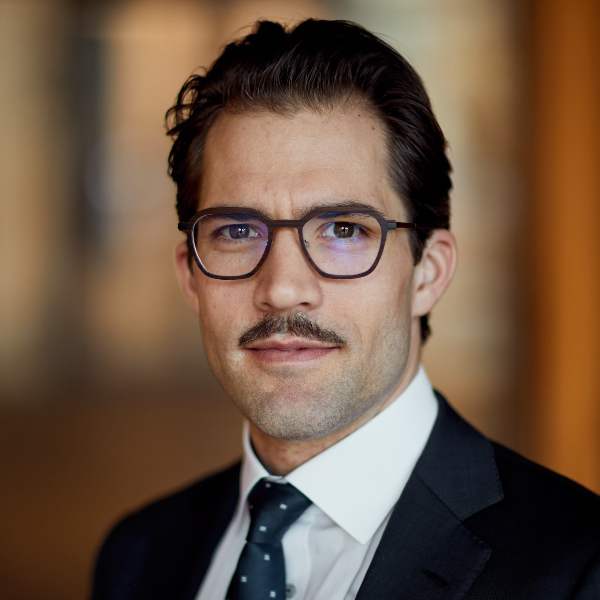
Martin Schmalz
University of Oxford and CEPR

Christoph Trebesch
Kiel University and CEPR
Central Banks’ Balance Sheet and the Macroeconomy, 1587-2020 by Moritz Schularik
Discussion by Eric Monnet
Central Bank Losses and Lending of Last Resort by Kris Mitchener
Discussion by Alexander Michaelides
Fiscal Dominance and Regulatory Forbearance by Viral Acharya
The Dark Side of Conservative Central Banks: A Model of Political Turnover and the Central Bank by Carolin Pflueger
Discussion by Dana Foarta
(In)dependent Central Banks by Sotirios Kokas
Discussion by Viral Acharya
The Coming Battle of Digital Currencies by Simon Mayer
Discussion by Jean-Charles Rochet
From the Weaponized Dollar to the Digital Dollar: The Challenge for Central Banks by Barry Eichengreen
The papers for the online conference can be downloaded here.
Date: Friday February 12, 2021
Venue: Rotterdam School of Management, Erasmus University (online)
The conference theme of the 2021 edition was dedicated to exploring the intersections between political economy and central banking.
Francesco Trebbi (Berkeley Haas) gave a keynote lecture on “Investing in Influence”.
12.20-12.30 – Opening
Enrico Perotti (University of Amsterdam & CEPR)
12.30-14.00 – Electoral Politics, Credit, and Regulation
Chair: Elena Carletti (Bocconi University & CEPR)
Electoral Cycles in Macroprudential Regulation
Presenter: Karsten Müller (Princeton University)
Discussant: Anne-Laure Delatte (Paris Dauphine University & CEPR)
Toxic Loans and the Rise of Populist Candidacies
Presenter: Emilie Sartre (CREST-ENSAE)
Discussant: Boris Vallée (Harvard Business School)
14.30-16.00 – Institutions, Reforms, and Politics
Chair: Martin Hellwig (Max Planck Institute & University of Bonn)
A Diverse Monetary Union
Presenter: Oscar Soons (University of Amsterdam)
Discussant: Roberto Perotti (Bocconi University & CEPR)
Complexity and the Reform Process
Presenter: Dana Foarta (Stanford Graduate School of Business & CEPR)
Discussant: Frederic Malherbe (University College London & CEPR)
16.30-17.30 – Keynote Lecture
Investing in Influence
Francesco Trebbi (University of California, Berkeley & CEPR)
18.00-19.30 – Governance and Central Banking
Chair: Paul Tucker (Harvard Kennedy School)
(Why) Do Central Banks Care about their Profits?
Presenter: Igor Goncharov (Lancaster University)
Discussant: Prachi Mishra (International Monetary Fund)
Fifty Shades of QE: Comparing Findings of Central Bankers and Academics
Presenter: Elisabeth Kempf (University of Chicago Booth School of Business & CEPR)
Discussant: José-Luis Peydró (Pompeu Fabra University & CEPR)
Francesco Trebbi is the Bernard T. Rocca Jr. Chair and Professor at the University of California, Berkeley Haas School of Business. He is also Research Associate at the National Bureau of Economic Research (NBER) and Research Fellow of the Centre for Economic Policy Research (CEPR). Before joining UC Berkeley, he was Canada Research Chair and Professor of Economics at the University of British Columbia Vancouver School of Economics and Assistant Professor of Economics at the University of Chicago Booth School of Business. He received his PhD in Economics from Harvard University.
Professor Eichengreen has held Guggenhim and Fulbright Fellowships and been a fellow of the Center for Advanced Study in the Behavioral Sciences (Palo Alto) and the Institute for Advanced Study (Berlin). From 2004 to 2020 he served as convener of the Bellagio Group of academics and officials. He is a regular monthly columnist for Project Syndicate.

Francesco Trebbi
University of California, Berkeley
His academic research focuses on Political Economy and Applied Microeconomics broadly defined. He has worked on political institutions and their design, elections and political campaigns, behavior in legislatures, campaign finance, lobbying, banking and regulation. He has also worked on topics related to the political economy of development, corruption, ethnic politics, and intra-state conflict. He has interests in Finance, Development Economics, and Macroeconomics. His primary teaching interests are in Political Economy, Applied Econometrics, Macroeconomics, and Data Science.

Dana Foarta
Stanford GSB and CEPR

Hans Gersbach
ETH Zurich and CEPR

Deniz Igan
International Monetary Fund and CEPR

Frederic Malherbe
University College London and CEPR

Kris James Mitchener
Santa Clara University and CEPR

Enrico Perotti
University of Amsterdam and CEPR

Alessandro Riboni
Ecole Polytechnique and CEPR

Martin Schmalz
University of Oxford and CEPR

Vikrant Vig
London Business School and CEPR

Paolo Volpin
City University of London and CEPR
Electoral Politics, Credit, and Regulation
Institutions, Reforms, and Politics
Keynote Lecture by Francesco Trebbi
Governance and Central Banking
The papers for the online conference can be downloaded here.
